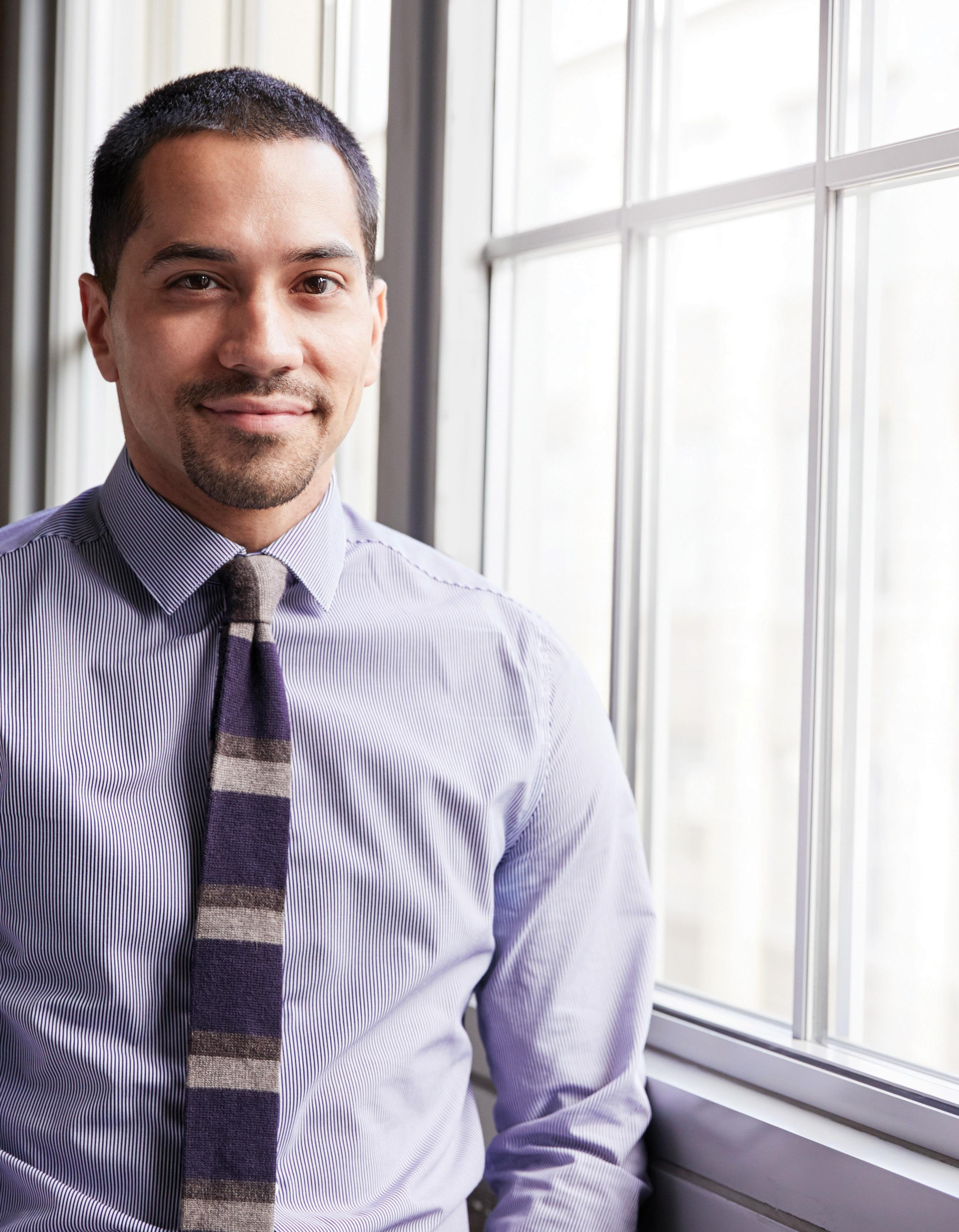JESSICA ALBA always finds strength in family—it’s what drives her success as a parent, businesswoman, and Hollywood star



JESSICA ALBA always finds strength in family—it’s what drives her success as a parent, businesswoman, and Hollywood star


featuring
JULISSA CALDERON
EVA DE LA ROSA
LYNDA LOPEZ
BETTY FRANCISCO
DIANNE MORALES
HORTENCIA BANUELOS
EMILIA LOPEZ
ISAURA GAETA
ENNA JIMENEZ
EVELYN MIRALLES
MÓNICA GIL
In a time unlike any other, these Latinas have stood out from the crowd. As innovators, visionaries, and community advocates, they show us what it means to lead. P78

Introducing: The Allies
For the first time ever, we are highlighting non-Latino executives in Hispanic Executive. The special section features those who have made a difference in the Latino community, whether through D&I initiatives at their company, direct mentorship of colleagues and students, or in their customer base.
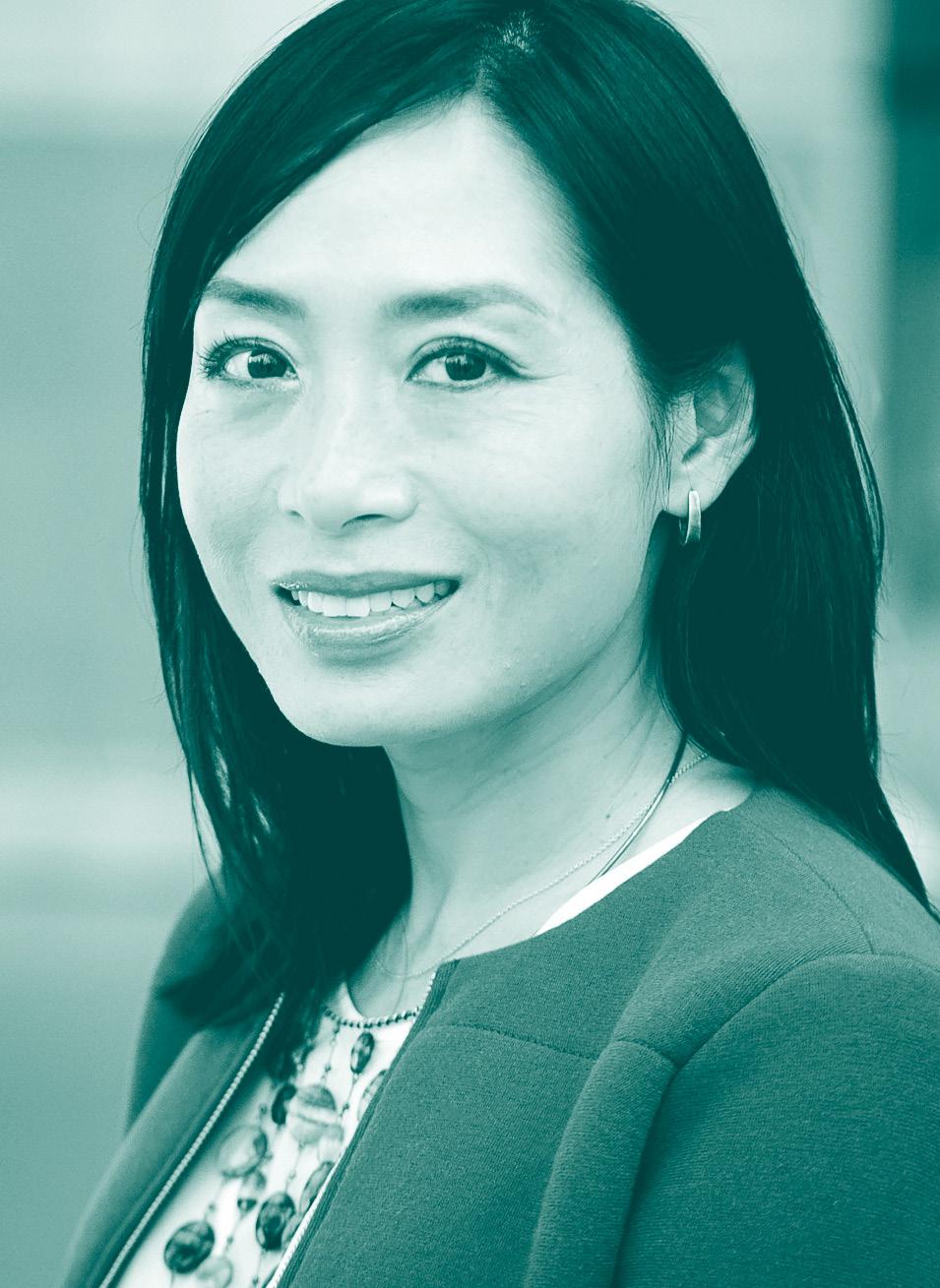
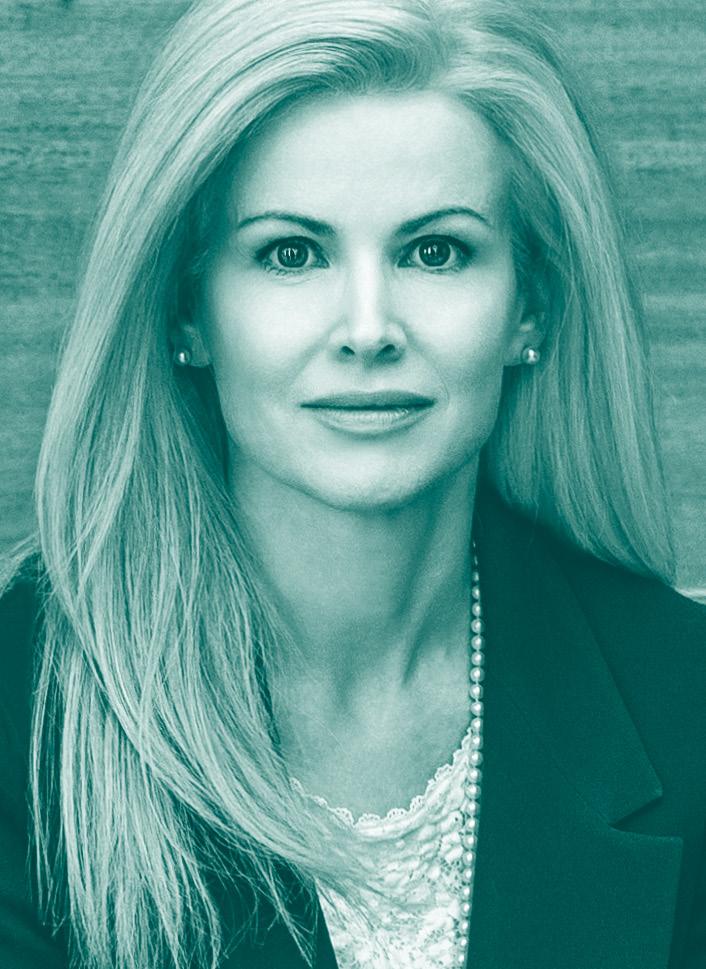
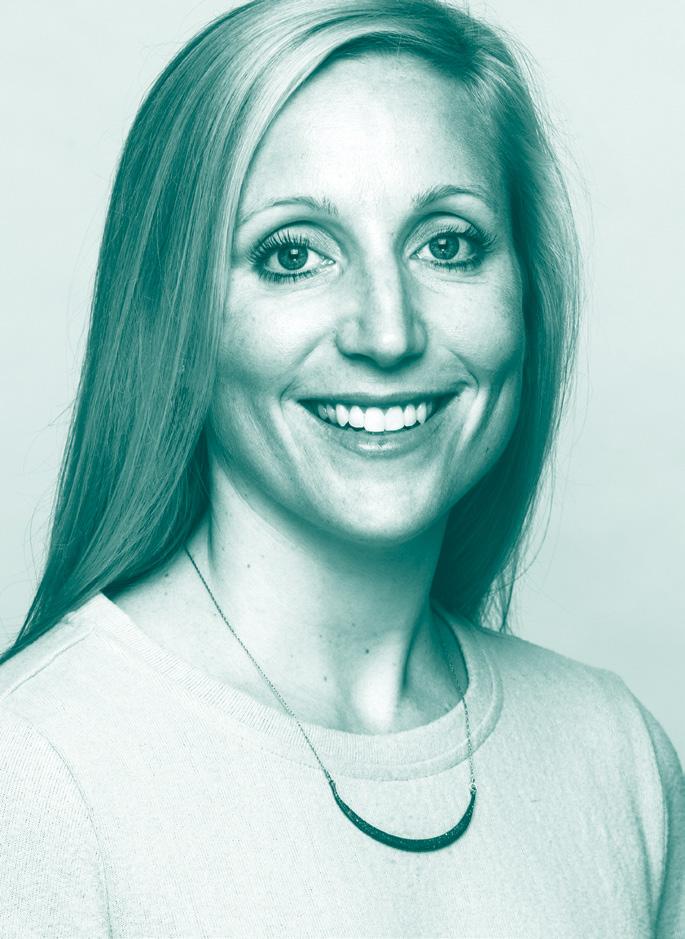
A POLICY OF INTENTION
Senior Vice President Pam Rosado leads with empathy, integrity, and authenticity at international insurance giant MetLife
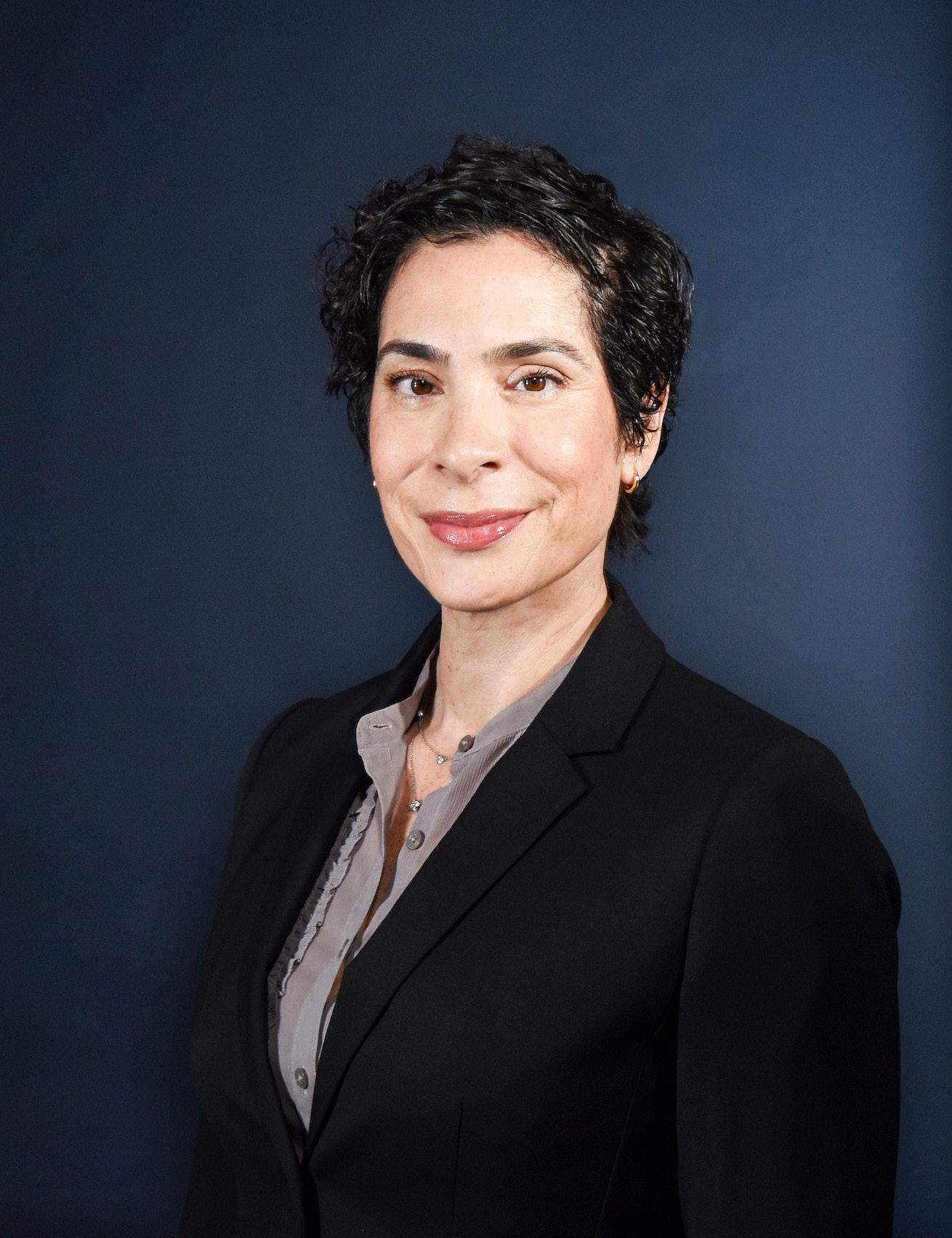
A MODEL FOR CHANGE
Monica Lopez Reinmiller spends her days promoting messages of social responsibility and advocacy—and at T-Mobile, she’s found a perfect partner for her efforts
A COMMUNITY STANDS TOGETHER
Associate General Counsel Alica Del Valle speaks to the strength and unity of Airbnb's global network of guests, hosts, employees, and partners
THE FUTURE STARTS NOW
Latinos are behind when it comes to saving for retirement. Kevin Morris and Carlos Navarro are changing that by helping them begin their journeys to economic security.
Living up to Las Vegas standards can be daunting. But MGM National Harbor's Alex Alvarado knows the secret to success: an unbeatable team.
UP FOR THE CHALLENGE
Michelle DeBella has already crafted her own role and built a team from scratch at Lyft, but that won’t stop her from pursuing the next challenge that comes her way
DON’T WAIT UNTIL YOU’RE READY
Laerte Moraes pushes young leaders to believe in themselves and open themselves up to new challenges— even and especially if they think they’re unprepared
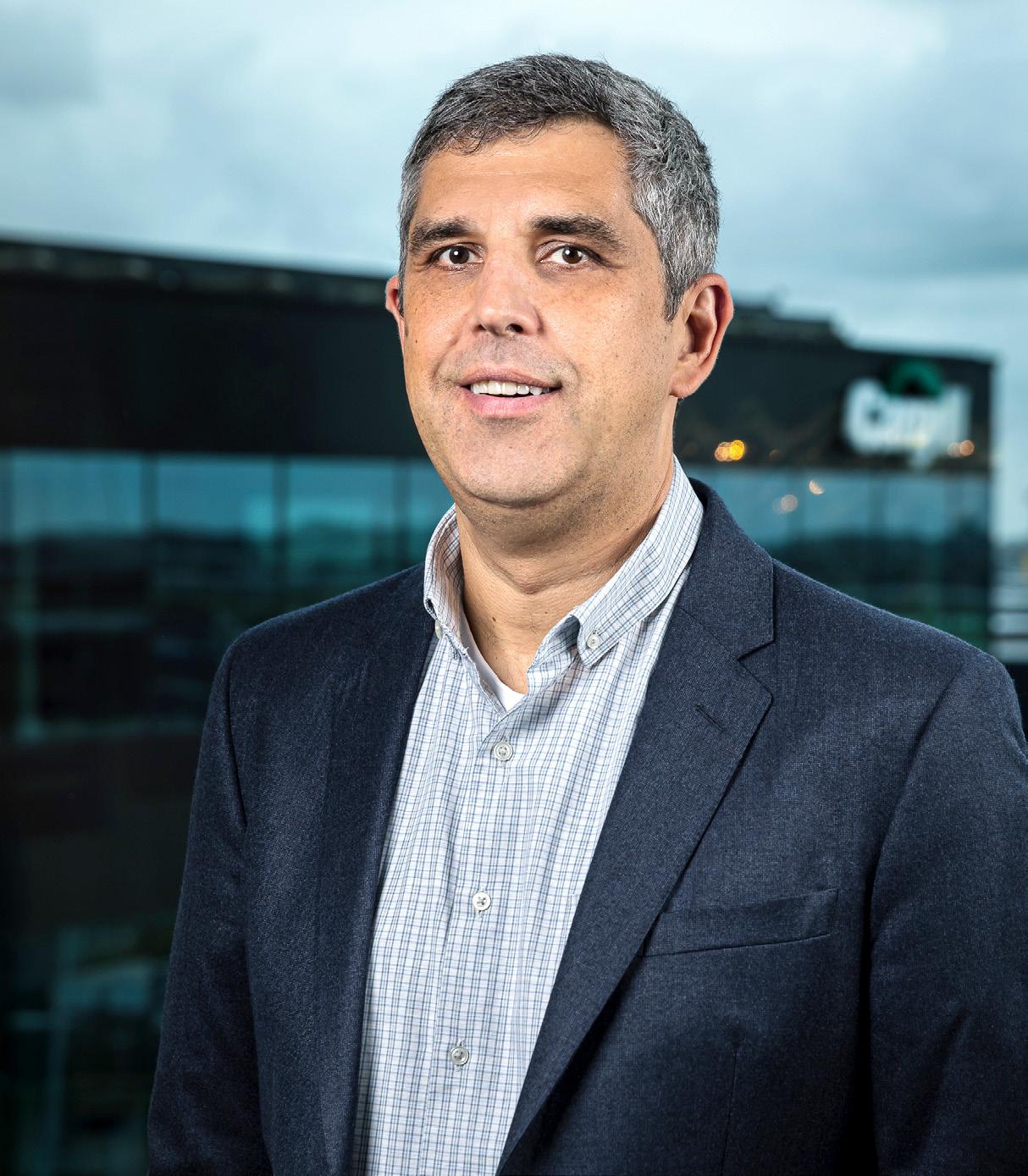
THE PAST TWELVE MONTHS HAVE BEEN, in many ways, a grand experiment. They’ve tested the resiliency of our communities, both as it pertains to our national citizenry and to our gente
As a result, we’ve been compelled to elevate our commonalities, to bridge our differences in the face of forces seeking to divide and conquer us. And while “divide and conquer” is such an obvious strategy —and such an obvious cliché—the fact remains that it’s also a maxim that was present throughout much of 2020 and into this year.
Pedro A. Guerrero CEO of Guerrero Media Publisher of Hispanic Executive
If last year’s presidential election taught us one thing, it’s that the Latino community is ripe for division. The issues that have become mainstream both in society at large and within corporate America are also clearly present within the Latino community. Every day, we grapple with matters focused on race, nationality, class, immigration, and gender—the entire spectrum of “Latino-ness.”
Our recent Identidad Issue touched on the very topic of our identity, exploring the complexities (and contradictions) of Latinidad. In many ways, it is those
complexities—the very nature of our Latinidad—that make our group both vibrant and susceptible to division.
For us to make traction on issues impacting the Latino community, we need to find as much common ground as possible, extending a hand to—or rather, locking arms with—others in our community with the same goals.
I’m not advocating for the historically elusive idea of political unity. But I do believe there is a level of commonality we need to reach as members of a greater Latino community—one that understands and accepts the aforementioned intricate nature of our identity—in order to have productive conversation that leads to productive action.
We must ally ourselves from within. As our cover star Jessica Alba (p.80) exhorts, “Why can’t our community wrap our arms around each other and lift each other up, the way other communities do for each other?”
But Latinos alone cannot effect the changes that are needed in the C-suite, in the boardroom, and at all levels of the workplace. Allyship must become a prominent part of the discussions we have both within our community and in the broader business
landscape. The decisions we make must ensure that allyship is not a buzzword but rather something that is truly sustainable, something that drives results and engenders sympathetic love for the success of other individuals and groups instead of envidia
That is why we are including, for the first time, non-Latino executives within the Hispanic Executive brand. The leaders included in this issue—Jennifer Mancuso (p.68), Jennifer Soliman (p.72), and Yau Cheng (p.75)—have spent years building bridges between the Latino community and other groups. They have fought for fair treatment and reasonable working conditions for Latinos living in Florida and Texas, changed their company’s approach to diversity and inclusion from within, and stood beside students and young professionals in need of a mentor.
We felt it important to include these examples of allyship alongside our 2021 Leading Latinas because of the commonalities shared with the inspirational Latinas featured here. Our Leading Latinas have not only benefitted from strong allyships but continued to forward that message in the work they do each day.
We see an embrace of allyship in Eva De La Rosa (p.92), who has risen to a global marketing role at Citi thanks to both Latino and non-Latino mentors and advocates.
We see it in Dianne Morales (p.106), who is fighting not just for the Latino community but for the entire city of New York.
And we see it in Betty Francisco (p.100), who grew up in public housing in that very city. Today, Francisco stands as an ally to all women and people of color, supporting low-income families of all backgrounds as general counsel at Compass Working Capital and advocating for both Black and Latino leadership on corporate boards.
The Leading Latinas and Allies featured in this issue have proven that results-driven allyship is not some far-off dream. It has been a part of their leadership philosophies and the workplace for years, even decades, and will continue to play a critical role in the success of both Latinos and members of other communities. Because while the scope of allyship will certainly change in the years to come, one truth remains constant: the impact we make working together, locked arm in arm with a vision in sight, is always much greater than when we work alone.
“Allyship must become a prominent part of the discussions we have both within our community and in the broader business landscape.”
Live-cast and streamed online for the first time ever, L’ATTITUDE 2020 showcased the economic impact of the Latino cohort as well as the contributions of that community to politics, business, science, media, and technology. As a proud media partner of L’ATTITUDE 2020, we have highlighted some of our favorite moments from the annual conference and celebration.
To kick off the conference, L’ATTITUDE Cofounder Sol Trujillo joined Ana Valdez (executive president of the Latino Donor Collaborative), Dr. Matthew Fienup (chief economist at the Center for Economic Research & Forecasting), Dr. David Hayes-Bautista (chief demographer at the Center for the Study of Latino Health and Culture), and Almar Latour (CEO of Dow Jones and publisher of the Wall Street Journal ) for a presentation of and discussion on the US Latino GDP report.
As Fienup summarized, this report reveals a Latino economic contribution that is “extraordinary in size and extraordinary in growth.” In 2018, he noted, the total economic contribution of self-identified Latinos was $2.6 trillion. On a global level, this translates to the eighth-largest GDP in the world.
But the Latino GDP is also fast growing—in fact, in the past year, Fienup pointed out, it was the single fastestgrowing GDP out of the ten largest GDPs in the world.
As the panelists explored the significance of and reasons for these findings, they emphasized the key role that the Latino GDP will play in the United States’ economic recovery.

“There’s an extraordinary story here about the strength and resilience of Latinos in the United States, and the extraordinary economic contribution that they make. [Because of them], we have a reason for hope in a really trying year,” Fineup offered.
In this data-driven report on the American economy, L’ATTITUDE Cofounder Sol Trujillo revealed that, even before the COVID-19 pandemic hit, the United States was not on track for economic success.
The stock market may have had high points in recent years, Trujillo acknowledged, but that is a misleading measure of the nation’s economic stability and success. Indeed, statistics show that the US GDP has fallen precipitously, the number of small businesses being created has stagnated, income inequality has increased, the labor force has diminished, and immigration (including the percentage of immigrants who are Latino) has declined.
On the other hand, both the Latino labor force and the Latino GDP are thriving and growing.
The United States is “impaired, not empowered,” Trujillo explained, and the restart and rebound of the economy depends on the nation’s willingness to catalyze and invest in the US Latino cohort.
L’ATTITUDE Cofounders Gary Acosta and Sol Trujillo, along with their new partner Emilio Estefan, outlined their aims for the conference as well as the Latino community.
Through L’ATTITUDE, Acosta, Trujillo, and Estefan hope that companies and business leaders alike will have opportunities to make important connections, find the capital they need to help power the US economy, identify corporate and board leaders, and learn about the true impact of the US Latino cohort.
Celebrity Special Appearance: Jessica Alba
Actor, entrepreneur, producer, social justice advocate, author, and “proud Latina” Jessica Alba (p.80) joined L’ATTITUDE to help celebrate the Latinx community.
As a business and entertainment leader as well as a member of the new mainstream economy, Alba urged the Latinx community to continue building on the profound contributions it makes to the nation every single day.
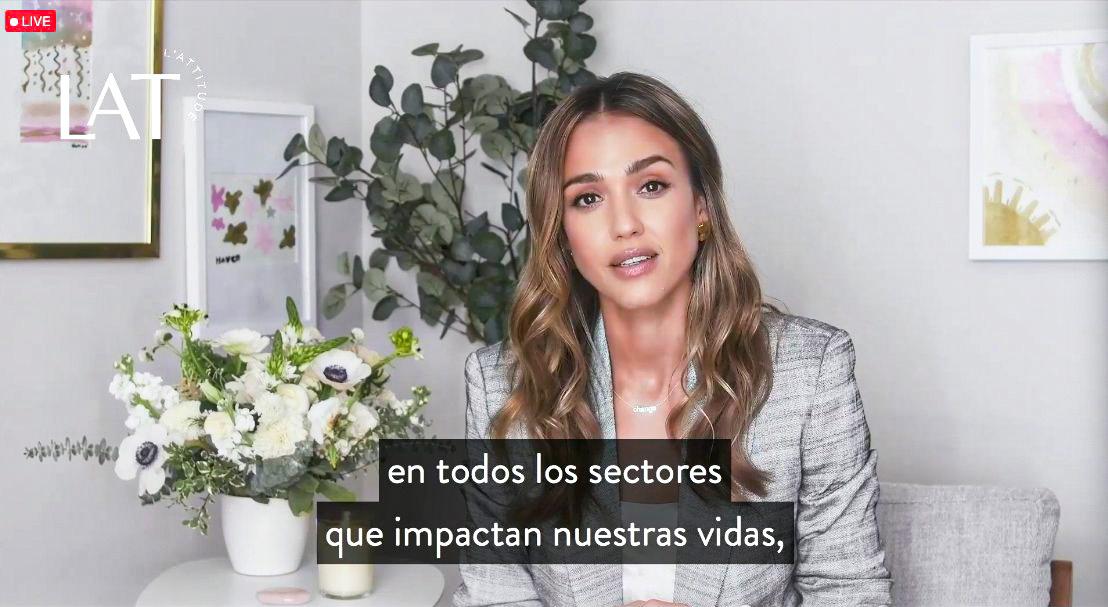
“It’s crucial to future generations that we lift up and support our community across all sectors that impact our lives,” Alba said. “I believe that if we all show up as a community and support one another, we can be the change we want to see for our kids and the world we hope to leave for them.”
In this session, ALPFA (Association of Latino Professionals for America) CEO Damian Rivera introduced the organization’s list of the most powerful Latinas in the nation.
Along with his cohost, two-time Emmy Awardwinning journalist Adriana Loya, Rivera detailed the impact and power of “triple threat” Latina leaders in the entertainment sector as well as Latina board directors, entrepreneurial icons, corporate trailblazers, corporate culture developers, healers, and technology visionaries.
These Latinas, Rivera noted, are uniquely qualified to lead us through 2020 and beyond. “They are changing the narrative on what is and can be. They exemplify what it means to take charge and be leaders in a whole new world, which is exactly what we need in these unprecedented times.”
A few of the Latina leaders recognized by ALPFA include Jessica Alba, Adela Cepeda (p.21), and Mónica Gil (p.134).
In October 2020, Facebook Watch launched a new talk show starring Gloria, Emily, and Lili Estefan. Modeled after Jada Pinkett-Smith’s show, Red Table Talk – The Estefans features candid conversations about family, love, sexuality, celebrity life, and more.

In this session, Toby Faulkner—head of unscripted original programs at Facebook Watch—interviewed Gloria, Emily, and Lili about their experiences on the show. The three women agreed that, while their show is undoubtedly a form of entertainment, it was also a way for them to learn about each other, talk, and heal.
“You can Google any of us, but none of what we talk about at Red Table are you going to find on Google,” Gloria said. “We were ready to be honest and to talk about things that we’ve never talked about in public.”
Masthead
Ruben Navarrette—a contributing writer at Hispanic Executive—is a syndicated columnist with the Washington Post Writers Group, author of A Darker Shade of Crimson: Odyssey of a Harvard Chicano, and founder/CEO of the Navarrette Sonic Podcast Network: What America Sounds Like. Read his interview series, Conversations at the Top, on p.80.
Director, Creative Production
Kevin Warwick
Managing Editor
Sara Deeter
Senior Editor
Frannie Sprouls
Editors
Melaina K. de la Cruz
KC Esper
Hana Yoo
Staff Writer
CEO & Publisher
Pedro A. Guerrero
Chief of Staff
Jaclyn Gaughan
President, Group Publisher
Kyle Evangelista
VP, Hispanic Division

Head of Audience & Engagement
Vianni Lubus
VP, Finance
Hispanic Executive® is a registered trademark of Guerrero, LLC

©2021 Guerrero, LLC. guerreromedia.com
770 N. Halsted, Unit 307 Chicago, IL 60642
Facebook: @hispanicexecutive
LinkedIn: @hispanic-executive
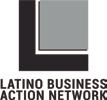
Twitter: @HispanicExecMag
Instagram: @hispanicexecmag
Reprints
Reprinting of articles is prohibited without permission of Guerrero, LLC. Printed in China. For reprint information, contact Reprints & Circulation Director Stacy Kraft at stacy@guerreromedia.com.
Billy Yost
Contributors
Zach Baliva
Cora Berg
Charles S. Donnavan
Peter Fabris
Will Grant
Natalie Kochanov
Keith Loria
Ana Mendez
Cristina Merrill
Roman Navarrette
Lior Phillips
Sara Verdi
Zayvelle Williamson
Clint Worthington
Designer
Elena Bragg
Photo Editors & Staff Photographers
Cass Davis
Gillian Fry
David Martinez
Director, Client Services
Cheyenne Eiswald
Senior Client Services Manager
Rebekah Pappas
Client Services Manager
Brooke Rigert
Director, Talent Acquisition
Elyse Schultz
Senior Talent Acquisition Manager
Haylee Himel
Director, Strategic Partnerships & Accounts
Krista Horbenko
Senior Events Manager
Jill Ortiz
Senior Director, Sales



Ben Julia
Director, Sales Training & Development
Alexa Johnson
Content & Advertising Managers
James Ainscough
Allyssa Bujdoso
Angel Camuy
Justin Davidson
Nicole Haas
Angela Reeves
Hispanic Executive is published quarterly by Guerrero, LLC. To subscribe, visit www.hispanicexecutive.com/subscribe. For editorial consideration, please email info@hispanicexecutive.com. By submitting a letter, you agree to let us use it, as well as your full name, city, and state, in our magazine and/or on our website. We may edit for clarity. Hispanic Executive, 770 N. Halsted Unit 307, Chicago, IL 60642, (312) 447-2370.
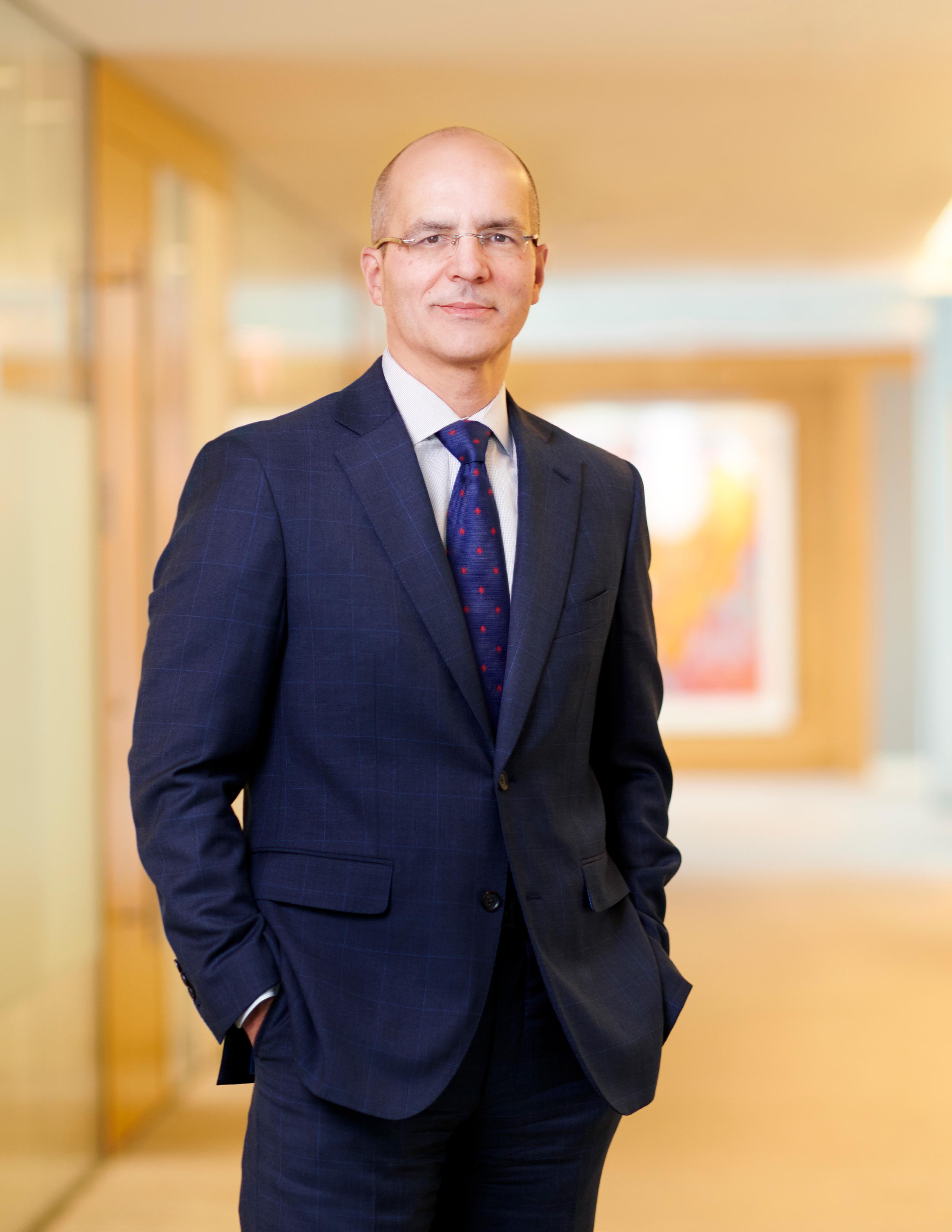
For Hector Gonzalez, his recent achievements at Dechert LLP pale slightly in comparison to his latest triumph: receiving a nomination for a US District Court judgeship
Gonzalez has flourished in his role as partner and has even stepped into a senior position as the chair of Dechert’s global litigation group. Nevertheless, it is clear that Gonzalez’s days in the public sector are anything but behind him.
On August 12, 2020, President Trump released his judicial nominations for select New York District Court vacancies. The president’s choice for New York’s Eastern District? None other than Gonzalez himself. Hardly surprising given the attorney’s record in the field, which includes commendations from the Legal 500 US, a Litigation Star award from Benchmark Litigation, and a place on the The Best Lawyers in America list.
As Gonzalez prepares for this incredible next potential step in his career, he looks back at the achievements that have helped position him for this nomination: his rise at Dechert, his passionate commitment to diversity and inclusion (D&I), and his induction as a fellow into the American College of Trial Lawyers, whose membership is composed of the best trial lawyers in the United States and Canada.
Could you talk about some of the professional maturation you feel has taken place since we last spoke in 2014?
The past five years have been exciting for me professionally, as I’ve taken much more
of a global leadership role within Dechert. I spent a number of years leading our diversity and inclusion initiatives, and I’ve had several stints on the policy committee, which is a small, internal management committee.
I’d say my move into managing Dechert’s entire litigation group has probably been the largest development. All these management roles give me a different perspective and view of both the firm and the legal industry. I’m making a difference for a lot of people beyond what I do for clients.
What has prioritizing D&I efforts looked like for you? Where do you feel like you’re making progress?
My priority is to recruit and retain talented diverse individuals. We’ve done a great job of that within the firm and the litigation group over the past few years, bringing in a number of partners and associates who have been successful here. We have done great work but still have a lot of work to do, as does the rest of the industry.
As you advance in your career journey, what continues to motivate you? What signposts let you know you’re on the right path?
It is pretty simple: the respect of my colleagues, great client relationships, and a happy family. I wake up every day still excited.
Could you talk about your fellowship with the American College of Trial Lawyers and how the experience has been valuable for you?
I was very honored to be selected as a fellow to the American College of Trial Lawyers. I’ve always had a great deal of respect for and learned a lot from those in the College I’ve worked with, or against, over the years. Although I’ve not been a fellow for long, I’ve enjoyed the national conference and the ability to be among great and passionate legal minds. Being a part of a community like this really inspires one to strive for excellence.
Editor’s Note: At the time of publication, Gonzalez’s nomination to the US District Court for the Eastern District of New York was awaiting confirmation.
“Being a part of a community like this really inspires one to strive for excellence.”
When Hispanic Executive last spoke with Hector Gonzalez in 2014, the attorney reflected on the decade he spent in the US District Attorney’s office in Manhattan (eventually serving as the head of the narcotics unit) and his transition into private practice as a litigation partner at Dechert LLP.
At the core of Dechert’s culture is a dedication to seeking and nurturing diverse viewpoints and experiences to develop the highest caliber of talent, leadership and service for our clients.
Dechert partner Hector Gonzalez, chair of the firm’s global litigation practice and a member of the firm’s Policy Committee, embodies this commitment. dechert.com

PAM ROSADO’S CAREER JOURNEY HAS BEEN marked by multiple twists and turns, but Rosado—a senior vice president as well as the chief counsel for litigation and special investigations at MetLife—wouldn’t have it any other way. “To me, those turns are representative of both learning and fulfillment,” she says.
One of Rosado’s earliest turning points occurred in college, which she entered with aspirations of becoming a doctor. “Growing up, I never thought about being a lawyer. I wanted to be a doctor, and that was true until my junior year of college,” she recalls. But when Rosado enrolled in organic chemistry, her plans changed. “Up until I took organic chemistry, I thought I was very much a math and science person,” she says with a laugh. “But that class took me off the science track for good.”
With a budding interest in community service and more time to invest in that interest, Rosado joined her university’s student government. In her junior year, she cofounded her university’s Habitat for Humanity
In addition to her responsibilities leading MetLife’s litigation and special investigations team, Pam Rosado serves on the law department’s pro bono committee.
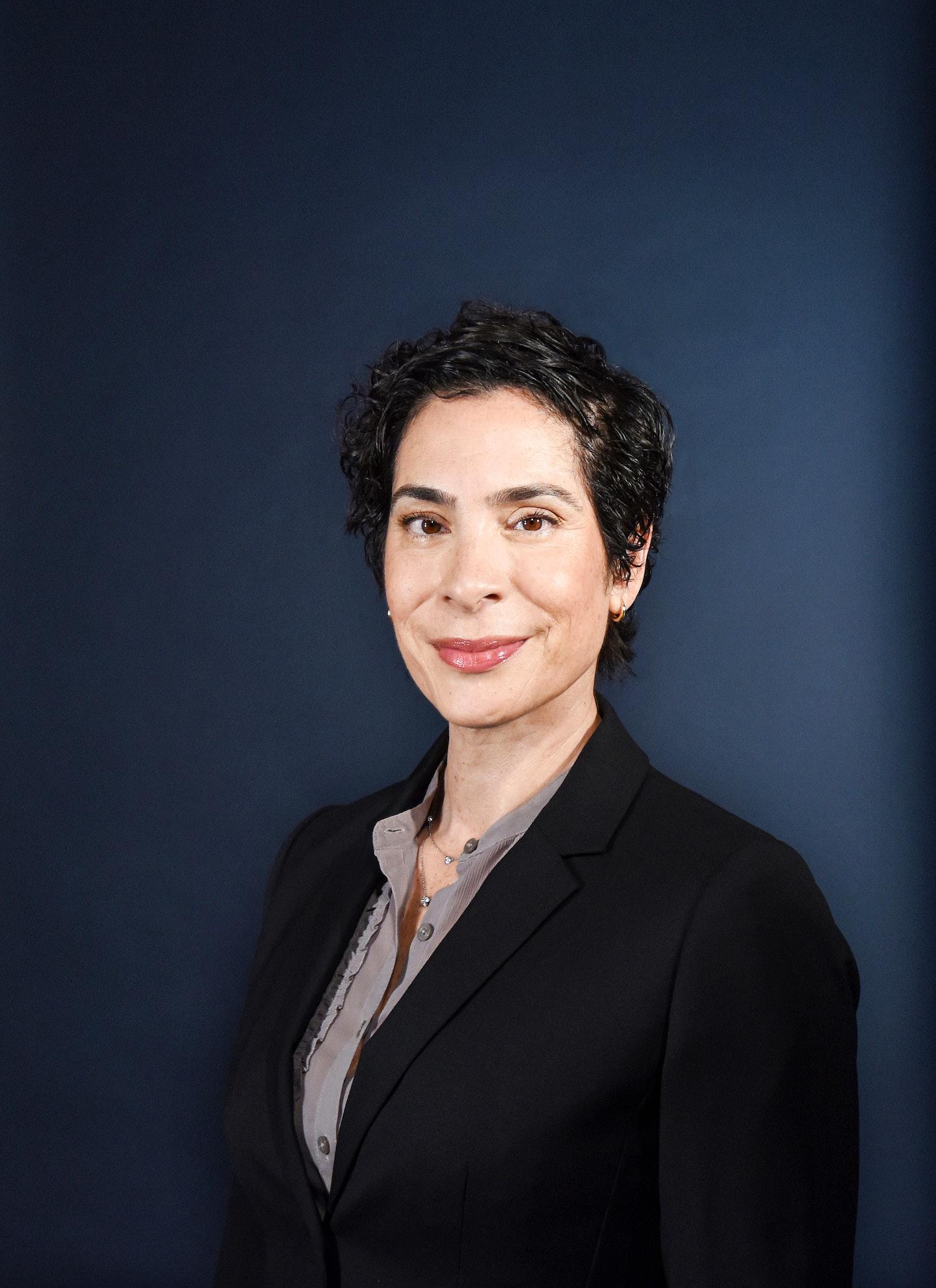
Recently, Rosado and the committee partnered with the Equal Justice Initiative and Sidley Austin to provide legal research in support of requests for new trials in two capital cases where criminal defendants had been sentenced to death. She also assisted in the Safe Passage Project, where volunteers provided translation services to children who had entered the US seeking asylum.
“For me, one of the most gratifying things to see is that the COVID-19 pandemic did not slow our pro bono efforts one bit,” Rosado says proudly. “If anything, there has been a resurgence in engagement.”
Sidley joins in congratulating Pamela Rosado, Senior Vice President & Chief Counsel, Litigation and Special Investigations at MetLife, on the well-deserved recognition of her extraordinary talent, leadership, and achievements in Hispanic Executive.

“My commitment to my team and business partners is to be honest, even when my message is difficult to hear or I don’t know all of the answers.”
program and served as the president of the Latin American Students Association. During her senior year, Rosado served as the president of the United Minorities Council, an organization encompassing all of the diverse student government groups on campus.
“Those experiences really crystallized, for me, the importance and the power of community service,” the SVP reflects. “It also sharpened my focus on racial disparities and injustices. Ultimately, it caused me to think about how I could have the most impact moving forward.” Rosado quickly pivoted from dreams of medical school to enrolling in law school.
After graduating from the University of Pennsylvania Carey Law School, Rosado took a position as an employment lawyer for AXA Equitable, where she spent the next fifteen years of her career. While at AXA, Rosado was placed on two different expat assignments—the first, a nine-month assignment in Mexico where she served as the head of litigation, and the second, a two-year general counsel position in Madrid. “Both of those experiences arose by and large because of my ability to work effectively in both English and Spanish,” she explains. Rosado is a first-generation Colombian American, and she believes that embracing all parts of her identity—language, cultural origins, thoughts, and experiences—is what informs her actions as both a lawyer and a leader.
Now, as senior vice president and chief counsel at global insurance provider MetLife, Rosado strives to embrace all facets of her diverse experiences and heritage, as well as those of her team. “My goal as a senior leader is to make sure that we have a diverse organization in all of its forms, and to ensure that I am helping to create and maintain a welcoming environment where people can share their thoughts, ideas, and goals,” she says.
To foster that type of environment, Rosado strives to embody three key qualities she believes are critical to effective leadership: empathy, integrity, and authenticity. “To me, empathy goes beyond understanding or sharing the feelings of others. To really have empathy, you have to listen,” she points out.
According to Rosado, when leaders listen to understand rather than to respond, they can appreciate a fuller breadth of the challenges that their business partners or team members are facing. From there, she explains, it is possible to build out strategies to eliminate any obstacles that may stand in a business partner or team member’s way.
But empathy alone doesn’t drive success. “The basis of every good relationship—business or personal—is integrity,” Rosado emphasizes.

“
“My commitment to my team and business partners is to be honest, even when my message is difficult to hear or I don’t know all of the answers.
“Authenticity, and showing up as one’s true self, is related to integrity,” she adds. “I really believe that we are all wonderfully unique and have something valuable to contribute.” She attributes the successes of her team to the fact that people feel comfortable bringing all aspects of their personality to work. Those aspects inform each individual’s unique perspective when brainstorming solutions or problemsolving. “When I think about MetLife in particular and how we serve more than forty countries around the world, I have to also think about how we can be effective in serving that breadth of customers. We really do need to leverage the diversity of employees within the orgranization,” Rosado says.
In addition to creating an inclusive environment for her team members, Rosado is dedicated to helping her team attain their personal and professional goals—in any way possible. As she explains, she herself has benefited from past managers and mentors who made her professional development a priority.
“I view my career successes as my former managers’ successes, and that is the spirit in which I approach my team,” the SVP says. “I view it as my responsibility to pay my experiences forward, and I am committed to helping my team members reach their goals regardless of where they are in their careers.”
Maynard
celebrates our friend and client, Pam Rosado, for her forward thinking and relentless drive as MetLife’s senior vice president and chief counsel for itigation and special investigations. We look forward to partnering with Pam and her team as we continue the firm’s thirty-year relationship with MetLife.” –Ted Holt, Chair of Maynard’s Insurance Practice“Empathy goes beyond understanding or sharing the feelings of others. To really have empathy, you have to listen.”representation is made that the quality of legal services to be performed is greater than the quality of legal services performed by other lawyers.
300+ lawyers and 11 offices coast to coast, Maynard advocates for diversity and inclusion in everything we do.Congratulations to Pam Rosado, MetLife’s Senior VP and Chief Counsel-Litigation & Special Investigations, on this honor and her accomplishments.
Investors is helping Latino entrepreneurs find capital, access key information, and make critical connections
ANGELES INVESTORS IS YOUNG—THE
nonprofit has barely been around a year. But during the organization’s third pitch night, investment indications for the five groups vying for funding reached nearly $500,000. Angeles’ mission, front and center on their website, is “to find, fund, and grow the most promising Hispanic and Latinx ventures.” With this level of exponential growth and investment, it would seem that the nonprofit is well on its way to fulfilling that mission.
Angeles Investors Chair Adela Cepeda and President Marcelo De Santis have come to the fledgling group from very different worlds. Cepeda is a forty-year veteran of capital markets and corporate finance. She has served as director of several mutual funds as well as BMO Financial Corp., whose
corporate parent is one of the largest banks in the world. De Santis is at home in the world of tech and has twenty-five years of experience as a global executive and digital transformation leader for companies such as Kraft Foods, Mondelēz, Pirelli, and ThoughtWorks Inc.
The two leaders spoke with Hispanic Executive about what makes Angeles Investors, whose board is supported by centuries of expertise, collectively, so different from every other angel investor group.
De Santis says it took time to figure out exactly how he could be of service to the Latino community. “In the last ten years, I’ve been very close to the innovation ecosystem while collaborating with early-stage start-ups
on accelerating innovation in large organizations,” the president explains. “As I got close to that ecosystem, I started to notice that almost none of these start-ups were Latinx. None of the founders looked like me.”
De Santis created a small, nonprofit incubator but soon realized he was solving for the wrong equation. “As I started to connect with more people, I came to understand that the gap wasn’t a lack of Latinx founders. You can eventually find them. The real gap was that, once you found them, there was not enough financial support for them to grow their companies.”
Cepeda saw the same problem, from her own vantage point. “It has always been patently clear to me that there is a dearth of capital reaching Latino entrepreneurs,” she says. “Our big hurdle to scaling our businesses is access to capital. I wanted to jump in and try to open doors and provide that capital.”
Angeles Investors has grown quickly in a very short period of time, and De Santis believes there is a multi-pronged personal investment from those looking to contribute. “We have gotten two kinds of feedback from our members,” he says. “From the people who have invested before, they are excited to help fund Latinx entrepreneurs and contribute their knowledge and connections to help build this organization.
“The second group is people who are investing for the first time,” De Santis continues. “They’re excited to be joining an organization with a Latinx background and to learn along with their community about how early-stage investing works. They’re looking at their membership fee as an investment in their education.” Both groups, the president emphasizes, are growing the organization’s mission in organic and essential ways.

Marcelo De Santis President Angeles Investors
“The real gap was that, once you found [Latinx founders], there was not enough financial support for them to grow their companies.”
—MARCELO DE SANTIS
Who exactly is Angeles Investors looking to support? Cepeda has strong thoughts on the issue. “We believe that to be an effective disruptor, the play is most likely going to be a digital one,” the chair says. “So we’re very tech-focused, and that has proven to be an incredible niche for us.” As Cepeda points out, if companies weren’t cognizant of how imperative digital strategy is prior to 2020, the COVID-19 pandemic has made it immediately apparent that it’s the only smart way to move forward.
Cepeda hopes that Angeles can become the first consideration for the start-ups it’s looking to support. “I hope that Latino entrepreneurs will consider us an essential stop in their pursuit of capital and early capital,” she explains. “Whether we invest

in them or not, I hope that we will be able to help them expand their network and connect them to other venture capital angel investors. [Angeles Investors] is more than funding: it’s about access to the network and the information to help entrepreneurs.”
Eventually, Angeles Investors may even grow to become more than a nonprofit, says De Santis. “If you fast-forward three or four years, I would love Angeles to become a fund in its own right,” he says. “Angel investing will always have a part of this, but as we see the portfolio growing and we see the confidence of the Latinx community to invest in the asset class growing, I would love to see this become a fund.”
Even in the short term, there is a lot coming up ahead for the organization— especially if Angeles is able to continue with
the growth it’s seen in the past year. “We have gone from $10,000 checks to hundreds of thousands of dollars in investment,” De Santis says. “The organization has evolved very fast, so our obvious focus right now is growing our members and our sponsors so we can grow the impact of our mission.”
However the organization may change in future, its mission will stay largely the same. And that mission is perhaps summed up best by Cepeda, who, by helping to grow the prospects of Latino-founded companies, is helping create a more equitable future for her family. “As I look at my three daughters, who are all scaling the business and tech world right now, I want to be able to help young people reach their goals sooner,” she says, “and with fewer hurdles along the way.”
“I want to be able to help young people reach their goals sooner and with fewer hurdles along the way.”
—ADELA CEPEDA
Woodforest National Bank SVP Daniel Galindo on his determination to ensure the communities he serves continue to grow and prosper together
DANIEL GALINDO IMMIGRATED FROM Mexico to Texas when he was nine years old. As he grew up and began carving a path for himself in the financial industry, he struggled to find mentorship and support from professionals with a background similar to his.
“I developed a network of mentors during my early education, but once I went to college, it was hard to find people from my culture or people who had a vested interest in and vision for my career goals,” he shares. “I had to rely on mentors from my past—my high school teachers and others in my hometown.”
After years of professional networking and career development, Galindo has developed a group of mentors and peers who continue to provide guidance. At Woodforest National Bank, he found a group of executive leaders and mentors who have helped shape and guide him into his current senior role. Because of his experiences, Galindo is very focused on activating mentorship and developing mentorship networks—as well as entrepreneurship, access to capital, affordable housing, financial inclusion, and ensuring communities have the resources they need to thrive.
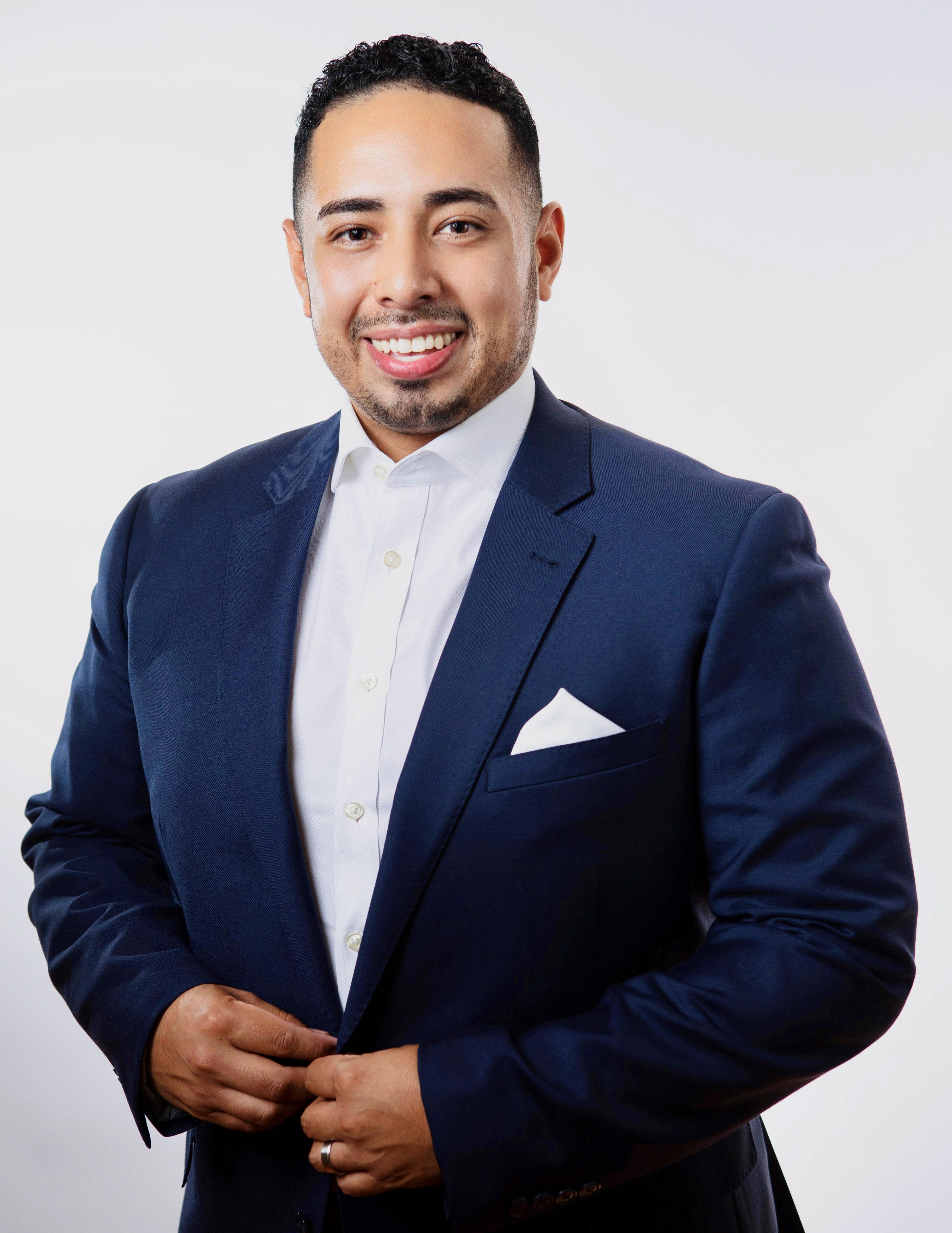
Galindo worked as a bank teller while attending college and quickly progressed into roles as a personal banker, mortgage lender, and international mortgage lender. In 2007, when the financial markets crashed, Galindo was doing multimillion-dollar lending for a local bank in San Antonio.
“We had several wealthy Mexican nationals coming into Texas at that time who were buying second homes,” he recalls. “It was easier for me to do a mortgage loan at that time for a foreign national than it was to help someone trying to finance their first home for $70,000.”
It was then Galindo started to develop a passion for affordable housing policy. He decided to work for a community development financial institution (CDFI) dedicated to helping first-time owners achieve home ownership by providing them with education, helping with the down payment, and often by providing the first lien mortgage.
But Galindo wanted to do even more. He wanted to learn more about policy and issues impacting communities, which led him to a national position with the National Council of La Raza (now known as UnidosUS). This position gave him an in-depth understanding of the systemic issues facing Hispanic Americans and other low- and moderate-income households.
“This position enabled me to work with more than one hundred community development organizations and help them in their strategic efforts to be responsive to the needs of their communities,” Galindo says. “I really wanted to be ingrained in the community and help those who were less fortunate by implementing forward-thinking strategies and creating opportunities. I was very proud of the work I did, and it was a solid foundation for the work I now do at Woodforest.”
Today, as senior vice president and director of community development and strategy for Woodforest National Bank, Galindo continues in his mission.
“[Woodforest] was looking to increase its community reinvestment involvement,” says Galindo, a long-time San Antonio resident. “I was hired as the local community development manager for the San Antonio market and moved quickly to a national director role to help create and oversee award-winning initiatives to help the bank achieve its goals.
“I’ve always been very passionate about serving communities, understanding their needs, and helping the people who need it the most,” the SVP adds. “My goal is to work to create a bridge between Wall Street and Main Street, creating private-public partnerships that yield financial returns while advancing solutions and creating opportunities for communities.”
In his current role, one of Galindo’s duties is to oversee the company’s lending and investment portfolios for community and economic development. A large part of this investment pool is geared toward ensuring small businesses have access to capital as well as trusted guidance from CDFIs, minority deposit institutions (MDIs), small business investment companies (SBICs), private equity funds, and microlending funds.
“I’ve always been very passionate about serving communities, understanding their needs, and helping the people who need it the most.”
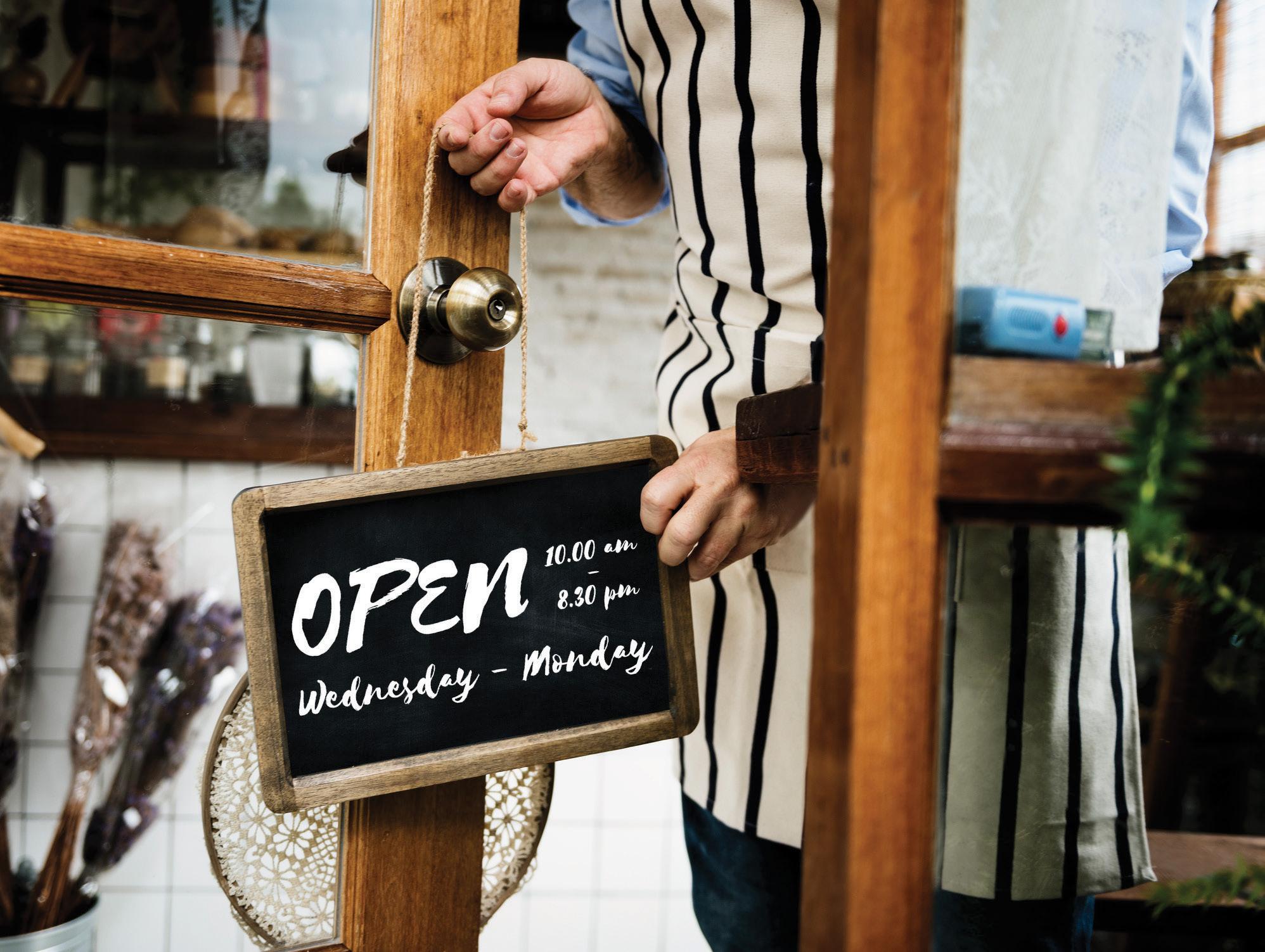
Small Business Community Capital is an SBIC Impact Fund Investing in Small and Lower-Middle Market Businesses in the United States.
Partnering with entrepreneurs to provide:
• Up to $14 million in flexible capital, can lead larger investments with co-investors.
• Access to corporate clients
• 100+ years of collective investment experience


To learn more, visit us at www.sbccfund.com
“Through these vehicles, Woodforest is able to invest capital so these institutions can in turn invest in small- and middle-market businesses and start-ups,” Galindo remarks, “which are often minority- and woman-owned firms that oftentimes do not qualify for traditional bank financing or are looking to scale their business.”
As SVP and director, Galindo has helped the bank achieve an outstanding Community Reinvestment Act rating—the highest rating given to financial institutions by their regulator. Galindo attributes this success to his executive mentor, to having a devoted and coachable team of bankers with a shared passion for community, and ultimately to the overall culture of the bank, which focuses on compassion and doing the right thing for its communities.
But as Galindo knows, access to capital is not the only issue facing communities and small businesses. That is exactly why Woodforest National Bank established initiatives like the Woodforest Foundry, recipient of the Consumer Bankers Association’s 2019 Joe Belew Award. The Woodforest Foundry is facilitated by entrepreneurs, for entrepreneurs: it allows entrepreneurs to act as mentors and activate local entrepreneurial ecosystems, which revitalizes underserved communities and helps grow businesses.
Through the Woodforest Foundry, entrepreneurs find a community of mentors and receive trusted guidance from their peers, Woodforest bankers, and community partners. Galindo was responsible for the development and implementation of the first Woodforest Foundry prototype in San Antonio. Given its success, the program is now in the expansion stage, and the bank is implementing Woodforest Foundry across its seventeen-state footprint.
As a prominent member in his community, Galindo also feels a personal responsibility to help and inspire others. He travels to high schools in his old school district— one of the most impoverished in San Antonio—and talks about his past, how he relied on teachers for guidance, and how every barrier he faced just added to his determination to succeed.
“It’s really important for me to share my personal story of resilience with students who may also be struggling with finding a mentor to guide them,” Galindo says. “It has been really impactful to share my experiences and be a mentor for others.”
Within Woodforest, Galindo also strives to provide guidance and mentorship for other Hispanic American bankers looking to advance their careers. “I know there’s an opportunity for banks to capture the Hispanic American trillion-dollar market in the coming years,” says Galindo, who was recently recognized as one of the San Antonio Business Journal’s 40 Under 40, “but in order to do that, we have to find and develop bankers and individuals who can relate to our culture and community.”
A proud husband and father to three daughters, Galindo is currently pursuing an executive MBA in banking and financial institutions as part of his ongoing development at Woodforest.
SBCC appreciates the partnership of Woodforest and Daniel Gallindo as we serve more small and lowermiddle market entrepreneurs with capital and strategic resources. Daniel is a thought leader in building financial architecture for minority communities, and we are proud to work with him to pursue societal transformation through entrepreneurial success.SBCC congratulates Daniel Galindo on this recognition of his leadership in the Hispanic Business community.
Arleska Castillo, head of HR for the Muscogee County School District, revamps how her department serves a diverse constituency
TO ARLESKA CASTILLO, THE MOST important part of her title as chief human resources officer for Georgia’s Muscogee County School District is the word “human.”
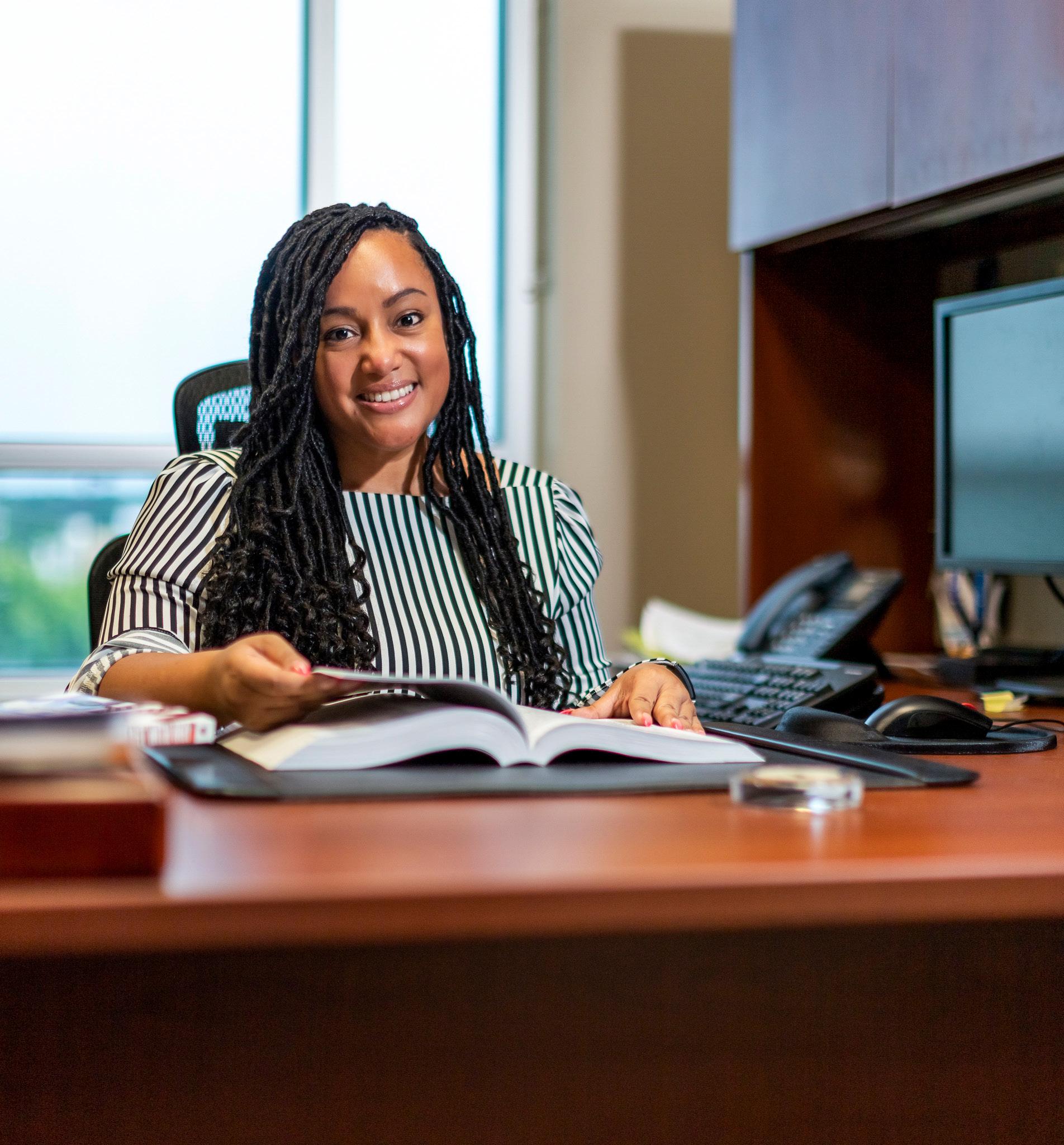
It is by caring for and respecting each other, she explains, that we not only bring out the best in an organization but also drive lasting change. As CHRO, Castillo has made a point of embracing staff and students alike as stakeholders in the district community, enacting policies that encourage everyone to raise their true and authentic voices.
Since taking on the role as CHRO in September 2019, Castillo has focused on establishing collaborative ways to engage stakeholder groups—collaboration that has become even more necessary during COVID19. She has partnered with several stakeholder groups to launch surveys and host focus groups capturing student, parent, and employee voices. These efforts will “allow the trust factor to grow” and give students a much-needed platform to voice their concerns. As Castillo points out, “You can’t develop policies without talking to students so that they can discuss their needs.”
Castillo also plans to establish a diversity and inclusion council that will create ongoing engagement between employees, students, and district leaders. “We continue to witness the current racial climate across the world,” she notes, “and as leaders, we need to create platforms that enable brave spaces for dialogue and reflection.”
All this, Castillo stresses, is critical to fostering a climate of diversity that is truly inclusive. “You do not develop diversity, because that can happen organically,” she explains. “My focus would be to develop inclusivity, which allows organizations to develop and implement programming and policies that serve in connection to their mission and their communities.”
Castillo plans, through the diversity and inclusion council, to provide opportunities for employees and students to practice and demonstrate leadership skills by contributing to the development and implementation of the council’s programming and events. Additionally, the council will encourage both employees and students to speak openly about matters that affect them, including microaggressions and implicit biases, by developing their public speaking skills, the CHRO explains.
“This will take careful planning, but it can be successful,” Castillo says. “This is something students should learn about, especially as they venture to new opportunities, such as college. It will give them the necessary tools to engage in healthy, facilitated spaces for dialogue—which will help them in their careers and throughout their lives.”

Castillo’s commitment to building a new generation of empowered young leaders stems from experiences in her youth. The daughter of an Afro-Latina from Venezuela, Castillo grew up in Jersey City, New Jersey, where her mother settled after emigrating from South America when Castillo was just two years old.
As Castillo explains, her mother speaks English, but it is not her native language—
and she often faced discrimination as a result. “She has an accent, which in some spaces was considered a flaw,” Castillo recalls. “But she speaks three languages fluently, which should be celebrated. I didn’t understand why a person should be mocked for that.
“My mother is resilient— y yo estoy bien orgullosa de ella,” she continues. “We were not rich, but I never felt poor.” To be sure, her mother’s unwavering support and constant encouragement have always been sources of great strength for Castillo. In 2019, it helped give her the courage to leave New Jersey, her circle of family and friends, and her post as director of human resources for Rutgers University–Newark and move to Muscogee to take up her current role.
The move, according to Castillo, has afforded her wider insight into the educational system—which was part of the reason she was attracted to the CHRO position to begin with. “I wanted to see what happens educationally to students before college,” she explains.
The Muscogee County School District employs about 5,500 people from a wide range of ethnic and demographic backgrounds, who collectively support more than fifty elementary, middle, and high schools. Castillo relishes the challenge set by the superintendent to “rebrand the way human resources is viewed in the district.” In fact, in her first few months, she revamped the district’s orientation process to adapt to the COVID-19 pandemic, which surfaced just a few months into her tenure.
The previous in-person orientation process took a full day, whereas the new process consists of shorter, prerecorded modules that can be completed over thirty days. It enables new employees to absorb the necessary information in manageable pieces at a pace of their choosing.
But Castillo hasn’t stopped there. She has established a digital platform that allows administrators and employees to set up virtual
conferences, where they can discuss a variety of topics, including strengthened mental health and wellness services for employees, professional development, and the proposal of a new telecommute policy designed to improve work/life balance for district employees. “We want to ensure that people can telecommute for medical and nonmedical purposes,” Castillo says, adding that she hopes the policy will serve employees even after the pandemic abates.
In the course of working on all of these initiatives, including the district’s new diversity and inclusion programs, Castillo has made a point of inviting a broad swath of stakeholders to the table. In addition to other HR
personnel, she has collaborated with teachers, administrators, IT specialists, and representatives from student services.
Castillo encourages all project collaborators to speak their minds—and fosters an environment in which they feel welcome to do so. “If you are the only person speaking on a topic, it can be difficult,” she points out. “You have to be comfortable being uncomfortable.”
Castillo knows better than many the value of embracing the uncomfortable—whether that means moving to a different country to start anew or moving to a different state to take on a new career challenge. It is in her blood, and it is what spurs her to serve as a change agent no matter what comes her way.
“If you are the only person speaking on a topic, it can be difficult. You have to be comfortable being uncomfortable.”
JUST A FEW HOURS BEFORE SPEAKING with Hispanic Executive, Adriel Lares moderated a private interview with Carlos Gomez, treasurer at the Walt Disney Company. Lares and Gomez had become close during Lares’s two-year stint as a treasury analyst at Disney—and, early on in their friendship, the two realized that they shared a mentor in the late Anna Marie Zarate Porras.
The senior associate director of development at Stanford University for nearly twentyfive years, Porras was passionate about reaching out to and helping Latino students such as Lares and Gomez.
In 2015, when Porras was in the final stages of her battle with breast cancer, Lares presented his mentor with one of only three
three-liter bottles of his wine company’s very first vintage, an original 2010 Memento Mori. He had saved the wine for the rarest of occasions, and this occasion was certainly one of those. “It was the last big dinner with all of her family and friends,” Lares remembers. “This incredibly successful woman who had been such a great mentor to us and opened our eyes to who we could be and what we could do . . . it meant so much that I could play this small part in her celebration.”
All of this is to say that Lares believes in relationships. He believes in mentorship. And—as is demonstrated on a daily basis by his actions as Fastly’s CFO—he believes that the best-lived life is one spent in service of others.
Fastly CFO Adriel Lares has dedicated his life to mentoring others and fostering the kinds of opportunities that have helped get him where he is today
Lares grew up in Texas. His family immigrated there from Mexico and, years later, Lares would become the first in his family to attend a four-year college—at Stanford, no less. “I had a counselor who believed in me,” Lares recalls of his high school years. “And all along this journey, it’s become very apparent to me that there are just some opportunities you can’t take advantage of without help from others.”
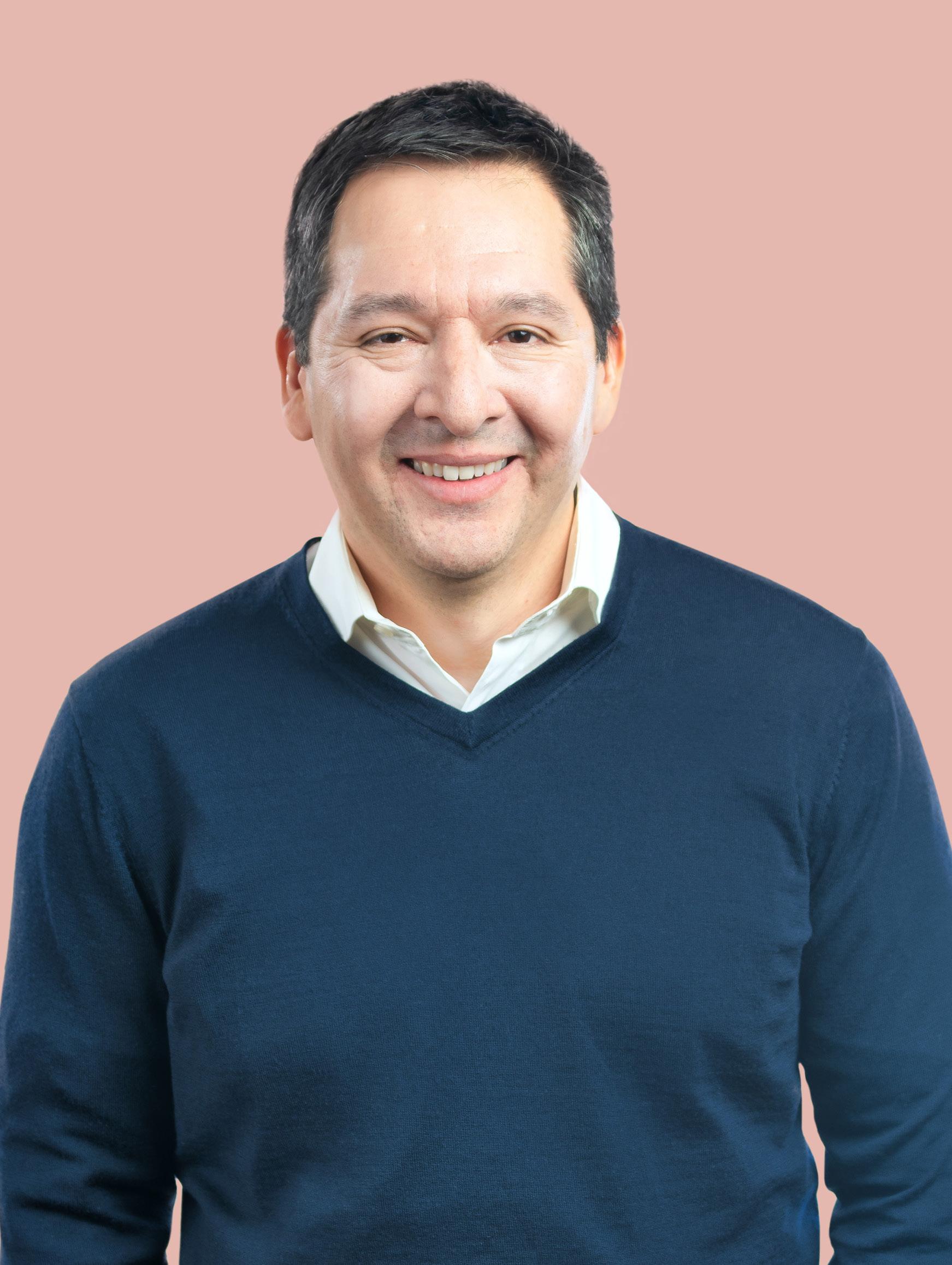
That’s precisely why the CFO takes mentorship so seriously now that he’s on the other side of it. “I’ve tried to seek out opportunities to help others because if I waited until I was fifty, it feels like that would be such a huge waste of time,” Lares says. “Even in college, I was trying to help grade school kids learn English, kids who came from homes where it just wasn’t being spoken. I knew that having command of English would make them much more comfortable and willing to seek out opportunities for themselves.”
When Lares speaks of “seeking out opportunities” to help others, it’s difficult to know whether or not he realizes just how extraordinary his commitment to helping truly is. “You only have a limited amount of time during the day, but I try and make sure that at least 25 percent of my time is spent doing something for others,” Lares says. “I realized that I had received such a benefit in getting help to get where I am, and I want to pass it on.”
“It’s become very apparent to me that there are just some opportunities you can’t take advantage of without help from others.”
Adriel Lares CFO Fastly
The Latin translation for Adriel Lares’s wine company, called Memento Mori, is “Remember that you will die”—but he and the other owners of the brand have chosen to translate it slightly differently, as “Remember to live.”
As Lares explains, the concept of the name is that we should all take advantage of every day we have. Lares and his partners have taken advantage of their brand’s success by contributing two $50,000 donations to causes nominated through their Remember to Give campaign, including the Happy Kids Foundation and EB Research.
It’s easy to see why Lares wound up at Fastly, a tech giant that has quickly become a leader in edge computing services thanks to its partnerships with companies like Advanced Technology Group (ATG).
“I am impressed with Adriel’s ability to lead and innovate through creating and executing his monetization strategy, which has produced one of the most successful IPOs of 2020 and continues to outperform his peers with superior financial results,” says Sam Jankovich, vice president of sales and strategic accounts at ATG.
The company’s partners at Salesforce are likewise impressed with the growth that Lares has helped promote at Fastly. “Fastly’s business transformation using Salesforce CPQ exemplifies how closing complex deals faster drives growth,” says Kylie Fuentes, vice president of product management at Salesforce. “This evolution enables them to rapidly meet changing market needs and provides an incredible buying experience for their customers.”
Fastly’s innovative business model is just one of the many things about the organization that appeals to Lares. “Fastly’s values are very much part of the reason I joined,” the CFO says. “We don’t have wild and crazy values, but we try and live them, which we think is the harder part to do.”
Fastly has found countless ways to walk its talk, Lares notes. The company had already given away more than $25 million of free service to nonprofits when it learned of the Pledge 1 Percent initiative, which has
inspired corporations and entrepreneurs from around the world to commit 1 percent of their total revenue to philanthropic organizations. “This was something we were already doing, but we figured we might as well apply for the certification and set an example for others,” Lares says.
“It wasn’t about recognition,” Lares adds. “That sort of approach is not [Fastly CEO] Joshua Bixby’s style at all. It’s just a case of us trying to live our values.”
In response to the Black Lives Matter movement, Fastly has dedicated itself to reviewing its recruiting practices and pledged to proactively seek out new and diverse talent. “Doing the right thing builds trust over time,” Lares says. “If your employees trust that you are working for their best interest, there will be less turnover, as well as more trust to get through those difficult times.
“And honestly, doing the right thing just means you have fewer things to remember,” the CFO adds, laughing, in a reference to Mark Twain’s famous quote.
But for a company growing by 30 percent a year, just living those values seems a small miracle in and of itself. “There certainly isn’t a lot of time to waste,” Lares says. “But if you have built that trust, so many decisions can be made quicker.” The pace of growth notwithstanding, Lares still finds time to mentor, be it future executives at Fastly or incoming freshmen at Stanford, for whom the CFO acts as a guiding hand. It’s not clear where Lares finds the time, but it’s easy to see how mentors—past and present—always seem to inform where Lares wants to go.
“We don’t have wild and crazy values, but we try and live them, which we think is the harder part to do.”

A rocketship of innovation, from Campaign to Cash. Revenue Blueprint is a connected perspective on what it takes to optimize experiences for customer engagement and recurring relationships for the modern business.

IT’S STILL DARK OUTSIDE WHEN A MAN DRESSED in a suit leaves his house and starts his car. An on-screen graphic surrounds the car’s headlights: “Components tested by Bureau Veritas.” He drives, passing a power plant. “Environmental Impact controlled by Bureau Veritas.” Next, the protagonist enters an office building and steps into an elevator. “Inspected by Bureau Veritas.” As the three-minute video depicts what seems like an average day, the man unwittingly has twenty-one encounters with Bureau Veritas.
Maggie Laureano found the video online as she was researching global companies. After leading HR for Embraer’s North America division, she was looking to exit aeronautics and step into a new industry. In addition to learning a new sector, Laureano wanted to help a global company make a meaningful impact on the world. The 2018 video, entitled A Day with Bureau
Veteran HR leader Maggie Laureano helps Bureau Veritas execute a growth plan by focusing on what matters most: its employees
Veritas, was quite convincing: Laureano decided to pursue work within the organization.
Bureau Veritas (BV) tests, inspects, and certifies products and services in many fields, including construction, agriculture, and retail. Founded in 1828, the company now has seventy-five thousand employees who generate approximately €5 billion (about $5.9 billion) in annual revenue. “I was impressed with the work Bureau Veritas does combined with its enormous reach as a global company,” Laureano says.
Today, Laureano is Bureau Veritas’ vice president and HR lead for North America. In that role, she’s responsible for coordinating talent management and talent acquisition programs to support important growth initiatives. Because BV is a large company with many specialized business units, she’s made a concerted effort to understand precise staffing needs by visiting job sites, speaking with leaders, building relationships, and interviewing employees.
Some HR leaders would have been tempted to rely on faster methods, but Laureano knew she needed to dig deep to understand the complex business. “One size does not fit all,” she emphasizes. “Those who have the best success in HR understand the nuances in their specific business and respond accordingly.”
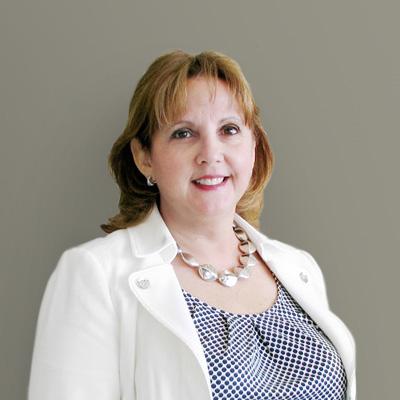
That approach, while time consuming, uncovered some important and actionable intel—Laureano discovered a talent shortage as well as a potential looming crisis. Many elevator inspectors had recently retired, some had moved to part-time, and others were planning to retire soon. With other trades rising in popularity, new inspectors are hard to find. Armed with this new information, Laureano asked her team to create internships, apprenticeships, and partnerships with technical institutions to create a pipeline that would proactively address the shortfall head-on.
Leaders at Bureau Veritas were quick to support Laureano’s new initiative. In fact, she says her team can move rapidly because decisions happen at the local
level. Empowered leaders keep the organization, which has 1,500 offices in 140 countries, agile. “If something works for a local team, leaders approve it, we do it, and then we see if it makes sense for other regions,” she explains. “It’s very exciting for someone in HR because you can make a real, direct impact.”
This style and culture informs how Laureano hires. Now, she looks for entrepreneurial leaders who want to leave their mark on a department. In 2020, she worked with her team to help BV navigate challenges associated with COVID-19 and civil unrest. In helping executives create an effective strategy, Laureano focused on one
Maggie Laureano
VP of HR, North America Bureau Veritas
“One size does not fit all. Those who have the best success in HR understand the nuances in their specific business and respond accordingly.”
Founded in Antwerp, Belgium, in 1828, Bureau Veritas’ original mission was to standardize rules for marine operations. Today, the business serves as a leader in testing, inspection, and certification, serving clients across consumer products, food and agriculture, building and infrastructure, oil and gas, and numerous other markets. From boats and planes to buildings, power plants, automobiles, and children’s toys, BV is the go-to contact for performance enhancement and risk reduction. That is why, in New York City alone, half of all elevators are inspected by BV employees.
thing: communication. “As an HR leader, I know how important honest information is. Tell the whole story, even in difficult times,” she stresses. “When you share information, you can get people to rally around it, and you create an opportunity that you would otherwise miss.” When companies are less than forthright, the VP adds, employees often invent and perpetuate a false narrative.
Laureano’s partners, including Alliant Employee Benefits, have taken note of her commitment to honestly serve the people of Bureau Veritas. “Maggie is an exceptional leader who operates with the highest degree of integrity,” says Kelley Milburn, executive vice president at Alliant. “In my experience, she has been able to quickly assess situations, evaluate options, and make decisive decisions that are focused on organizational goals and the employee population she serves. She has been a great partner to work with.”
Laureano’s skills came in handy during the coronavirus pandemic as she helped Bureau Veritas craft its messaging and deliver content through frequent emails and town hall meetings. HR offered numerous webinars on health and well-being initiatives to address BV’s large population of essential employees. Employees were also reminded about the company’s new well-being and mental health services package, which Laureano created alongside a total rewards director she brought with her from Embraer.
Laureano continues to help Bureau Veritas pivot as the pandemic changes how business is done around the world. In 2020, the company introduced a service called Restart Your Business with BV to reduce the spread of COVID-19 and certify health, safety, and hygiene conditions for hospitality, restaurant, and retail clients. HR moved quickly to recruit the right employees to support the new initiative.
As Bureau Veritas moves forward, Laureano looks for other ways HR can support the company and its employees. Her teams are
already enhancing features on internal web portals and apps so workers can log time, elect benefits, change beneficiaries, and complete other tasks remotely.
Whether she’s working on a small upgrade or rolling out a new program, Laureano thoroughly enjoys her new role. “This company does meaningful work to help keep many people around the world safe,” she says. “I get to contribute to that endeavor, and I get to make sure our own employees are kept safe, too.”
“As an HR leader, I know how important honest information is. Tell the whole story, even in difficult times.”
Great leaders are not afraid to reach beyond expectations, finding innovative ways to exact positive change in business, society, and the world at large. Alliant congratulates Maggie Laureano, Vice President of Human Resources, North America for Bureau Veritas and all of the Leading Latinas for their fearless and inspiring pursuit of excellence at a time where we’ve never needed it more.
The Alliant experience uncovers new possibilities for your organization so you can capitalize on opportunities where it matters most – in the reduction of healthcare and administrative burdens. We combine our strong institutional knowledge with continuous innovation, using data to drive meaningful, long-term results for your organization.

We’re the partner you can trust to look beyond the status quo.
Kelley MilburnExecutive Vice
(713) 470-4168
Presidentalliantbenefits.com

Monica Lopez Reinmiller spends her days promoting messages of social responsibility and advocacy—and at T-Mobile, she’s found a perfect partner for her efforts

Lopez Reinmiller lives and breathes social responsibility. For her, social responsibility is not simply something to focus on during off-hours in one’s spare time. It’s a way of life.

Lopez Reinmiller brings this passion to the table as the managing corporate counsel for compliance at T-Mobile, a role she took on in January 2017. She also does extensive pro bono legal work throughout the Seattle area. But her passion for social responsibility extends far past her tenure at T-Mobile—in fact, it has its roots in her childhood, when she grew up in a predominantly Latino community.
“We were watching out for each other and the greater community with an overriding sense of just making sure that people were OK,” she says. “If you could help, you would help. Everyone was conscious of representing our community and making sure that people didn’t fall down, so to speak.”
She developed a more professional interest in social responsibility during her college years and later at law school. Lopez Reinmiller held jobs all throughout college and strongly believed in supporting the businesses that employed and believed in her. In law school, her attention extended beyond local businesses and to the global stage.
“As I began studying international law and all these different ideas and principles of responsibility from a legal, corporate, and individual rights perspective, I really started gaining an affiliation and appreciation for compliance work,” she recalls.
For Lopez Reinmiller, wireless telecommunications giant T-Mobile is the perfect place to exercise this dual
passion for compliance and social responsibility. One way in which she’s been able to showcase her social responsibility prowess is by working on T-Mobile’s employee Code of Business Conduct, as well as the company’s Supplier Code of Conduct. As she explains, both codes represent ethical frameworks, expectations, and principles rooted in social responsibility for the company’s employees and business partners to follow.
Establishing consistent codes of conduct is more important to the organization than ever, as TMobile merged with Sprint in April 2020. As the primary attorney assigned to this project, Lopez Reinmiller takes great pride in updating the codes in a way that honors the newly joined organizations. “I have the responsibility of ensuring they align with the company’s values, culture, and who we are as a company out in the community; that they are reflective of our current environment and our commitment to be good citizens; and that they align with the expectations we have of business partners to do the same thing,” she explains.
Lopez Reinmiller also sits on a diversity taskforce committee in T-Mobile’s legal department, and the topic that has lately dominated discussions is the question of how to continue driving toward company-wide equity and equality. “At T-Mobile, employees are fortunate that the company has taken a driver’s seat when it comes to facing, discussing, and driving progress toward racial equality,” the attorney remarks. “I think a lot of big companies are at the beginning stages of their journey. T-Mobile mobilized rather quickly in the face of the George Floyd killing because, for the company, diversity wasn’t a second thought. It was something the company as a whole was very conscious
of and very focused on, but it took on new meaning when that happened—and it’s only accelerated the discussion, the progress, and the steps the company’s taken.”

While she believes wholeheartedly in the work she does every day at T-Mobile, Lopez Reinmiller is equally passionate about finding ways to give back outside of the office. She estimates she spends at least twenty hours a month doing pro bono work for several nonprofit organizations in the Seattle area, including Communities Rise, the Eastside Legal Assistance Program, and the Seattle Clemency Project. Through these organizations, she has helped families with basic estate planning, assisted Spanish-speaking business owners as they navigate legal matters, helped small business owners settle disputes, and more.
In mid-2020, Lopez Reinmiller was working with the Seattle Clemency Project to represent a client who was incarcerated for more than thirty years, ever since he was a juvenile. Lopez Reinmiller wants to make sure that people such as her client are afforded legal representation if there is an opportunity for them to appeal a sentence or request clemency or early release on the basis of criminal justice reform.
This can all be time consuming, but Lopez Reinmiller wouldn’t have it any other way. She credits her family with supporting her in both her daily work at T-Mobile and her community service and activist efforts. “I have a daughter who’s seeing me model a certain commitment and behavior,” she said. “I’m hopeful she will model that later in life and that she’ll feel strong when it comes to giving back to her community, wherever that may be.
“When you demonstrate social responsibility and make it a priority,” she continues, “it really does follow you. It has a tendency to envelop the people around you, whether it’s your family, your friends, your network, or your coworkers.”
 Greenberg Traurig LLP: “Congratulations, Monica Lopez Reinmiller on your profile in Hispanic Executive. We are proud to call you our partner and friend.”
–Adelaida Vasquez Mihu and Sandra Gonzalez
Greenberg Traurig LLP: “Congratulations, Monica Lopez Reinmiller on your profile in Hispanic Executive. We are proud to call you our partner and friend.”
–Adelaida Vasquez Mihu and Sandra Gonzalez
“At T-Mobile, employees are fortunate that the company has taken a driver’s seat when it comes to facing, discussing, and driving progress toward racial equality.”
DECKERS OUTDOOR CORPORATION IS HOME to footwear staples such as UGG, Hoka One One, Teva, Sanuk, and Koolaburra. More than three thousand Deckers employees are located across the world, but its brand headquarters is nestled away in Goleta, California, which has a population of a little more than thirty thousand. That small-town feel may be part of the magic in Deckers’ DNA that has consistently kept the company at the forefront of both environmental, social, and corporate governance (ESG) and equity, inclusion, and diversity efforts. Deckers’ purpose, explains Senior Vice President, General Counsel, and Corporate Sustainability and Compliance Officer Tom Garcia, is to positively impact the world by uniting purposeful brands with a diverse group of people driven to succeed and create change.
“People gravitate toward Deckers because we really value friends, family, and doing the best thing for the community,” Garcia says. “There’s this powerful feeling of teamwork within the organization that is, in part, a reflection of our home office. We’ve found a way to really foster that community feeling and live out our values.”
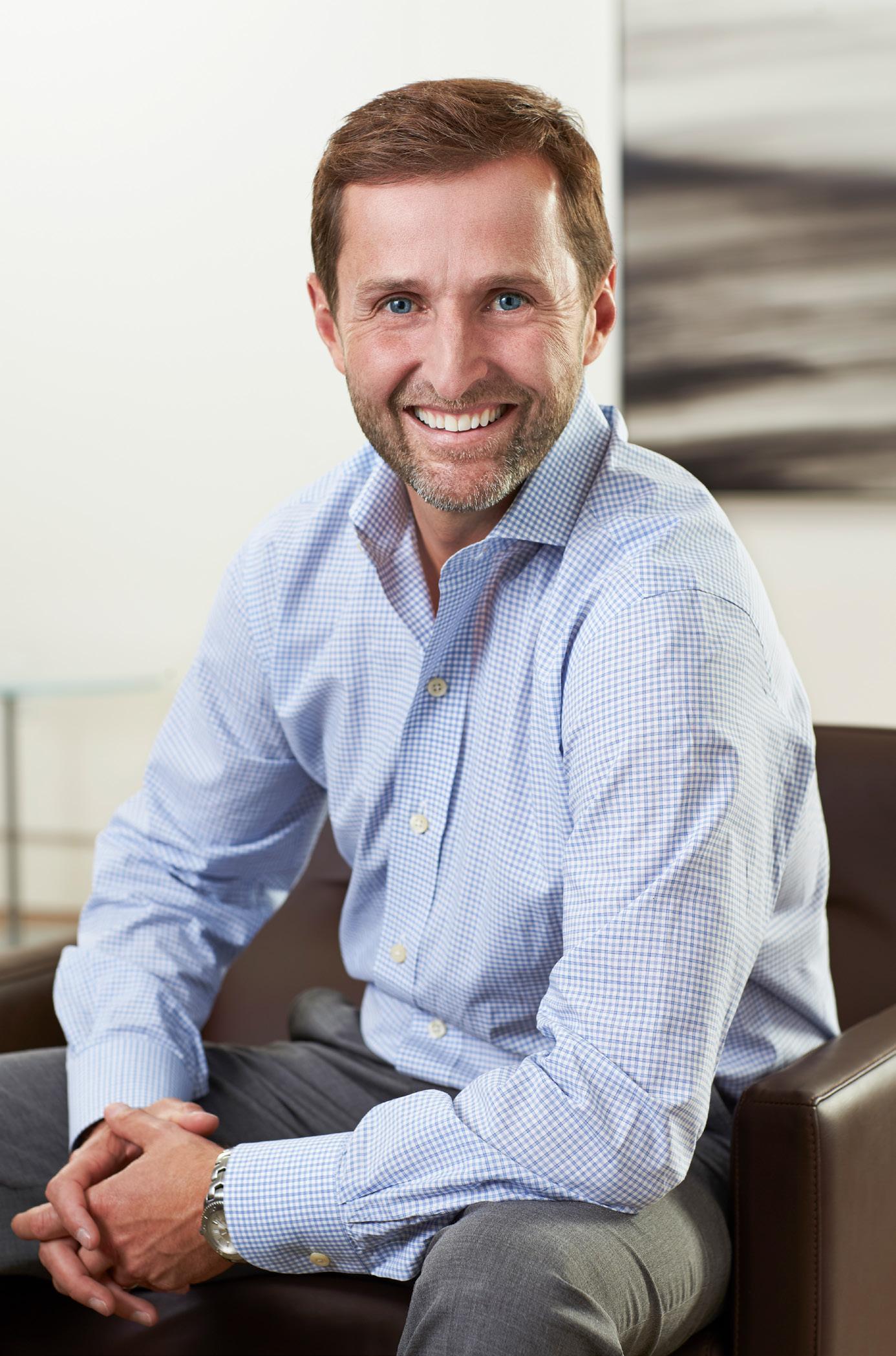
Garcia has been at Deckers for nearly twelve years. During that time, the Deckers culture has of course evolved and changed. But as Garcia sees it, it’s simply been a case of making a good thing even better. “I’ll always remember one of the first times I walked in the door. I saw our COO at the time strolling around in flip-flops,” Garcia recalls. “That focus on just being who
Tom Garcia SVP, General Counsel, and Corporate Sustainability & Compliance Officer Deckers Outdoor CorporationTom Garcia helps Deckers Outdoor Corporation make the most of its inclusive, impact-oriented culture
you are at work—it’s so powerful, and we’re continuing to look for ways to enhance that for our people. It’s an ongoing journey.”
That community-minded aspect is perhaps best illustrated by Garcia himself. The GC consistently downplays his own involvement in a culture that he is obviously immensely proud of. “As I reflect on the challenges of 2020 and our collective success over the past few years in general, this has been a full team effort,” Garcia says. “This isn’t one person. It is all our people coming together and building our culture along the way.”
An integral part of the culture at Deckers, Garcia says, is the company’s volunteering and giving program. “We do a great deal of volunteering in our global communities and continue to grow our global giving program. I’m really proud of the work that the team has done, and it just keeps getting better,” Garcia says. “Even during COVID-19, Deckers continued to foster that desire to do good in our communities by compensating employees for their volunteer hours.
“We were planning on a designated day of giving this year,” he adds, “and that turned into a week that we called ‘The Art of Kindness.’” Employee engagement during that week was incredible, Garcia says, and the volunteer hours completed were tremendous. But even more than that, he stresses, it was a positive light in an otherwise challenging year for many Deckers employees.
“Our organization is obviously focused on performing well,” the SVP says, “but when you’re able to do good in the world, that feeling is so important. It truly makes us all proud to work for an organization that encourages doing good even during these times.”
In response to larger conversations raised by the Black Lives Matter movement of 2020, Deckers quickly expanded and prioritized its diversity and inclusion efforts. Garcia notes, “We’ve built out a team and leveraged the cross-functional passion of the organization to drive our global strategy to support these efforts. In addition, Deckers donated $500,000 in support of organizations seeking to bring focus to minority voices.” Of course, those monies represent only a fraction of the company’s overall giving program, which grows as a percentage of Deckers’ revenue every year. “It’s something we’re very proud of,” Garcia says.
Deckers’ board of directors is a reflection of the company’s values. One-third of its members are women, and more than one-third identify as a minority. “The good that we do is a reflection of our board of directors,” Garcia offers. “I’ve had the opportunity to work closely with them for many years now, and they’re a very big part of this entrenched ‘do well by doing good’ mentality we have here.”
That same mentality applies to Deckers’ ESG efforts. “Essentially, we live by the values underpinning the
“There’s this powerful feeling of teamwork within the organization that is, in part, a reflection of our home office. We’ve found a way to really foster that community feeling.”
B Corporation movement, without the technical designation,” Garcia notes. “We just believe in doing the right thing. Our CEO Dave Powers has been hugely instrumental in enhancing that culture that we’re seeing blossom now.”
According to the Garcia, one of the biggest areas Deckers can make an impact in is materials. Deckers strives to incorporate 50 percent more certified-responsible and sustainable materials in its products, including recycled, renewable, regenerated, and natural materials. “Most people think sustainably has to be expensive, but often it’s about looking at what you have and seeing if you can identify an opportunity to streamline. This often saves money and environmental resources,” Garcia notes.
If you’re using leather from a certified leather working group, he explains, it will naturally be a product that has been tanned in a more sustainable way because those groups have better water treatment facilities and capabilities. If you’re using repurposed wool instead of virgin wool, that will save on energy, water, and CO2 emissions. “We want to use preferred materials in all our products,” the SVP emphasizes.
Deckers’ Teva brand has moved 100 percent of its iconic straps to recycled polyester. “A tremendous effort by the Teva and materials teams,” Garcia admits. “But it has made a huge impact.” Another area of improvement is packaging: Deckers has saved more than 2.3 million trees to date by cutting down on the materials used in shoeboxes.
There are also solar panels in Deckers’ US facilities; a distribution center that is nearly a zero-waste facility; and ongoing efforts to monitor waste generation, waste diversion, and energy and water use among the majority of the company’s supply chain partners. “We’re not really out there beating our chest about how sustainable we are,” Garcia says. “We recognize that sustainability is a journey, and we want to remain humble with our efforts and continue to get a little better every day. I believe that the Deckers that lies ahead is even better than today’s Deckers—and we’ll get there together.”
DANIEL CORTEZ WAS IN HIS FINAL YEAR OF LAW school, recently engaged, and preparing to begin his legal career when his worldview changed forever. He was visiting his then-fiancée, now wife Jennifer in Nashville, Tennessee, and as they drove around the city, Cortez became engrossed in what his bride-to-be had on the car stereo. It was Dave Ramsey, the radio host and number one national best-selling author whose disciplined approach to personal and household finances has netted millions of listeners, followers, and success stories from all over the world.
“At that time, I was facing a lot of decisions about the kind of person, attorney, and husband I would be, as well as what priorities I needed to have to lead my family well,” Cortez remembers. “But I didn’t have a full framework for all of the ways I would need to accomplish that.”
Instead of studying for upcoming law exams, Cortez read Ramsey’s Financial Peace: Restoring Financial Hope to You and Your Family. He spent two days in the library tearing through the book, which became the foundation and guiding principle for Cortez’s financial future.
That was 1998. Twenty-two years later, Cortez finds himself general counsel for Ramsey Solutions, a 950-person company founded on the teachings and mission of the man
Cortez first heard on a Nashville highway. “My family is an example of the fruits of the teaching and solutions that the company is providing to people in every walk of life,” Cortez says. “The principles we teach are the same ones that allowed me to get where I am today and to help navigate a future for my children.”
In many ways, coming to Ramsey Solutions seems like a career culmination—as well as a full-circle development— for Cortez. The company’s mission of giving and empowerment aligns perfectly with the leadership style that the GC has cultivated over his twenty-two years in the field. “There is this mentality in many professions that people should throw their young folks into the deep end and then tell them to swim,” Cortez notes. “It’s deeply ingrained because it’s the way they were taught. But I knew early on that I didn’t want to replicate that. All of the time that I’ve invested in my team members throughout my career has come back to me ten- or one-hundred-fold.”
By investing in his team members at Ramsey, the transactional lawyer is aiming to make the legal department a more critical business-enabler for the company. “I’ve been fortunate to work for a company that was doing $3.5 billion in annual revenue, and I’ve seen firsthand the infrastructure
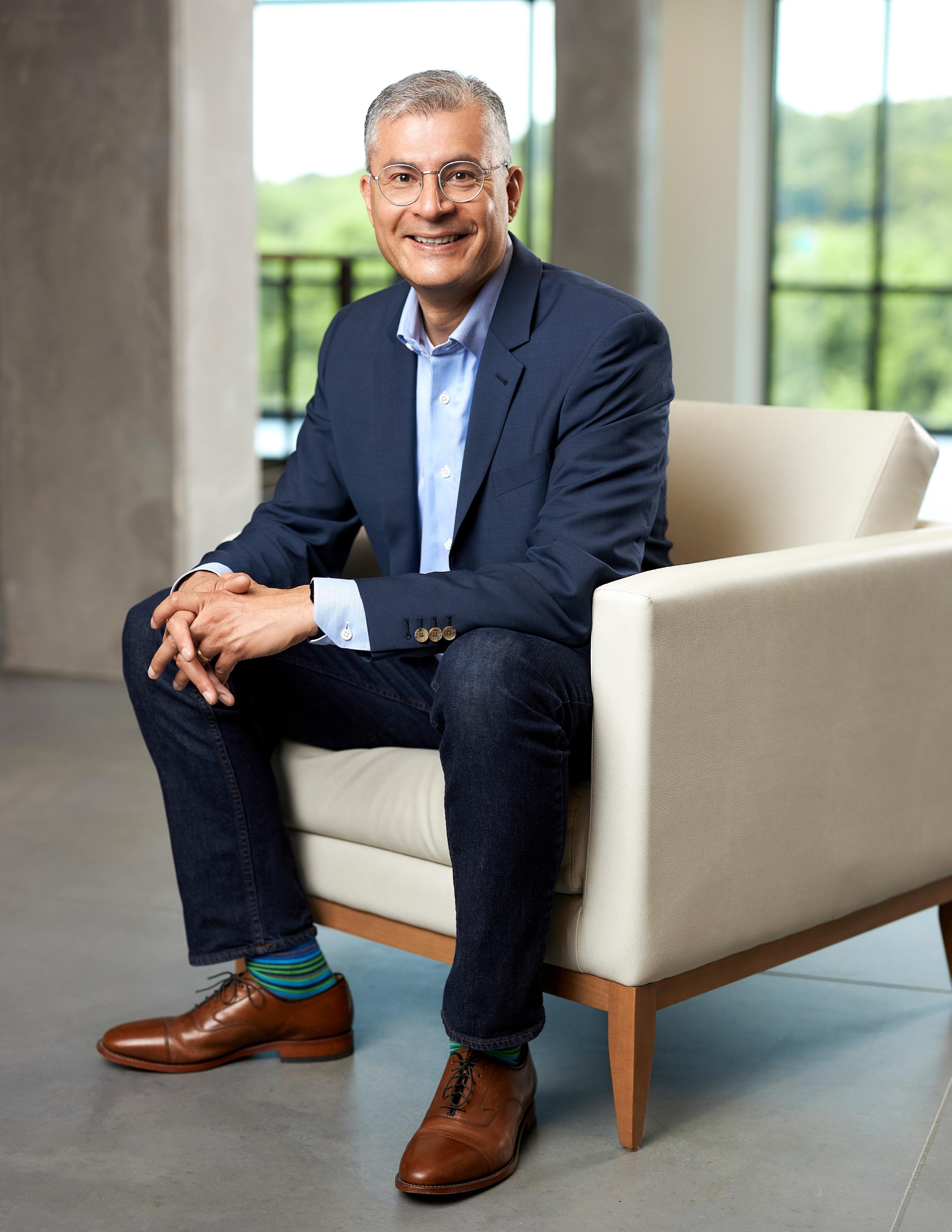
Thompson Burton PLLC is a full-service law firm with offices in Franklin and Nashville. The firm has diverse practice areas, including commercial real estate, bankruptcy, direct sales, family, corporate, and employment.











Thompson Burton redefines the art of law by utilizing creativity, technology, flexibility and innovation to more effectively deliver information and connect with our clients. With the growing sophistication of clients and the increased connectivity of the world, Thompson Burton represents an advancement in the delivery of legal services.
you need from a legal perspective to help support it,” Cortez says. “I want to be able to implement those things to make it easier for us to accomplish the growth we’re working toward.”
What’s most important, Cortez says, is that growth at Ramsey isn’t achieved for growth’s sake alone.
“I have never been in a meeting where a decision was made purely from a financial standpoint. And I’ve got to tell you, there have been so many times where decisions could have easily been made only from that perspective,” Cortez explains. “Every decision I have been part of has been driven primarily by our mission: Is this going to help more people?”
connection to our mission is something that everyone here shares.”
According to Cortez, the company’s mission to help others is not limited to the financial realm. In fact, that mission plays out in a thousand different ways for employees at Ramsey. After one year of employment, the GC explains, every employee is offered one week of paid leave, separate from vacation and sick time, to take part in charity work of their choosing.

thompsonburton.com






It is exactly that mission—and Dave Ramsey’s personal efforts to help as many people as possible free themselves of debt—that draws professionals such as Cortez to the company in the first place. At Ramsey, the GC is part of a much larger collective of people who have taken the founder’s message to heart. “As the new guy early on, one of the first questions I was asked—and now one of the first questions I ask others—is, ‘How has Dave’s message impacted you?’” Cortez says. “And almost all of the stories I hear are a variation of mine. That personal
Ramsey Solutions has also taken a leading role during the COVID-19 pandemic. During the early days of the pandemic, Cortez says, Ramsey employees could be seen flagging down healthcare workers at gas stations and offering to pay for their gas.
Of course, Ramsey’s tools and lessons are also a critical resource during this time, as the GC points out. “From a timing perspective, the principles that we talk about—namely that debt should not be something that we regard as normal—is something we all need to think about very seriously now,” Cortez emphasizes. “We want to help people understand that it’s not too late for their finances, relationships, and careers, and that there are changes they can make. We can provide a road map through this incredibly difficult time.”

“We want to help people understand that it’s not too late for their finances, relationships, and careers, and that there are changes they can make. We can provide a road map through this incredibly difficult time.”
What is your secret to successful leadership? The impressive executives featured here share theirs, and they are strategies that engage both the mind and the heart.
Alica Del Valle on the strength and unity of Airbnb’s global network of hosts, guests, employees, and partners
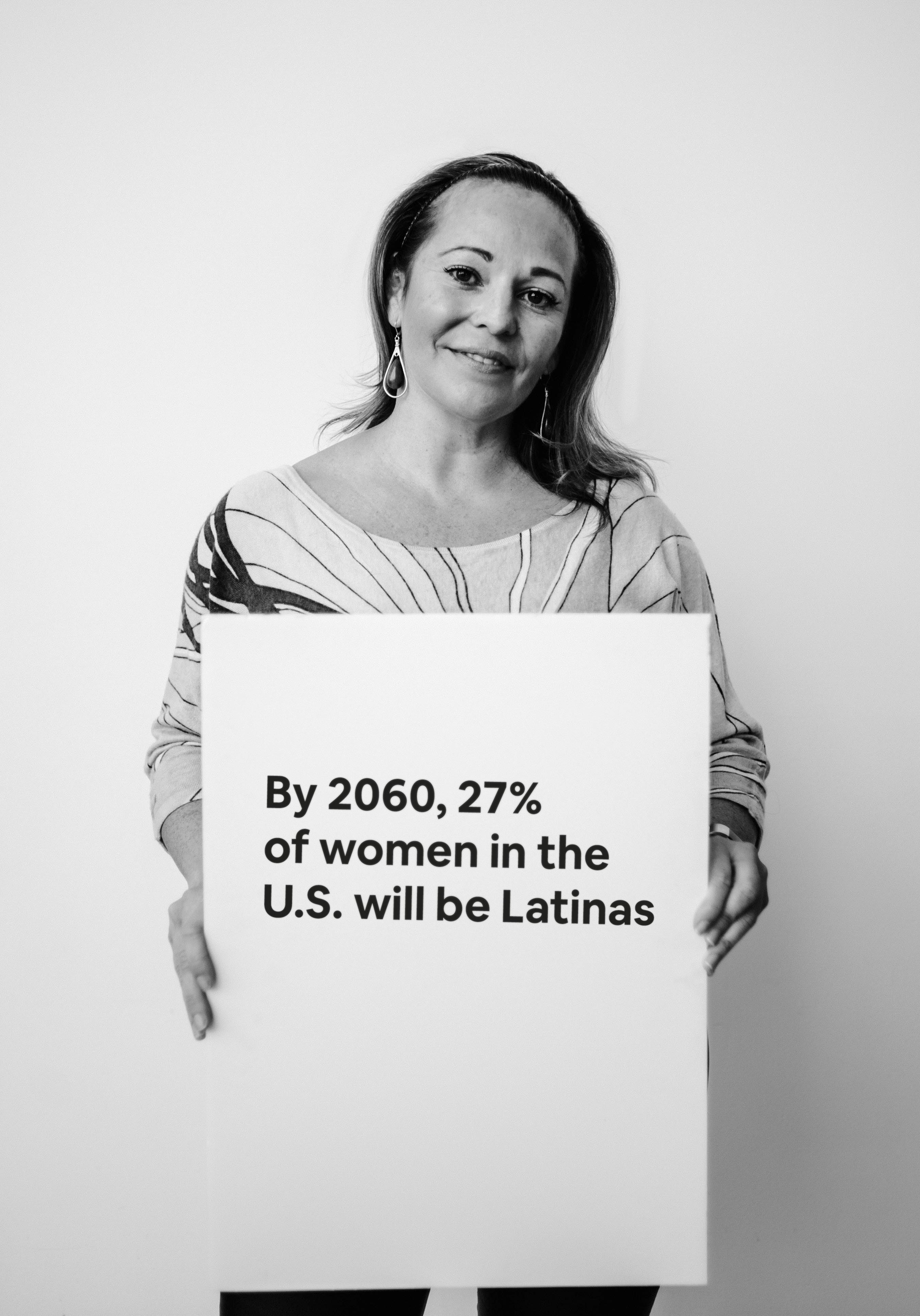
Del Valle and her partner were some of the lucky recipients. Rather than paying for the face masks, each person who received a mask was asked to do something nice for a stranger, something Del Valle took to heart.
She transformed the corner of her property into a community area, complete with benches, a free library, a station where neighbors could write poetry, and a community message board, which, following the California wildfires of 2020, was dedicated to thanking first responders. “It was a beautiful reminder that we’re not alone,” Del Valle says. “We are all tied together as part of a larger community.” Today, Del Valle carries that same community-minded perspective into her work as associate general counsel of marketing and IP at Airbnb, ensuring that the marketplace for unique, authentic places to stay and things to do grows by bringing
its entire diverse community of employees, hosts, guests, and partners together.
Earlier in her career, working as a staff attorney at the California Supreme Court, an associate at a boutique IP law firm, and as an in-house attorney at Salesforce and SanDisk, Del Valle realized the importance of fostering a healthy workplace environment.
“I spent the first six or seven years of my career without taking a vacation, trying to prove myself,” she says. “But then I realized I was fighting for a success that I didn’t necessarily buy into, and the physical manifestation of stress is a real thing.
“I make sure my team knows that there is a world where you can be a very dedicated professional and do incredible work and still take care of yourself and prioritize your mental, spiritual, and physical well-being,” Del Valle adds.
As her community in Napa, California, began to feel the impact of the COVID-19 pandemic, Alica Del Valle took note of a neighbor who began making hand-sewn face masks for any who needed them throughout the community.
At Airbnb, Del Valle dedicates herself to cultivating a genuine sense of trust and acting with compassion. Her goal is to invest in the growth and development of each member of her team, ensure that they feel empowered to work independently, and provide whatever support they need. To that end, Del Valle has spearheaded several diversity and inclusion initiatives and is actively working with a subgroup of women and minorities to address inherent biases and issues within her department and the broader company.
Del Valle is equally determined to forge strong relationships throughout Airbnb’s legal department, the broader company, and with critical external partners. Empathy, she explains, is critical to successful collaboration with business and legal partners, law firms, and necessary service providers alike.

“We need to recognize that we often serve as partners, counselors, and subject matter specialists but rarely lead whole initiatives unilaterally,” Del Valle says. “Every person has their own micro-universe and way of working with others. We need to start from a point of assuming best intent and then bring empathy in how we partner, support, and counsel.”
That emphasis on collaboration has turned out to be invaluable, particularly during the development and launch of the Trips business (now Airbnb Experiences). Up until that project, Del Valle says, the company had exclusively focused on providing unique and authentic accommodations around the world. The Trips launch would, for the first time, allow users access to an array of unique and authentic global experiences, from truffle hunting in Tuscany to Samurai swordplay in Tokyo.
Years after the release of Airbnb’s Super Bowl ad, the company was contacted by the San Francisco Gay Men’s Chorus: instead of going on a European tour, the group wanted to tour the American South and find ways to highlight the nation’s common humanity. They asked Airbnb to help them find places to stay during their tour.
The SFGMC’s journey was captured in an award-winning documentary called Gay Chorus Deep South , for which Alica Del Valle provided legal support.
“I was the eighteenth lawyer hired at Airbnb, so back then we all had to wear a lot of different hats to make things happen,” the attorney says of the Trips launch. “I reviewed over nine thousand pieces of content and learned so many new spaces, from food law to transportation law.” But after months of tireless work, Airbnb launched Trips to much acclaim, and Experiences has since become a growth force for Airbnb.
Immediately after the launch, Del Valle and her family took a trip to Bali. While there, she decided to book a “Meditate with a Shaman” Airbnb Experience herself. “It was an incredible exposure to the local traditions and culture for us, and we were delighted that the host was so effusive about how the [Experiences] product was changing lives and serving as a gift to the community,” Del Valle recalls. “That ability to bring people together is so important to us that when we first faced the pandemic, Airbnb ensured we could transition the model to create online Experiences to cater to our changing world circumstances. It’s beautiful to watch the project evolve and continue to have meaningful impact.”
But the Trips launch project isn’t the only initiative Del Valle has worked on to have that kind of broad-ranging impact. In 2016, Del Valle worked alongside former Chief Marketing Officer Jonathan Mildenhall and his “Superbrand” team on the company’s Super Bowl ad, an effort specifically designed to reflect Airbnb’s ethos of “Belonging” and acceptance.
“On the heels of President Trump banning transgender people from serving in the military, we had an opportunity to highlight creative work produced entirely in-house that reflected what we stood for and wanted to see in the world,” Del Valle recalls. “We felt that it was important to use highly coveted advertising time to promote a message of acceptance and belonging for all people rather than a product.”
Composed of a series of close-ups, the ad highlights a wide spectrum of people of all ages and races. This is representative of both the communities that Airbnb serves and is composed of, Del Valle emphasizes. “Having diverse perspectives and diverse backgrounds is ultimately far more enriching and far more impactful,” she says. “Airbnb spoke to me from the outset because of its desire to reflect and promote a more diverse and inclusive world.”
“Airbnb spoke to me from the outset because of its desire to reflect and promote a more diverse and inclusive world.”
who is going places with her innovative leadership as Airbnb’s Associate
JAMS’ dedication to its associates has kept Laura Martinez at the company for more than thirty years. Now, as CHRO, she’s helping the organization reach new heights by doubling down on its commitment to its people.
THE CLOUDLESS SKY AND CALIFORNIA sun had Laura Martinez in a good mood as she arrived at an Orange County hotel for a strategy session with the JAMS executive team. Martinez, who joined the dispute resolution services provider in 1989, was excited to join eleven of her colleagues gathered in the hotel’s conference room. For the next three days, the team worked with a strategic consultant, completing surveys, brainstorming sessions, and group projects related to the future of JAMS. All ideas were welcome, and no topics were off limits. At the end, Martinez walked away more confident than ever in the company’s strategic direction.
That was 2016. Since then, Martinez has seen her hopes for the company—and its hundreds of associates—come true.
Martinez, who currently serves as JAMS’ chief human resources officer, says her department mantra hasn’t changed since Hispanic Executive featured her in 2014. “JAMS is still about providing first-class service, and any success we have can be largely attributed to our people. HR at JAMS has always been all things people, and that won’t ever change,” she says.
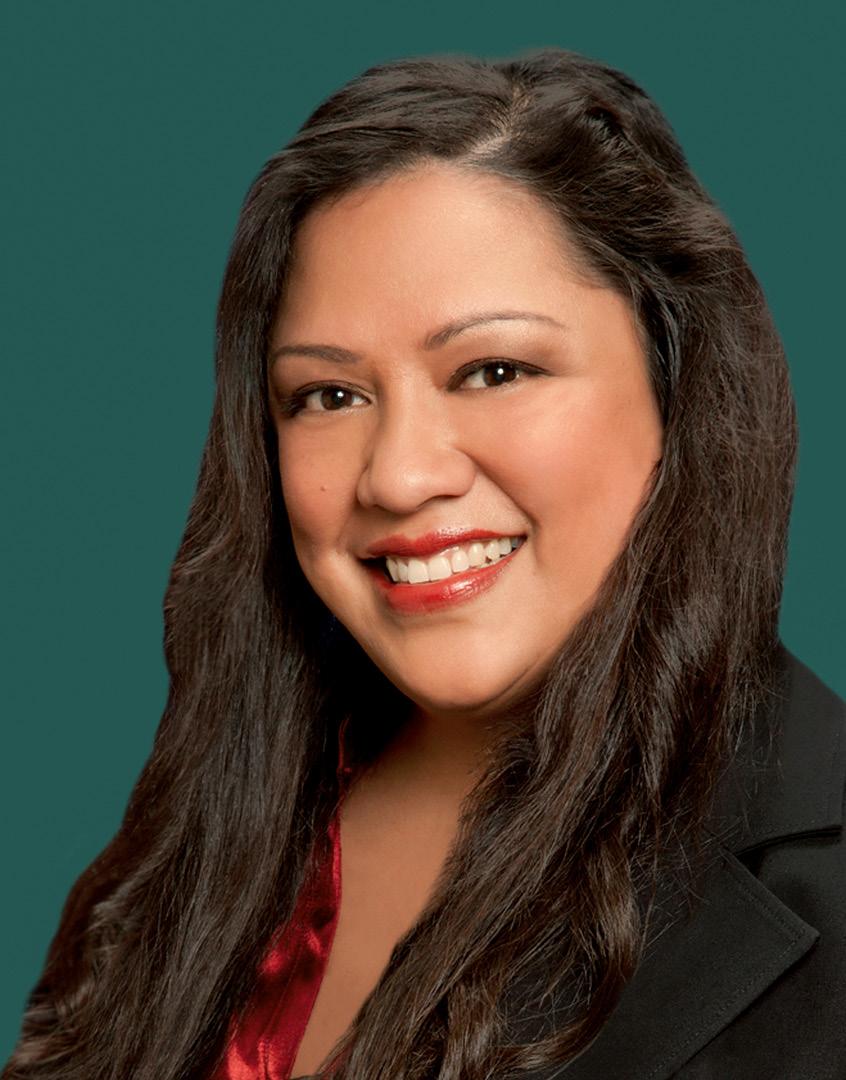
While JAMS culture remains strong, the 2016 strategy session reinforced the organization’s commitment to investing in its talent.
At that session, company leaders drafted a new formal strategy based on five pillars.
As they began suggesting pillar categories, Martinez knew she had to speak up.
“Developing our people has always been a value here, but I wanted our leadership team to really understand how important our people are to fulfilling our mission,” she says.
“If we invest in our people, we send a strong
message to them and we create a competitive differentiator for ourselves.” There was some push back, but most felt like it was the right move. Martinez was persuasive—and other leaders agreed to formalize “Invest in Talent” as one the five pillars in JAMS’ new corporate strategy.
The move was significant because time, finances, and other resources flow to each of the five pillars in the plan. With Invest in Talent in place, Martinez unlocked funds to work with her team to develop “The Agile Leader,” an official leadership program that replaced a more informal model. Encompassing a series of workshops, conversations, and classes, the Agile Leader program was designed to give JAMS managers the tools they need to lead effective teams amid constant change. “Navigating turbulence is key, and providing tools for our leaders to do that meant they could effectively support their teams. It’s vital to take care of our managers and people this way. If we take care of our people, they take care of our clients,” Martinez emphasizes.
Agile leaders are also prepared to pivot and adapt. Those skills were crucial in March 2020 when COVID-19 forced JAMS to move from a 100 percent office workforce to a remote work model in just forty-eight hours.
As Martinez states, “It was a remarkable thing to witness. The entire workforce mobilized and worked together cross-functionally and across the nation to achieve this. The timing of the [Agile Leader] training was almost a foreshadowing of the things to come, and allowed our leaders to put those tools and skills into practice.”
Martinez helped JAMS leadership guide their teams through the change by drawing upon lessons learned during previous challenges. “All organizations face tough times as they navigate economies and world events,” she explains. “I’ve seen our highquality associates and leaders weather other storms, and that allowed me to project a sense of confidence and maintain a sense of possibility that JAMS associates could trust.”
As CHRO, Martinez worked with the executive team to usher JAMS associates through the challenges brought on by the pandemic. Initially, she worked with her team and other departments to both enhance the company’s virtual platforms and increase the velocity and regularity of communication, which helped keep remote workers connected. The CHRO next organized town hall meetings, while her team built a remote work tool kit and enhanced wellness and mental health support.
Martinez and other JAMS leaders and associates worked around the clock to get associates set up in their home offices and provided a month-

ly stipend to cover additional remote work costs. To date, no JAMS associates have been furloughed or laid off due to the pandemic.
Even as JAMS navigated the pandemic, other national events begged a corporate response. “Companies can’t ignore the racial divides and civil unrest that have always existed but that we’ve recently seen erupt in our nation,” Martinez says. “These issues impact not only organizations but the people working within them.” Motivated by a desire to further support their associates, the company created an ongoing diversity and inclusion program called CLASS (Conversation, Listening, Acting, Supporting, and Sustaining). CLASS is available to all JAMS associates and panelists. These events helped Martinez grow as a leader, but also solidified something she’s known since 1989. “JAMS is a special place. We truly do value our people,” she says. “If you value your people and truly care about their well-being, you’ll go far in business and in life.”
The JAMS Wall of Thanks underscores Martinez’s belief that the company is a special place that appreciates the company’s efforts to support its people. This is evidenced by the three hundred associates that have sent more than five hundred messages of gratitude since the Wall’s inception in 2012. More than one hundred of those messages came in the first nine months of 2020.
“If we take care of our people, they take care of our clients.”
THE COLLECTION OF STATISTICS ON the American Latino population’s readiness for retirement is filled with an array of disquieting numbers. Only 54 percent of Latinos work for an employer that offers a retirement plan, which pales in comparison to nearly 70 percent of all workers. Even further, only 31 percent of Latino workers actually participate in an employer-sponsored retirement plan. When polled, 57 percent of Hispanics have never calculated how much money they’ll need to continue their current lifestyle, and 70 percent do not have a formal investment plan to reach their retirement goals.
The reasons for these numbers are as complex as the people they represent, but the financial and cultural chaos of 2020 has done little to mitigate those problems. That is why financial investment and management institutions such as Principal Financial Group, a global corporation headquartered in Des Moines, Iowa, have moved on from simply recognizing the financial disparities associated with the Latino community to actively endeavoring to help change them.
Kevin Morris, vice president and chief marketing oficer of retirement and income solutions at Principal Financial, and Carlos Navarro, director of marketing, are spearheading the company’s outreach to the Latino community. Through their efforts, they hope to help as many people as possible achieve their dreams for economic security in retirement.
“Many Americans have a desire for financial security,” Navarro points out. “And when we look at the Latino population as a whole, we see a lot of opportunity to help because there is definitely a lag as compared to other groups. We have that opportunity to help improve our connection and provide a feeling of security.”
Navarro’s boss concurs. “Our purpose as an organization is to foster a world where financial security is accessible to all,” Morris explains. “That can either be something that we just say or something that we do. It’s either lip service or it becomes who we are. Carlos and his team have put a lot of work in because we understand that there’s more we can do for the Latino community.”
To Morris, working with the Latino community is about far more than having a Spanish-speaking translator on hand. “We can do a lot of transcreation of trying to embed this culture and the way that we’re interacting with individuals,” he says.
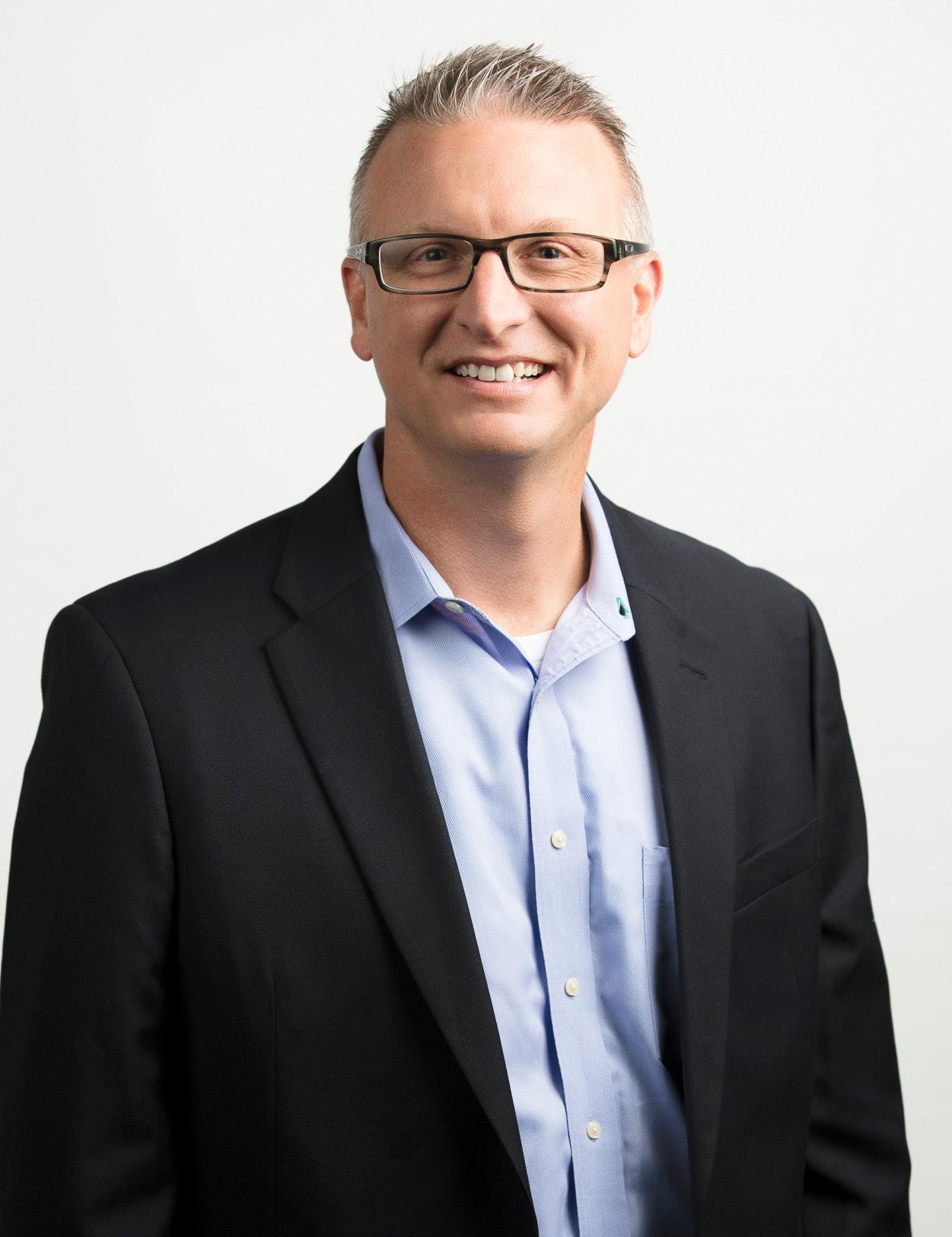
Incorporating practices of inclusion into financial planning outreach also means being aware of nuances within the Latino market. For example, Navarro, Morris, and their colleagues must acknowledge the technological preferences of the rapidly ballooning youth demographic while also realizing that older Hispanics tend to be more comfortable in an in-person setting. “This requires us to really work to understand our customers’
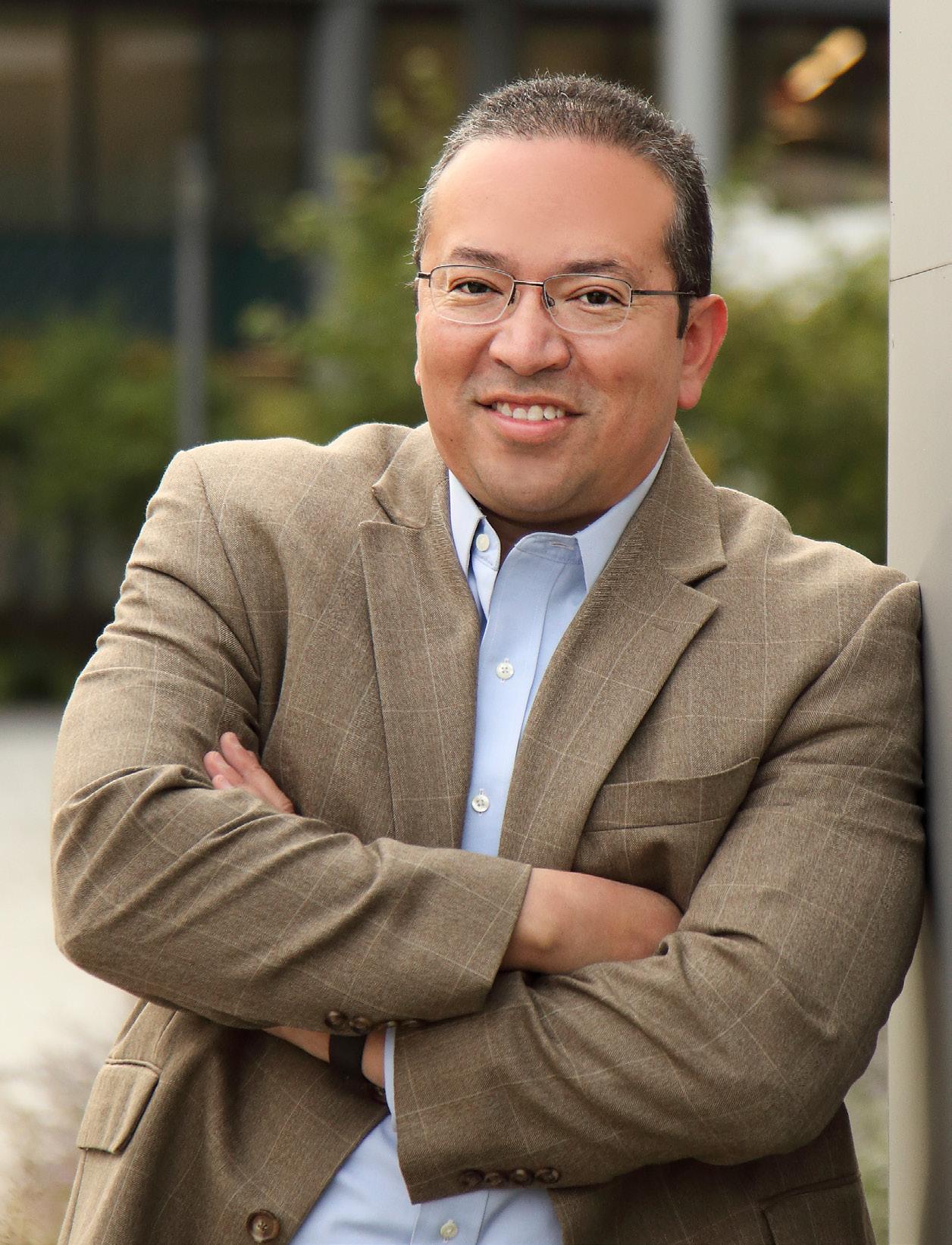
problems, their needs, their behaviors, and their motivations,” Navarro emphasizes.
Both executives acknowledge that the COVID-19 pandemic has resulted in significant change, but with respect to their own work and in regard to the needs of their customers. “The Latino population has been disproportionately impacted over the last seven months, more than any other segment out there, and they need confidence,” Navarro explains. “One way we can provide that is connecting them to education, in their language, and on topics that make sense for their own lives. We’ve been leaning hard into that effort during this time.”
Among Principal Financial’s most important resources, Morris says, is its award-winning Principal Real Start program,
which provides the groundwork and a path for those beginning their paths to saving—even in stressful and uncertain times.
“Principal Real Start’s infrastructure is particularly geared toward the Latino community, including in its language selection,” Morris says. “But we’ve also changed the process in a way that meets the needs of our Latino community. It’s not just about language. It’s about cultural differences. This part of a person’s life is a critical fork in the road for our future selves.
“Saving money is not very sexy,” he continues with a laugh, “but saving money for retirement is really paying your future self.”
Navarro underlines Morris’s point. “Enrolling in your first 401(k) is one of those moments of truth,” he says. “It’s one of the most impactful decisions a person can make for their future.”
Kevin Morris and Carlos Navarro have a deep appreciation for the leaders and colleagues who have helped shepherd them in their careers. “In twenty-plus years, I’ve had twenty-nine bosses,” Morris remarks. “What I’ve learned is that once you think you have the answers, you’re in trouble. Our team learns a lot from each other, and that’s the way I like to lead.”
For Navarro, who spent a fair number of years without a proper mentor, the environment that Morris has cultivated at Principal Financial Group is invaluable. “Kevin builds teams that help each other,” he says. “He empowers everybody. It had been a long while since I had really been able to fill that mentor void, until I started working with Kevin.”
“Our purpose as an organization is to foster a world where financial security is accessible to all.”
— KEVIN MORRIS
“The Latino population has been disproportionately impacted over the last seven months, more than any other segment out there, and they need confidence.”
CARLOS NAVARRO
ALVARO LUQUE ISN’T THE ONLY REASON that avocados have become a mainstay of your grocery shopping list, but the timing is peculiar. The president and CEO of Avocados From Mexico (AFM) launched the company’s Mexican-United States partnered program in 2014—or, more specifically, at the exact moment when the population of the United States collectively realized there was an avocado-sized hole in their lives. “We have the third-biggest country in the world in the United States, which is 100 percent in love with avocados,” Luque says. “And we have the number one avocado exporter in the world in Mexico, which is really the only place that can supply that demand. It’s a perfect match.”
But that doesn’t answer the most pressing question. A company doesn’t automatically create a demand for its product just by being launched. So how, of all things, does a produce marketing company of thirty-four people set the table for the biggest “new fruit” craze since the wars waged over pineapples?
“Our goal from the very beginning has been to break the produce mold,” Luque says. “And I think we’ve done a pretty good job so far.”
Now, more than ever, avocados are on every table. You can thank Avocados From Mexico’s CEO Alvaro Luque.
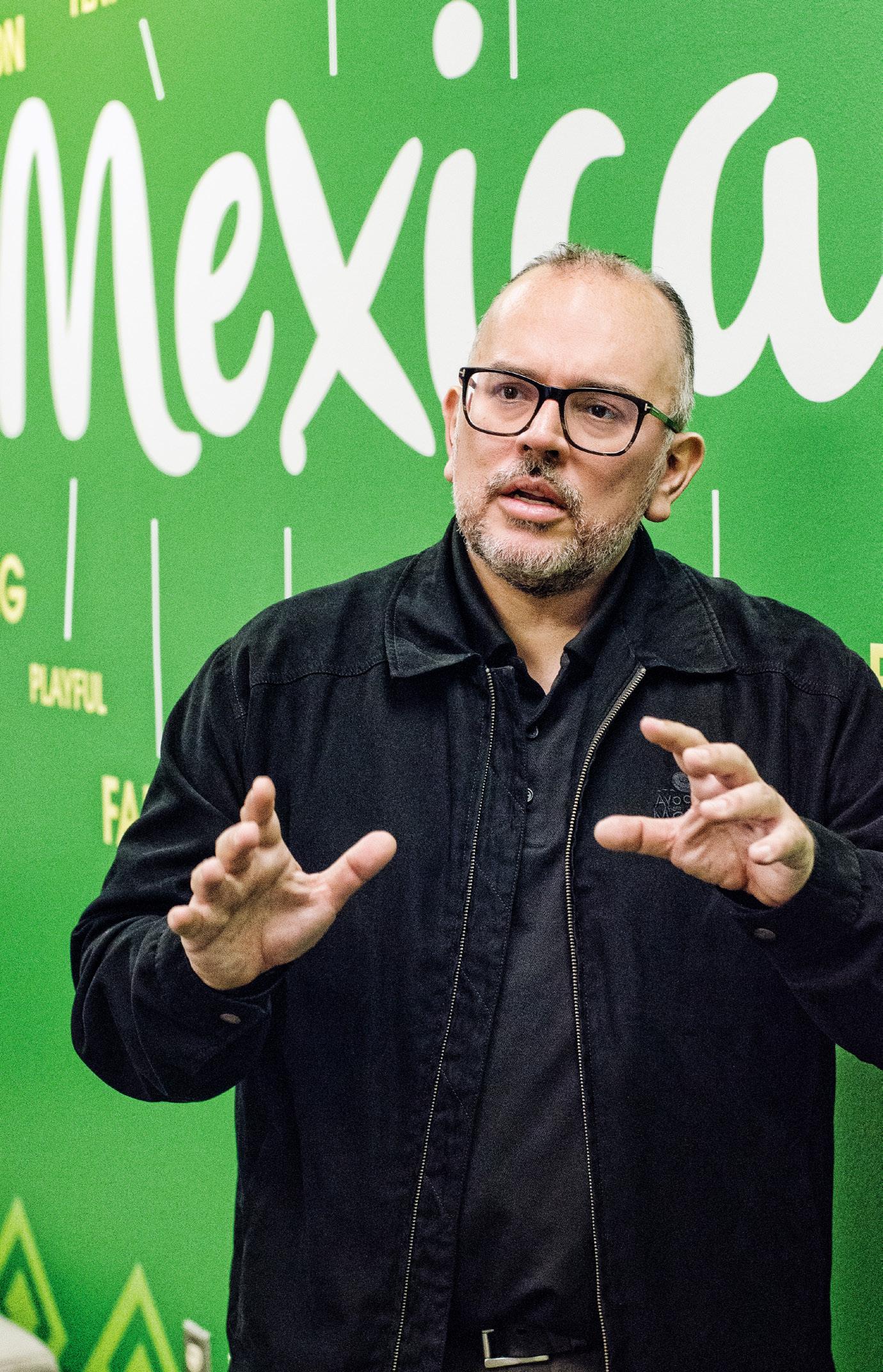
Selling produce wasn’t Luque’s first idea for the next big move in his career. The marketing director for numerous Latin American and US arms of GRUMA and Mission Foods had built out an impressive international career, always finding himself the youngest executive in the room. “I started working in the corporate world while I was still in college,” Luque says. “I was twenty years old and was in charge of twenty people.” Luque moved early and often within GRUMA, seeking out new leadership experiences all over Latin America, building out his leadership skills, and honing his marketing abilities to a razor-sharp edge.
When it came time to move outside the organization, Luque was a bit surprised about the job being offered. “I couldn’t believe there was any sort of marketing in produce,” the president recalls. “But when I learned about this experimental checkoff program based on a partnership between two international associations, I found it fascinating.”
Luque came on board AFM in January 2014, and by May he was proposing to the
“We have the third-biggest country in the world in the US, which is 100 percent in love with avocados . . . and the number one avocado exporter in the world in Mexico. It’s a perfect match.”
executive board that the company should go big or go home. “I thought we should be in the Super Bowl,” Luque says. “You weren’t seeing produce brands advertise there, and it was the most-watched television event of the year in the United States. We thought we could actually stand out despite being such a small company compared to the AnheuserBusches or the Coca-Colas, who were also running ads.”
That “crazy” idea has paid off six-fold. The brand that didn’t exist ten years ago has been in the top two of the Merkle Digital Bowl Report every year they have advertised, including the number one spot in 2018. “It feels like we’re the one who keeps winning the Super Bowl,” Luque jokes.
Luque’s big ideas have continued to help avocados find their way into homes across the US, from Seattle to Fort Lauderdale. AFM took on the heavies yet again at the Macy’s Day Parade in 2015 and had a higher digital spike than the namesake of the parade. Adweek has called AFM one of the most dramatic and impressive rises in marketing history. By making smart decisions, wise gambles, and thinking outside the produce crate, the company of thirty-four has earned itself a seat at the table next to industry giants like Procter & Gamble and Amazon.
AFM has also been recognized by Fast Company as one of the Top Workplaces for Innovators, proving just how much of an impact each employee at AFM has been
THE NUMBERS:able to make in recent years. But as Luque explains, AFM’s focus is about far more than just being seen as a forward-thinking and agile company—in the course of fueling American’s love for the healthy avocado fruit, the company has built a unique and mutually beneficial bond between the United States and Michoacán, Mexico.
According to Luque, the export of avocados from Mexico to the United States has generated economic output in the US as well as jobs in Mexico. “We have almost thirty thousand growers in Michoacán alone,” Luque says. “Most growers own less than five acres. These are many small farmers, and we’re able to help feed and fund thousands of families with this partnership.”
The economic opportunities created by AFM have led to a drastic cut in undocumented emigration from the state of Michoacán and have provided thousands of families with the opportunity to make a life for themselves in their country of origin. In the United States, which sources nearly 90 percent of its avocado supply from the orchards of Michoacán, both national and state economies have grown significantly. In 2017 alone, US imports of Mexican avocados added $5.5 billion to the national economic output and created more than twenty-eight thousand jobs.
If this is what AFM has done with thirtyfour people and one driven president, there’s no limit to the growth and green the company can bring to many, many more in Mexico, the US, and abroad.


From versatility to deliciousness, there are plenty of reasons to love Avocados From Mexico. Especially since Mexican avocado imports have contributed to the American economy by creating more than 28,000 jobs in the US, $1.9 billion in labor income and over $900 million in (US) taxes.*

Looking ahead, we can expect these economic effects to continue— which means more jobs will be created, and the industry will continue to support national and state economies.
Avocados From Mexico is truly breaking through the produce industry as it drives the American economy forward.

BY NOW, PELOTON HAS BECOME A household name—thanks, in part, to a 2013 Kickstarter campaign that introduced its exercise bikes to the world. But Peloton is so much more than a sports equipment distributor. The company has changed consumer behavior and disrupted the industry by charging a monthly subscription fee for access to livestream and on-demand classes that work with its product. Thirty thousand riders signed up in less than two years and, as of September 2020, the company had 3.1 million members and a market value of $26 billion.
What seemed like an overnight success story shocked most consumers, but Cristina Fernández and the research team at Telsey Advisory Group (TAG) saw it coming. Fernández has her finger on the pulse of emerging brands and technologies: each day, she talks to leading executives, scours social media platforms, and devours online news to uncover how products are changing and where brands are going.
At TAG, it’s all in a day’s work. Fernández is a managing director and senior equity research analyst at the advisory firm. She
leads a world-class team that tracks homeware and athletic brands like Nike, adidas, Bed Bath & Beyond, Williams-Sonoma, RH, and Peloton. “We’re looking at corporate strategy and consumer trends, and we’re also watching for the next wave of disruptive companies that are about to go public. We want to make discoveries early and get ahead of the curve,” Fernández says.
Fernández and her team interpret current events and news to forecast where brands and industries will go. Then, they build complex financial models and develop detailed analytics that predict sales and earnings. That information goes to TAG’s clients—mutual funds, hedge funds, and real estate owners who are making investment decisions based on Fernández’s research.
Billion-dollar fund managers have come to trust Fernández’s work because she’s earned a reputation as a respected leader within the finance industry. To her mind, a quality education is what put her on such a solid career path. “My family placed a lot of emphasis on the value of a good education early on, and that has anchored everything I’ve been able to do,” she explains.
Cristina Fernández leverages her deep financial experience to predict the future of e-commerce and consumer retail
Fernández is the second of three children and was born in San Juan to a Puerto Rican father and Cuban mother. Both of her grandfathers were doctors, and her father was a small business owner with a marketing background. As a junior at a top college preparatory high school, Fernández accompanied some classmates on a tour of college campuses in the mainland United States. That’s when she fell in love with Washington, DC, and decided to apply to Georgetown.
Although Fernández didn’t grow up in a connected Manhattan family or have any connections in the financial world, a Georgetown degree helped her open doors in finance. She started her career at Arthur Andersen, where she helped audit healthcare, nonprofit, municipal, and real estate clients.

After honing her skills, Fernández climbed the ranks as a senior associate at PricewaterhouseCoopers before moving into equity research for UBS in 2004. Along the way, she participated in an international exchange program at the London Business School and completed a full-time MBA at the NYU Stern School of Business through a fellowship from the Consortium for Graduate Study in Management.
At each stop, Fernández committed herself to logging hours, developing skills, and building relationships. “You have to work your way up in finance,” she says. “There are simply no shortcuts. You acquire the skills through the experience of the day-to-day work.”
UBS, a multinational investment bank and financial services company, hired Fernández to work in its aerospace and defense
“We want to make discoveries early and get ahead of the curve.”Hispanic Executive
investment research group. The difficult assignment required her to learn a technical industry and develop new expertise. She succeeded by relying on experienced mentors and participating in a structured training program that she credits with preparing her to step into leadership at TAG.
Fernández joined the growing Telsey organization in 2011. And although the move required her to learn yet another industry—consumer retail—she says she’s been able to turn each previous experience into an asset. “At the end of the day, an equity research analyst is the same role regardless of industry,” she says, “but having a varied background helps me see the bigger picture and understand factors that impact every company.” With that foundation, a good analyst can dig deeper into his or her specific industry.
TAG’s equity research teams are small, which allows each one to stay agile and maximize its efficiency. Fernández helps manage a team of four employees and tries to maintain a collaborative, authentic, and engaging atmosphere. “I want everyone on my team to have the same growth opportunities that I’ve had throughout my career,” she emphasizes.
The efficiency and efficacy of Fernández’s team is more important than ever, as big things are currently happening in the consumer retail space. Brands that were previously digitalonly are now opening physical stores, just as flagship mall mainstays are shrinking back. Companies are trying things like curbside delivery, virtual appointments, and cashless payments. Players both big and small are examining every factor in consumer behavior, from BOPIS (buy online pickup in store) to social media usage. As companies maneuver to position themselves in the market, avoid passing fads, and double down on lasting trends, Fernández and her team will keep TAG clients in the know so they can reap the rewards.
Editor’s Note: Telsey Advisory Group (TAG) does not have holdings in any securities covered by TAG. No TAG research analyst has any holdings in any securities covered by the analyst. TAG research analysts do not receive compensation from subject companies. TAG provides investment banking and other non-investment banking securities-related services, and non-securities services, and may seek such relationships from companies about whom it provides research. TAG, its employees, and their households have no other conflicts or potential conflicts of interest. TAG has acted as a manager or comanager of a public offering of securities by Peloton Interactive Inc in the last twelve months. TAG received compensation from Peloton Interactive Inc. for investment banking services in the last twelve months.

Allyship can take many forms, including D&I initiatives, mentorship, and outreach to underserved communities

68 Jennifer Mancuso, North Highland
72 Jennifer Soliman, Diamondback Energy
75 Yau Cheng, BNY Mellon
Growing up, Jennifer Mancuso sat at a dinner table filled with guests from all over South America. Today, as a VP at North Highland, she forwards a leadership style and mission driven by that experience.
BY BILLY YOST
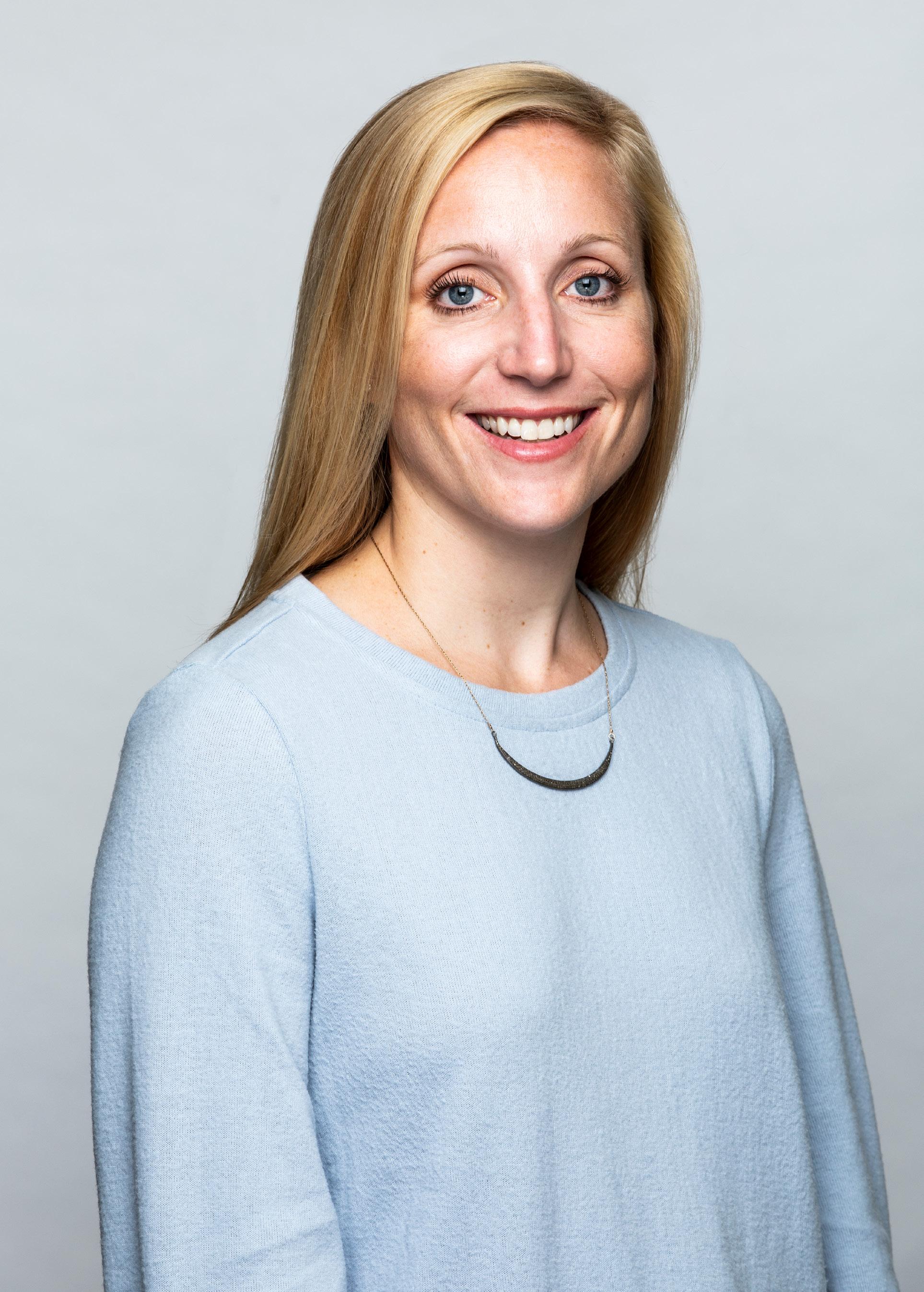
Her father’s job kept him coming and going from South America, often with colleagues in tow. “The culture at my father’s company mixed well with our family; instead of having those business meetings in a restaurant, he would bring people home to dinner with us,” Mancuso remembers. This provided a steady stream of new faces, new cultures, and new stories, and a family-like environment bolstered by her father’s fluent Spanish. “His clients would show us pictures of their families and where they were from,” Mancuso says. “They would always bring gifts for my mother. That’s something I never forgot.”
Mancuso’s father taught all his children how to welcome guests, thank them, and say goodbye in their native language. Building on that foundation, Mancuso continued to study Spanish all through her school years, and even majored in Spanish at Wake Forest University.
Her love of Hispanic culture would eventuate in her living in both Spain and Mexico, the latter experience organized through the Amigos de los Americas program. Through that program, Mancuso spent a summer in a farming village in the middle of Guanjuato, working with children and families to dig latrines and educate the rural populations on health and hygiene. Later, during her time in Spain, Mancuso was able to further hone her Spanish skills.
Ever since she returned home from her travels, Mancuso has sought a way to be of service to the
culture and community that has given her so much. The HR expert spent the past sixteen years working on behalf of Hispanic workers in a number of different industries, ensuring fair treatment, safe working conditions, and fair pay for what are often the most physically demanding roles. Now, as vice president of HR at managing consultant firm North Highland, Mancuso is aiding the fight to place more diverse talent in senior roles.
Mancuso’s first consulting role was with an international fast food chain. “I went to tomato farms in Florida and visited with individuals on the migrant circuit. I went to slaughterhouses in Texas where upwards of 70 to 80 percent of the workforce was Hispanic. So much of that work is hourly labor and requires a lot of effort,” Mancuso says. “The job gave me the opportunity to make sure people were treated fairly by the companies they were working for.”
And Mancuso had her work cut out for her. There were immigration issues. There were discrimination issues. Mancuso interviewed 20 percent of the workforce, gathering a clearer picture of what working conditions were really like for employees.
“It was important to me to highlight these situations so people didn’t have to fear retribution,” Mancuso says. “I hope that I was able to help people achieve better outcomes in their professional and personal lives.”
For as long as she can remember, Jennifer Mancuso has been a student of Hispanic culture.
It’s been a busy year of adjustment for Mancuso at North Highland. A great deal of her HR work has been centered on inclusion and diversity work—phrased that way intentionally. “I say ‘inclusion’ first and ‘diversity’ second because we feel like you’ve got to establish an environment that’s welcoming and inclusive to talent first,” Mancuso explains. “If you don’t have an inclusive environment, you may attract diverse talent, but they’re not going to stay. But if people are able to bring their particular cultural background and authentic selves to the workplace, it creates a better environment for everyone.”
In the past six months, the North Highland Inclusion and Diversity Committee has issued a new charter with action-oriented approaches to its I&D initiatives. “We’ve really focused our initiatives around creating communities within our business that help create a sense of belonging,” the VP says. “We want our people to stay and grow here.” Numerous employee resource groups have been established, including groups for Black employees, women, parents, the LGBTQ+ community, and veterans.” Mancuso says the push has helped North Highland feel confident in its own cultural building, and that they can take the lessons they’ve learned to their clients.
Already, these efforts have paid off, garnering attention from other leading organizations such as Principal Financial Group. “We commend Jennifer Mancuso and North Highland for their commitment to inclusion and diversity in the workplace. Congratulations on this recognition, with best wishes from your partners at Principal,” says Kevin Morris, vice president and chief marketing officer for retirement income solutions.
But Mancuso knows that the goal isn’t anywhere near complete. “It’s time for us to tackle how we think about diversity in a way that carves career paths for people,” Mancuso says. “Historically, the consulting industry has not been as diverse at the upper levels of organization. How can we be a firm that changes the game, that welcomes diverse talent and grows them into future leaders?”
Mentorship is a passion point for Mancuso precisely because it’s a fundamental building block in the process of cultivating future leaders. “I am a person that seeks out mentors and actively looks to others to help form my approach,” she says. “But I’m also one of those people that is driven naturally to lead others on their own path to leadership.”
Whether leading or following, Mancuso remains committed to the fight for increased representation. After all, she knows firsthand just how much another culture can positively impact a person’s life.
Jennifer Mancuso says that one piece of advice paid off again and again in 2020, despite it being a year full of new challenges. “You’ve got to learn the business first, as an HR person,” Mancuso says. “We may lead with our hearts, but before we try to influence the way a company approaches its practices or policies, we’ve got to understand how it works.
Every time I’ve switched roles, I spend those first ninety days listening, learning, and absorbing everything I can.”
At Principal, we’re committed to providing an inclusive approach to financial wellness. Through our deep appreciation of values and culture, we’ve developed Principal Hola Futuro to ensure we’re prepared to meet the savings education needs of the fast-growing demographic of Hispanic business owners and their employees. This holistic, bicultural approach goes beyond translation to provide a culturally focused, relevant, and easy-to-use solution to help this group start planning for a more certain future. Not only have our business ethics led us in this direction, so have the demographic trends shaping the future of business and finance.
“If you don’t have an inclusive environment, you may attract diverse talent, but they’re not going to stay.”
IF THERE’S ONE WORD THAT’S COME TO DEFINE
Jennifer Soliman’s life and career, it’s “service.” Today, Soliman is executive vice president and chief human resources officer at Diamondback Energy, a large oil and natural gas company operating in Texas’s fertile Permian Basin. She has also long served as a board member at the Jones Business School of Rice University for Rice Business Partners.
Throughout her career, Soliman has had countless outlets to serve those around her, and she’s developed a passion for connecting people with their own inner light and mentoring the leaders of tomorrow. Here, the sought-after executive, board member, and career coach shares her top advice for today’s rising stars.
“Everyone ready to grow needs a mentor,” Soliman says, “someone who will tell you the truth and not just compliment you but discuss your opportunities to improve.”
She’s had many beloved mentors in her own life, both when she was a young girl participating in the youth development program known as Girls in Action and as a leader at global, large-scale companies such as Koch Industries and BP.
But while Soliman has enjoyed many formal and informal mentor relationships over the years, she’s also learned a lot from the mentors she’s never met: her favorite authors.
“So many young people tell me they can’t find a good mentor, and think it is holding them back. Don’t let it,” she emphasizes. “Always remember that a good mentor is as close as your internet or bookstore. With the internet, you can learn from many mentors, all at the same time. Learn from their expertise in a particular focal point, then move on to the next. The best leaders in the world can be your personal guide through a book.”
Soliman cites Zig Zigler and Dale Carnegie as her childhood favorites. For anyone interested in an analytic perspective, she suggests reading Malcolm Gladwell’s work, Outliers: The Story of Success
Good mentors helped Jennifer Soliman reach the top of her field. Now, Diamondback Energy’s CHRO shares her advice for those just setting out.
“Mentoring is an essential element of how we learn from each other. When you couple this with diverse participants, then you really have something powerful. Once you realize that the benefits of mentoring and diversity are a two-way street, it becomes a natural part of you. We all have something to learn from each other.”
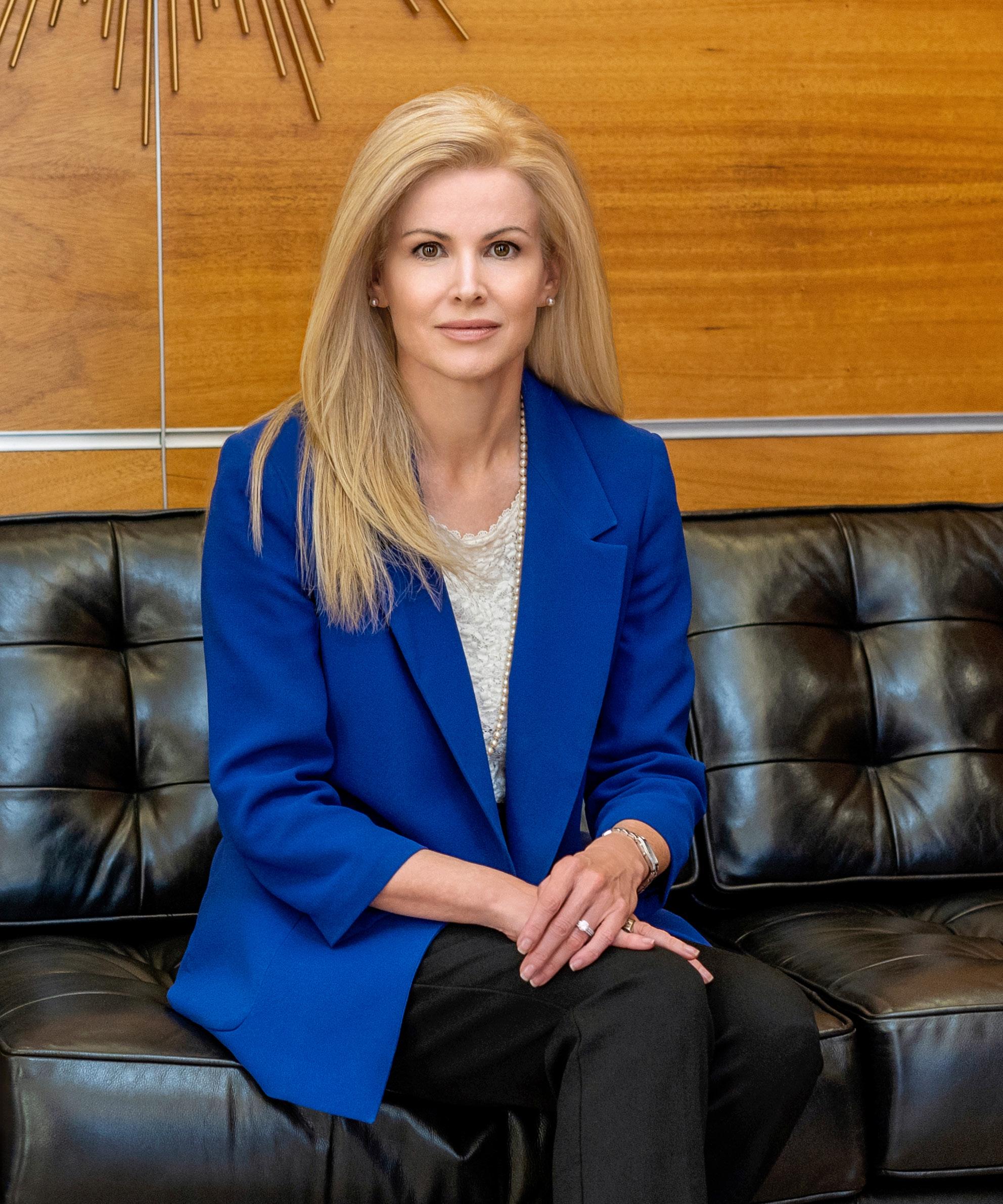
A career in HR and compliance has taught Soliman the importance of clarity. Those who succeed, she says, set goals that are achieved through a wellexecuted plan. Those who fail often confuse goals and plans, giving up after a setback to their plan.
Some people know Soliman as Diamondback’s CHRO. Others know her from various executive and leadership roles she’s held in her career, or from her board service at Rice. Still others know her as a past advisor to the board of directors for the Hispanic Chamber of Commerce. No matter what role she’s held, Soliman has enjoyed talking with others about their goals.
“When choosing your goal, set your sights high and broad on a set of capabilities you want to grow into to fulfill your life’s purpose,” she says. “Consider who you are becoming. What capability do you want to develop and offer to the world? What contribution do you hope to enjoy making? Focus on answering those questions, and you’ll go far.
“Next, your plans are tactics for how you’ll reach your goal, and your plan should change as you learn, develop, grow, and get a new vantage point,” Soliman continues. “Love your goal. Hang on to your goal. But be willing to change your plan.”
At the age of eighteen, Soliman enlisted in the Air Force Reserves and took a vocational aptitude test that returned surprising results: she was qualified for a sign-on bonus as a sheet metal mechanic. She accepted the position and soon the young, patriotic Soliman found herself in a military technical training school as the only woman in her program.
She had arrived at the school full of enthusiasm, dreaming about the future. However, it didn’t take long for Soliman to realize the magnitude of the challenge before her. But while others may have quit, Soliman decided to stay.
In doing so, she found her strength. “I had never faced a challenge even close to this difficult, but somehow I would wake up each day and try again. Day by day, I would decide that failure was simply
not going to be an option,” she explains. “Ever since graduating from the school, I’ve had the confidence to believe in myself and know that with hard work and perseverance, obstacles will fall away in the end.” Soliman draws on these experiences when advising others who face adversity.
Soliman has helped unlock the potential in those around her through one-on-one coaching, group mentoring, in-person meetings, and phone consultations. Some mentor relationships last many years, and others last only a few sessions. No matter the length of the relationship, Soliman offers the same advice. “As you grow, never forget to reach back a helping hand to someone else. Yet remember, growing is hard and does not generally feel comfortable. Not everyone is at a stage in their journey where they are interested in evolving.”
Soliman has had many opportunities to serve those who do wish to grow. One of Soliman’s contacts is a director at the Jones School at Rice University, where she obtained her MBA. In addition to helping drive the connection between the Jones School and the business community, Soliman also mentors students (including many Hispanic students) sent to her by the director. Some students need help with their résumé, some want general career advice, and others come prepared with specific questions.
“I love helping students to believe in themselves, to see their inner strength,” she says. “I try to quickly establish trust that my agenda is simply to see them shine—then the walls come down, and we can get to work discussing their growth opportunity.”
Life, Soliman notes, is fulfilling when you serve along the way.
“Love your goal. Hang on to your goal. But be willing to change your plan.”
FOR YAU CHENG, GLOBAL HEAD OF DIVERSITY and inclusion at multinational financial services company BNY Mellon, allyship is all about taking actions that create positive change. But it has to come from a place of honesty, openness, and decentering herself from the conversation. “I’ve learned not to assume I know the answer, or that the same form of allyship will work for all people,” she says.
This principle, along with many others, informs her work creating diversity and inclusion (D&I) initiatives that benefit Latinx workers and customers in New York City, where BNY Mellon is headquartered. There, Cheng leverages her expertise to create value for the company through broader measures and to build the best global team.
In an increasingly diverse world, BNY Mellon wholeheartedly believes the best team is a diverse team, Cheng says. “Our differences enable each of us to make unique contributions, to bring something no one else can to the table. If we can unlock the power of our diversity, we can hone our competitive advantage—as individuals and as a company.”
Cheng herself knows the importance of these values. “I was the prototypical child of immigrants,” notes the D&I expert, who moved to the US from Taipei, Taiwan, when she was two years old. She didn’t start learning English until she was six years old, and there was no English as a Second Language class where she grew up. So in school, she was separated from the rest of the class and placed in

groups that included children with learning or behavioral problems.
As such, Cheng has always strove to foster a sense of belonging for herself and others in her work. “Being an immigrant is so embedded in my identity that without purposefully thinking about it, I can almost overlook it,” she muses. “But it absolutely shapes my career choices.”
That unique background and set of experiences serves her well at BNY Mellon, where she approaches D&I measures in a very strategic way. “We think about D&I from all points of view—the client, the talent, the investors, the stakeholders, the regulators,” she explains.
Much of this work requires the company to work directly with New York’s vibrant Latinx community, with which Cheng communicates closely. She appreciates the diverse, dynamic make-up of NYC’s Latinx neighborhoods, which encompass a wide range of cultural, linguistic, economic, and racial differences. “When I attended my first Latinx talent conference, it was eye-opening to see so many faces that look like me,” Cheng confesses. Since then, she has spoken to and found common ground with several people who identify as Asian Latinx.
To offer opportunities to these communities, Cheng works closely with organizations like the Association of Latino Professionals for America (ALPFA) and the Alumni Society to create equitable opportunities and access to financial services careers for Latinx students as well as experienced professionals.
She also has the privilege of working with inspiring, passionate Latinx colleagues across BNY Mellon’s businesses, who voluntary take on extra responsibilities to champion diversity and inclusion and drive change. Cheng and her team partner closely with BNY
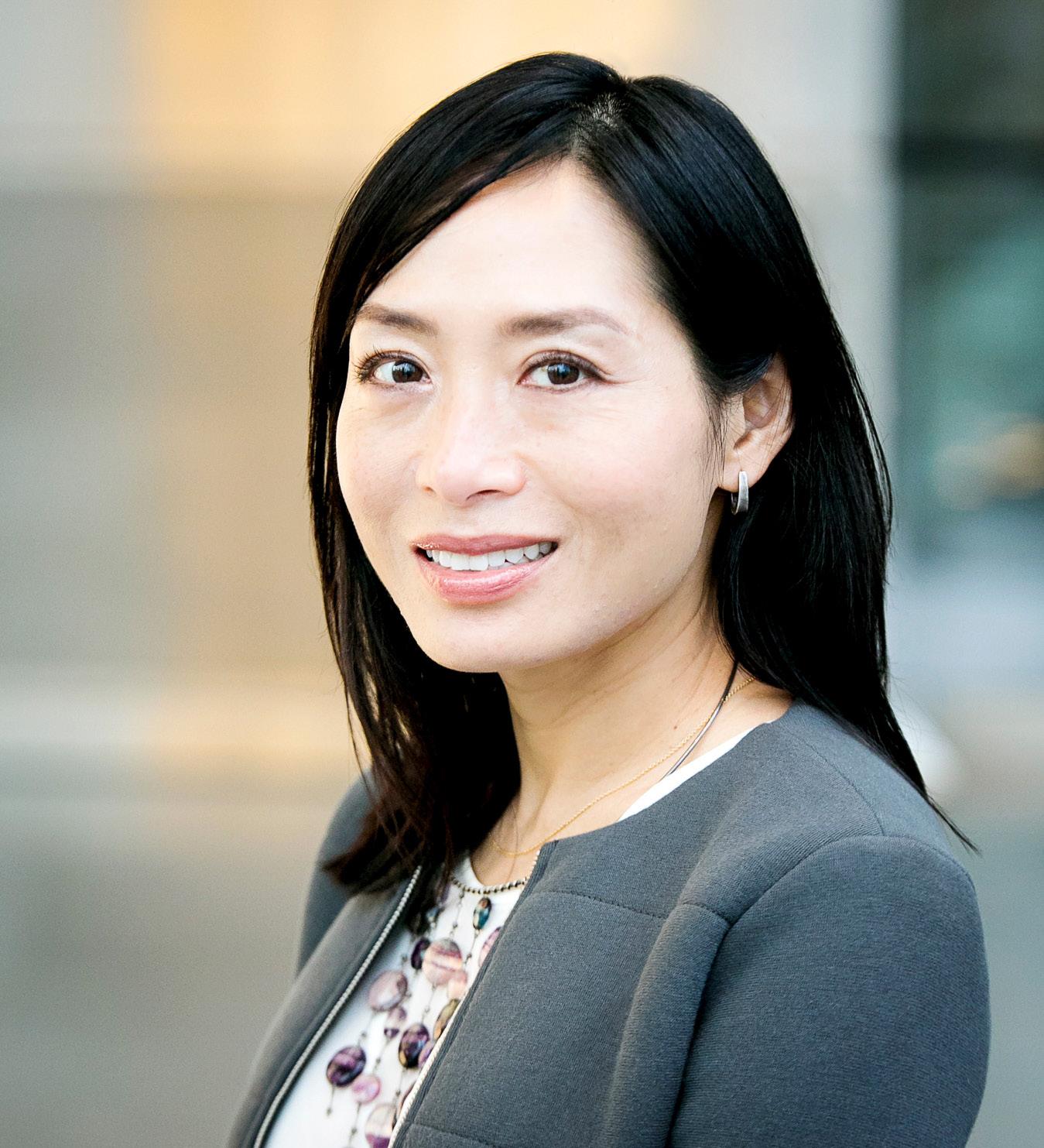
Mellon’s employee and business resource groups (E/BRGs).
One of those groups is IMPACT, the multicultural E/BRG that leverages cultural diversity for better employee and client outcomes. Within IMPACT are several leadership groups that help amplify the views and voices of the largest underrepresented ethnic talent groups at the bank—one of which is the Latinx Leadership Forum, which helps Cheng and others understand the Latinx talent experience and how to better attract, advance, and retain top Latinx talent.
The results of these initiatives have been encouraging—IMPACT has seen a 25 percent increase in membership in 2020, a historic high. And in the wake of the COVID-19 pandemic and the social unrest following the deaths of George Floyd, Breonna Taylor, and others, Cheng and her colleagues have had myriad opportunities to network and connect with others who need to discuss these issues with allies as well as with other members of their communities.
As a result of this work, Cheng has had to think a lot about what it means to be an ally and what the best ways are to demonstrate allyship in one’s personal and professional life.
The first priority for an ally, to her mind, is to commit to understanding, which “will drive
the right actions and behaviors.” Many times, allies will step in to help without knowing the true needs of the populations they want to help; McKinsey’s annual study of women in the workplace actually found a stark disconnect between the behaviors women found helpful from male allies and the actions male allies thought would be helpful to women.
After that, Cheng says, the two most important priorities are to be an “active ally” and a “consistent ally.” Allies must put in the work to help members of underrepresented communities, she emphasizes, and not just do so when it’s convenient. “And the ally benefits, too,” Cheng notes, “as allyship builds authenticity, trust, and inclusive leadership.”
Of course, Cheng doesn’t pretend that these are the only pathways to becoming an effective ally. “What the times we’re living in have shown us is that allyship is more about listening and learning than having all the answers,” she says. And in the business world, particularly for multinational institutions like BNY Mellon, it’s more important than ever to build and support a workforce that represents the populations it serves. Cheng and her team work to help BNY Mellon strive to do that with authenticity and integrity, building diversity and inclusion into the very fabric of the business.
“What the times we’re living in have shown us is that allyship is more about listening and learning than having all the answers.”

In a time unlike any other, these Latinas have stood out from the crowd. As innovators, visionaries, and community advocates, they show us what it means to lead.

CONVERSATIONS AT THE TOP WITH RUBEN NAVARRETTE:

 BY RUBEN NAVARRETTE / PORTRAITS BY JUSTIN COIT
BY RUBEN NAVARRETTE / PORTRAITS BY JUSTIN COIT
YJessica Alba. Not really. Maybe you know Alba as the thirty-nine-year-old actress and creative producer who was born in Poloma, California. She won an acting/modeling competition at eleven that earned her an opportunity to audition for Hollywood agencies, and she was landing parts in movies and television shows by twelve. Alba has starred in more than a dozen films that have collectively grossed more than $1 billion at the box office, including Valentine’s Day, Machete, and Fantastic Four —where she met her husband, a Yale-educated producer and entrepreneur named Cash Warren.
Alba has also landed on the small screen, recently starring alongside Gabrielle Union in LA’s Finest, which debuted on Fox and for which Alba also serves as an executive producer.
But there is so much more to Alba than her Hollywood career.
In the past decade, Alba has built a thriving “side-hustle” that established her street cred as a farsighted entrepreneur and successful businesswoman. In 2013, she published her New York Times best-seller The Honest Life: Living Naturally and True to You, which details her journey is trying to create a natural, nontoxic life for her family.
And, in what she likely considers her most important role, she is the mother of three young children: daughters Honor, twelve, and Haven, nine; and son Hayes, three.
As a father of three, I give Alba and Warren my vote for Parents of the Year. They are old-school, hands-on, no-nonsense parents who set expectations, establish boundaries, and teach their kids to take responsibility. In an interview with Reveal Magazine, Warren, fortyone, said, “One thing that Jessica and I are 100 percent aligned on is that we’re not raising a—holes.”
I asked Alba why she thinks it is so important that she and her husband raise their kids to be good humans.
“My kids are more privileged than I was growing up, but I still work to instill the same values,” she said. “It is important that they learn to be self-sufficient, learn what it means to contribute and be part of a family unit. I also want to teach them to respect and appreciate what they have. By setting the table for dinner, cleaning up after meals, and keeping your room straight, you gain a sense of responsibility and pride you wouldn't otherwise have.”
For Alba, parenting is serious business. Literally. It was a major part of the inspiration for her side-hustle: the Honest Company, the wildly prosperous consumer goods company she cofounded in 2011 along with Christopher Gavigan. The company started with only a handful of baby and household products, and now it
She may be a Hollywood star and the cofounder of a $1 billion company, but few know who she really is and what she really stands for
offers a host of cleaning, bath, body, and beauty products as well as baby clothing and diapers. In 2015, it was speculated that the Honest Company was valued at more than $1.7 billion. Alba reportedly owns between 15 to 20 percent of the company, and her net worth is estimated to be more than $350 million.
Two things drive this story: the fact that Alba was a self-described “sick kid” who grew up with asthma and allergies, and the fact she eventually became a parent, which led her to scrutinize products that parents and babies come into contact with.
One day, while pregnant with her first child, Alba was washing onesies with a detergent specifically made for baby clothes. She broke out in hives, and worried that the same thing could happen to her unborn baby. She began investigating the contents of the products that we all bring home with us and, in 2011, lobbied Congress about the harmful chemicals commonly found in household products.
Meanwhile, Alba was also trying to gather support for an idea that was just ambitious enough to grow into a billion-dollar company. She wasn’t having much luck. Undeterred, she found her way to Gavigan, and later to two more partners, Brian Lee and Sean Kane. With the team in place, everything else became clear.
I asked Alba what advice she had for other aspiring entrepreneurs who are starting down this road with little more than an idea.
“My most important decision was finding the right business partners,” she said. “You can’t do it alone. There is no way. Also, set realistic goals. Try not to have goals that are too lofty or out there. When you have goals you can achieve, you get things done.”
The Honest Company gets things done. Over the past three years, Alba has partnered closely with current CEO Nick Vlahos to grow the business. And, in the last year alone, the company has seen a 20 to 30 percent growth rate.
Elsewhere, parenting is now a cornerstone of Alba’s brand. In fact, Disney+ is about to send her around the world as the executive producer and host of an upcoming docuseries with the working title Parenting Without Borders
“My grandparents are really humble. They never showed off, even though my grandfather accomplished so much and my grandmother was an incredible, talented artist, singer, dancer, all of that—and she can paint, and she can sketch. She was amazing. They loved being on stage, and it sounded like—just from hearing their stories—that’s where they really shined. They still talk to me about it. I’ve gone and visited the spots where those shows were held. [To them], that was the best time of [their] lives. That was always in my blood, always part of my performing.”
If Alba has a flair for parenting, she may have picked it up from watching her own parents. Mark Alba and Catherine Louisa Jensen met in California as teenagers and fell in love. Jessica soon followed.
The Alba family is a cultural stew. Catherine’s ancestry stretches into Denmark, England, France, and Germany. Alba’s father can trace his roots back to Mexico, but his parents were born in California. It was Mark’s grandparents—Jessica’s great-grandparents— who were immigrants from Mexico. Three of them came from Zacatecas, one from Durango.
Alba—who resembles her father and carries his surname—speaks lovingly of her family.
“My dad’s family, they’re Mexican American,” she said. “Their culture and community revolves around that, and we have so many relatives in Southern California. I lived in the city that my grandparents grew up in and my dad was raised in. We lived with my grandparents on and off. They had a big imprint on my life.”
In fact, Alba’s grandparents were the ones who introduced her to acting. “My relatives were part of this incredible performing arts playhouse,” she explained. “It was also a theater where they would bring all the traditional Mexican folklore stories and act them out. They would do plays, and they would sing and dance.
“My grandparents were stars at the playhouse,” Alba continues. “My grandmother says that’s where she fell in love with my grandfather. I was raised around that.”

“For me, I could leave behind who I was. I was a very sick kid. But thanks to acting, I could be anyone. I didn’t have to be just a sick kid who was in the hospital all the time—I got to be a superhero. That, to me, was so liberating.”
“I was taught, ‘Don’t complain. Work really hard. Don’t be a show-off. Don’t think that you need to flaunt your stuff. Just keep your head down, keep it moving, and stay focused on your goal.’ That discipline is why, I think, I figured out how to navigate my way through Hollywood and avoid a lot of the stereotypes and the stigmas that are attached to Latinos in Hollywood.”

Of course, Alba was also raised on stories about her family’s heritage and its impact on their lives in the United States. “You can ask me about racism and segregation in California,” she said. “When my dad was little, my grandfather explained, ‘No, we’re not allowed to go into that bathroom,’ or 'We can’t drink from that water fountain.’”
I was curious if Alba sees herself as a Latina or a person of color.
“Both,” she said. “I hate the word ‘Hispanic’ because it feels like a white guy lumping together people who speak Spanish. ‘Latinx’ feels the most modern now. I definitely feel like I’m part of the Latinx community. But I always probably identified with being Mexican more than anything else—just because, at the end of the day, this is how I look. It’s just how I operate in the world.”
Alba thinks Latinos would operate better without so much infighting.
“I’m like, what the hell?! Why can’t our community wrap our arms around each other and lift each other up, the way other communities do for each other?” she asked. “It’s something I talk about with other Latinas. I think it’s because our cultures and communities have been stripped from us. When the Spaniards came and conquered, they tried to whitewash us and strip us of our traditions, our culture, our history, everything that makes us dope—trying to get us to forget who we are and where we came from.”
This understanding and fierce embrace of the Latino community might be unexpected to some. It is one example, but a prominent example, of how the public has misunderstood Alba and what she stands for.
I decided to ask her about that misconception. That question—awkwardly phrased— went like this: “The perception among many
Hispanics is that you don’t identify with your Hispanic ancestry. It is even said that you’re not proud of being Mexican. What do you make of that?”
Stop the tape! Where did that question come from?
It came from a now-notorious 2007 interview that Alba gave to a magazine called Para Todos
According to the magazine, the actress said this: “Alba is my last name, and I’m proud of that. But that’s it. My grandparents were born in California, the same as my parents, and though I may be proud of my last name, I’m American. Throughout my whole life, I’ve never felt connected to one particular race or heritage, nor did I feel accepted by any. If you break it down, I’m less Latina than Cameron Diaz, whose father is Cuban. But people don’t call her Latina, because she’s blonde.”
“When the Spaniards came and conquered, they tried to whitewash us and strip us of our traditions, our culture, our history, everything that makes us dope—trying to get us to forget who we are and where we came from.”
There’s a lot to unpack there. But I’m going to leave the suitcase shut. What’s inside is none of my business, or yours. Culture, ancestry, heritage, it’s all personal. We’re all on our own journey, going our own way and on our own timetable.
Having said that, I don’t think what Alba supposedly said nearly fifteen years ago is that shocking. It’s full of truths.
First, most Hispanics, I would assume, do consider themselves Americans first. I do. Next, many of us do feel like a man or woman without a country. We’re too Hispanic to be full-fledged members of the American mainstream, yet too American to blend in back in the country our grandparents once called home. Finally, some of us are afforded different privileges based on the color of our skin.
Alba is also correct in that we Hispanics don’t pat each other on the back. We judge one another, then we conclude that everyone else is less authentically ethnic than we are. We’re plagued by envidia , and many of us can’t stand to see our own kind shine. We’re crabs in a bucket, pulling each other down. And we’re always on edge, waiting to be betrayed, disappointed, or let down. So, at the first hint that this is coming, we pounce.
These proclivities and peculiarities are centuries old, and they’ve gotten us nowhere. I’m not going to continue that here. Haters are going to hate, and a slander was born: Jessica Alba, critics said, is ashamed to be Mexican.
That’s where the question came from. Here’s the answer: “First, I don’t really care what people think. I stopped caring a long time ago,” she said.
Alba went on to explain that she understands how, when you don’t care enough to correct the record, falsehoods get passed
“They really tried to turn it into a conservative/liberal conversation. I was like, ‘There’s nothing liberal about this. This is a human health issue. I don’t care what party you’re aligned with: nobody wants to be a guinea pig or a lab rat. If no one is going to do anything, I’m going to create a company. I’m going to create the solution.’”
along as facts. If you don’t define yourself, others will define you—often in unflattering terms. It’s one of the reasons that she is speaking at more Hispanic events these days, even if it is virtually.
I could have spoken to this woman all day. She’s smart and thoughtful, and she seems fully committed to who she is. She may be an actress, but this was no act. She’s all in on her culture and heritage.
But the hour was late, and it was time to say adios
“Jessica Alba, thank you so much! You’re kicking ass. I appreciate your time,” I said.
“Yeah, of course,” she replied. Then, a few seconds later, she hit me with this: “I’m so bummed that you think that I’m not proud of being Mexican! That makes me sad.”
Don’t kill the messenger. I never said that I believed the slur, I explained, just that some people do.
“Well, I hope that you will change their minds, because that is terrible,” she said.
Alba is absolutely right. It is despicable for some Latinos to so freely challenge the authenticity of others. Take it from me. I know firsthand what it’s like when your own people think they have you all figured out when, in reality, their figures don’t add up.
But no matter what people think, it doesn’t change the fact Alba has made a name for herself in two of the most competitive industries in the world.
Every superhero has an origin story, and the Fantastic Four alum is no exception. The Jessica Alba story has—appropriately— four beginnings.
The first starts with a sick kid who would many years later grow up to be fiercely protective mother. The second starts with a love of acting that she inherited from her Mexican American grandparents, who had the time of their lives in that little playhouse in Southern California. The third comes with her idea to start a business that has become an extraordinary success. And the fourth beginning is rooted in those things that helped make that business so successful, the gifts she got from her upbringing—her wits, her dreams, her discipline, her perseverance, and her grit.
Add it all together, and there was no chance that this American success story would turn out any other way.
Ruben Navarrette—a contributing writer at Hispanic Executive —is a syndicated columnist with the Washington Post Writers Group, author of A Darker Shade of Crimson: Odyssey of a Harvard Chicano, and founder/ CEO of the Navarrette Sonic Podcast Network: What America Sounds Like.


“I’ve always had that mindset that I can accomplish whatever I want to,” Calderon says. “I just go for it, without limits.”
Eventually, Calderon had an opportunity to audition for a role in a BuzzFeed video. But when the producers noticed her talent and star quality, they offered her a regular spot on their Latinxthemed web series, Pero Like
To Calderon, that was a key moment in her career. How many other opportunities allow one to polish their acting craft while simultaneously writing, directing, and producing their own material?
Jbig. Then, she dreams bigger. Indeed, over the course of her career, Calderon has been driven by possibility—and her journey to stardom is an example of that. Following a breakout role as Afro-Latina activist Yessika in the hit Netflix show Gentefied , the thirty-one-year-old Afro-Latina from Washington Heights, New York, has shown no signs of slowing down.
Dominican American Calderon actually grew up in Miami and was brought up to lean more into her Latina side versus her Black roots. “It wasn’t something we were taught to embrace growing up, and eventually I learned to take pride in being Afro-Latina,” she explains.
Calderon attended the University of Florida, where she originally intended to study to become a nurse. But fate stepped in, and after a test that didn’t go well, Calderon found herself wandering into a neighborhood where some theater kids were dancing. She was inspired and soon reconnected with a love of acting that had marked her childhood.
After graduation, Calderon moved to Hollywood, where she pounded the pavement and did what many actors do to pay their bills while auditioning: wait tables. But that didn’t bother her, a fearless woman who simply does not see boundaries. If a hurdle is in her way, she breaks right through it.
“This was an invaluable opportunity that allowed my creativity to grow, and I’ve watched so many other well-known actors do the same on their platforms,” Calderon says. “I think it was also beneficial to help bring over an audience to Gentefied as it was launching.”
That is how Calderon’s mind works. She has a keen business sense, which hasn’t gone unnoticed by those who have come to see her as a mogul in the making.
Of course, Calderon has a long journey in front of her, both as an actor and a content creator–much like other women known for “doing it all,” such as Issa Rae, Gabrielle Union, and Gentefied ’s Executive Producer America Ferrera, who Calderon worked with during the production stage of the series.
“While I was on set with America, taking direction, it didn’t really click for me that I was working with the America Ferrera,” Calderon recalls. “She has done so much for the Latinx community, paving the way and starring in ABC’s Ugly Betty. It was a great experience to be able to learn from her while working on this amazing show.”
Calderon has also found kinship and inspiration at some of Hollywood’s famous Latina Brunches, which are attended by stars like Eva Longoria, Rosario Dawson, and Ferrera herself. These talented ladies show up to embrace the Latina sisterhood, celebrate it, and help ensure that Latinas
are able to take up space in front of and behind the camera. Now, Calderon has joined their ranks.
“Being there felt natural to me, like I belonged. Although, it was a little crazy to keep hearing something like, ‘Hi, Julissa, I can’t wait for Gentefied to premiere.’ I kept thinking, 'Wait, how do you know my name and know all about the show?'” she exclaims.
Obviously a priority, Netflix gave Gentefied a huge marketing push, complete with a redcarpet premiere that could rival some of Hollywood’s biggest film premieres. It took less than three months to gain a season two renewal, propelling its cast to the top of every casting director’s wish list.

Even among that talented cast, Calderon stands out. She has been asked to cohost the popular Spanish-language award show Premios Juventud , garnered a nomination for Influencer with a Cause, and nabbed a spot on the coveted list of Variety ’s 10 Latinx to Watch. But Calderon has taken it all in stride, humbled to be called a leader in the community. As she sees it, a Latina leader is someone like Afro-Latina actress Rosie Perez, who paved the way for Calderon and was instrumental in her decision to pursue acting.

“Saying that I’m a Latina leader is such a crazy statement. That’s not what I envisioned being called when I began pursuing this career, but I’ll gladly take that title,” she says with a laugh. “Being a leader and role model means so much. I get to be to the masses who I have always wanted to see.
“I’d like to think of myself as someone young girls can follow and get some kind of blueprint from,” Calderon adds. “I’m not perfect, never will be, but I am authentic and hold myself to high standards and morals—that’s what I want the next generation to see and to follow. I hope I can continue to pave the way and do as much as I can for the Latino community. If I were to put my trust in anyone to uplift and push the community forward, I know I can bet on myself to do it.”
“Being a leader and role model means so much. I get to be to the masses who I have always wanted to see.”
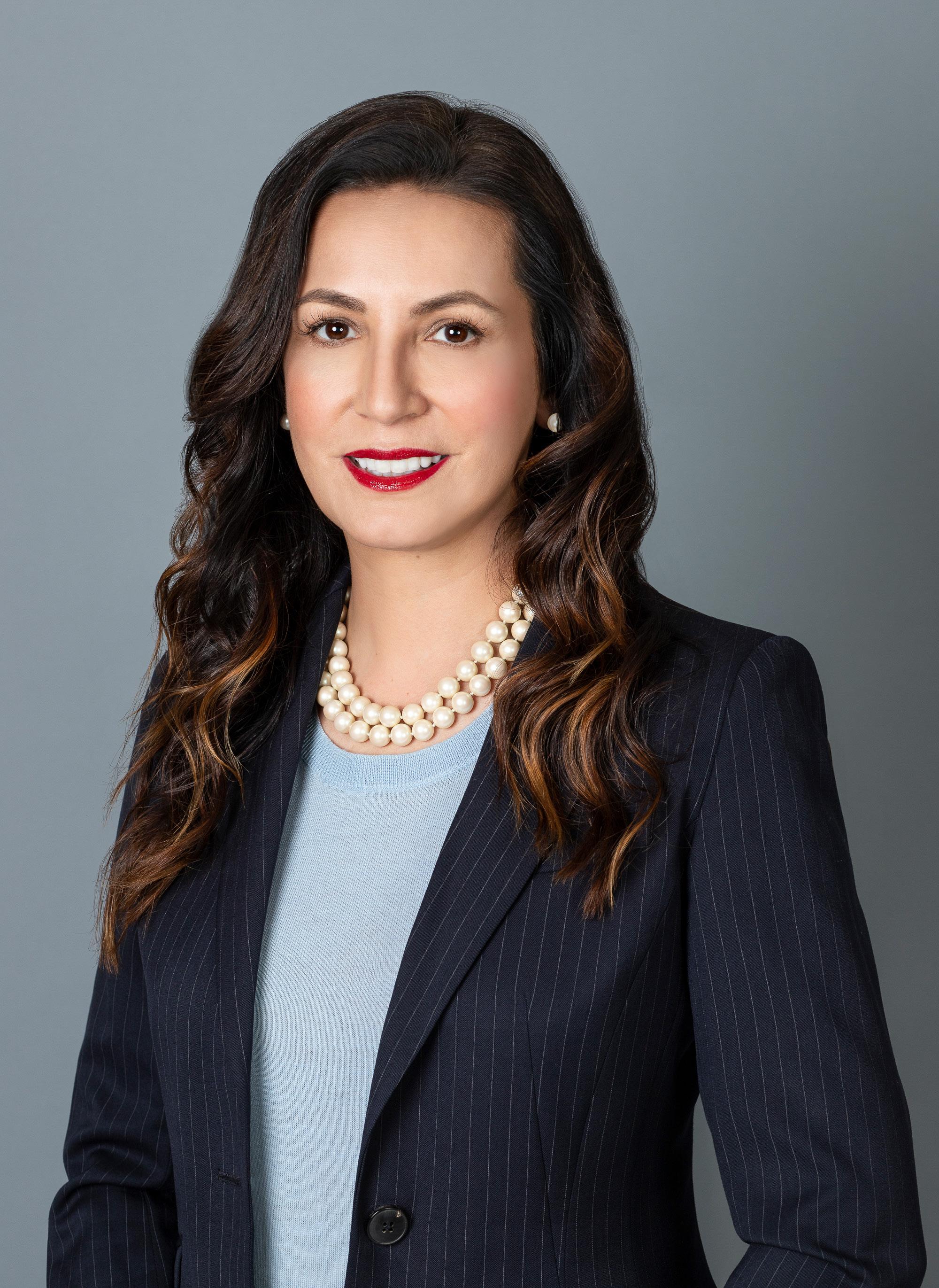

EVA DE LA ROSA ISN’T ALL THAT keen on relishing her accomplishments. The Los Angeles native and first-generation Mexican American is among the first in her family to graduate from college (from Stanford, no less) and the first to receive her MBA (from Duke). Her willingness—and eagerness—to continue challenging herself has, most recently, brought her to Citi as the head of global network marketing for the consumer bank’s global business development and strategy group.
Despite her success, De La Rosa continues to be forward-looking. She would prefer to spend her time working on something new rather than focusing on past career accomplishments.
“I’m so passionate about leadership in the Latinx community,” she says. “I think it’s time that more of us get out there and talk about our stories, our challenges, and our opportunities.” De La Rosa has found countless ways to give back to her community, and she’s hoping her story will spur on the next generation of Latinx leaders.
De La Rosa says continually getting out of her comfort zone has emboldened her to continue growing. It’s a lesson that’s played out repeatedly since she decided to attend college away from
her primarily Latino neighborhood in Los Angeles. De La Rosa later doubled down on those efforts by electing to pursue her MBA, and subsequently her career, on the East Coast. “In order for me to diversify my personal and professional experiences, it was important for me to broaden my network across geographies, institutions, firms, and industries,” she explains. “Some of my greatest mentors and advocates have been members outside of the Latinx community.”
And that’s not a task the executive takes lightly. “I say this frequently—maintaining and growing your network authentically takes work,” De La Rosa emphasizes. “It’s not just about attending happy hours. I think it’s about cultivating a sense of community and mutual support, culvitaving mutual interests, and staying in touch even when you’re not asking for something.”
That can be as simple as reaching out to ask if a colleague or acquaintance could use help with anything or catching up after changing jobs. “It’s so critical for personal and professional growth,” De La Rosa says.
De La Rosa currently serves as president (and cofounder) of the New York Chapter of the Stanford Latino Alumni Association (SLAA) as well as a member of the SLAA national board. “I will perpetually be grateful for everything my college experience gave me, and any time I have the opportunity
From professional networks to alumni organizations and nonprofits, Citi’s Eva De La Rosa has surrounded herself with a community of diverse and impactful thought leaders
to volunteer or to lead in the Stanford community, I do so with a lot of enthusiasm and gratitude.”
According to De La Rosa, SLAA is an ideal place to engage Stanford alumni in forwarding the causes of the Latinx community. “It’s important for us to step up and demonstrate our leadership and our contributions—not just for Stanford but, more broadly, in society,” De La Rosa says. “SLAA’s focus is about sustaining, growing, and reinforcing strong networking opportunities and really giving back to each other, Stanford, and the community.”
De La Rosa comes to Citi after a successful decade at American Express and previous stints at Coca-Cola and British Petroleum. And while she’s only months into her new position at Citi, the executive is clearly ready to lead. But she’s not going into it with a rose-tinted point of view: as De La Rosa has learned throughout her career in financial services, consumer goods, and retail, some Latinas in leadership positions face unconscious bias, and sometimes their humility is mistaken for weakness. “That is always such a fine line, and I make a point to deliberately find that balance the best way that I can,” De La Rosa says.
Fortunately, De La Rosa has found her experiences while working at several Fortune 500 companies to be marked by a passionate commitment to diversity and inclusion—a commitment she hopes to expand both in her tenure as Citi’s head of global network marketing and beyond. “I think the cornerstone of leadership is being inclusive, irrespective of where a person comes from or their background,” the executive explains. “The more you diversify, the better off you are because you are continuously pressure-testing ideas, problem-solving, executing, and generating creative ideas.”
De La Rosa’s dedication to these values expands beyond her role at Citi. As a member of 2020 Women on Boards—a public advocacy campaign
with a mission to increase the number of women on corporate boards—she has helped to increase the number of women who serve on corporate boards in the US. As of 2020, the organization has achieved its goal of seeing 20 percent of board positions filled by women. However, there is still more work to be done, says De La Rosa.
“We’ve been fighting for diversity and inclusion for so long—it’s wonderful to see some of these efforts paying off,” De La Rosa says.
In many of these efforts, De La Rosa has been motivated by current Citi president and incoming CEO Jane Fraser. “Jane has been such a wealth of inspiration for so many of us, not just as a woman and exceptional leader but as someone who lives the values that I appreciate,” De La Rosa enthuses.
The example set by Fraser is one reason why, despite having joined Citi so recently, De La Rosa has already begun executing on her commitment to diverse and inclusive thought leadership, striving to maintain an international lens and keeping a global perspective in mind at all times.
As De La Rosa continues to advance her career, she never seems to forget all those who have helped pave the way for her success. “I come from a background where higher education was viewed as a luxury and was not always attainable,” De La Rosa remarks. “I think that appreciation and eagerness to learn and remain curious is what has helped catapult me here today. It’s something for which I’m truly grateful.”
“Maintaining and growing your network authentically takes work. It’s not just about attending happy hours.”

AOC: The Fearless Rise and Powerful Resonance of Alexandria Ocasio-Cortez

ABORN HUSTLER, LYNDA LOPEZ learned early on how to aim high as she was growing up in the Bronx, New York. There was no other choice.
“Our parents raised us to believe we could be anything we wanted to,” explains the Emmy Award-winning journalist. “At the time, they weren’t imagining journalists and rock stars, but they raised us to believe that whatever we chose, we could do it—even if it was President of the United States. That was the amazing gift that they gave us.”
The “us” here includes Lopez’s two older sisters, Leslie and international icon Jennifer Lopez. All three sisters were inspired by their parents to make a name for themselves in their chosen fields. “Even though they taught us what the challenges were for people of color, we were always taught to dream,” Lopez recalls.
Growing up in the 80s as a latchkey kid, Lopez consumed a great deal of radio and television, and quickly realized that she had a passion for it. “I just knew—especially when listening to the radio—that there was something fascinating about it,” she says. “I remember telling myself, ‘I want to do that one day.’”
Another artistic influence on Lopez was her mother Lupe, who had an infectious love for musi-
cal theater. Lopez refers to both her mother and her late aunt as “Broadway Babies” who exposed her and her sisters to theater and music at a young age. And Lopez certainly gained a deep appreciation for the arts, but she always knew that her calling was not on the stage. As an undergraduate at Long Island University, she chose to study broadcasting, communications, and journalism.
In college, when Lopez went into the school’s radio station and applied to be a news reader, she was turned down. They didn’t have any openings in that department. Instead, the station offered Lopez a chance to host her own radio show. In that role, Lopez gained the skills and knowledge that led her to postcollege gigs at stations like WBAB, WLIR, WXXP-FM, and WKTU. Beginning in the late '90s, Lopez began working at TV network VH1 VJ, where she interviewed some of the biggest names in the music industry—including her sister Jennifer.
All the while, Lopez’s love for journalism and reporting continued to grow. So when she was offered a gig on a morning news show in NYC as an entertainment anchor, she jumped at it, knowing it would lead to more opportunities in the news and reporting world.
Jumps like that—from radio to television, from hard news to entertainment—are rarely easy. But Lopez has a knack for weaving in and out of these
Emmy Award-winning journalist Lynda Lopez wants Latina leaders to use their voices to enact the change they’re capable of
roles and doing it well. Her secret? Relying on her instincts and, like all good journalists, choosing vision over volume. “I know what stories I want to elevate and what matters most,” she explains.
Often, the stories Lopez wants to elevate focus on other women, particularly other women of color. A couple years ago, when she was working for ABC’s Nightline, a story came across her desk featuring someone she had interviewed in the past: Vida Showrunner Tanya Saracho. “Tanya is such an amazing human, a talented writer with a light inside her. These are the kind of women that inspire me,” Lopez enthuses. “Women like this are few and far between.”
In fact, Saracho was the one to encourage Lopez to pursue her passion of writing. “Just do it,” Saracho told her friend. Now, Lopez is the editor and curator of a best-selling book of essays called AOC: The Fearless Rise and Powerful Resonance of Alexandria Ocasio-Cortez . Released in August 2020, the book features stories of what Alexandria Ocasio-Cortez (AOC) means to both the Hispanic community and the nation as a whole.
Fifteen contributors, including Tracey Ross and Natalia Sylvester, illustrate how AOC has resonated with them. Lopez herself wrote the introduction for the book, detailing the Congresswoman’s meaning and the significance of her career. There are so many “people who are proud of AOC for so many reasons, and I wanted to explore that,” Lopez says.
According to Lopez, one of the most remarkable things AOC has done is stand in her own power, taking up space and forcing other people outside of her community to pay attention to what is happening. And this is not, Lopez emphasizes, a trait distinctive to a handful of people.
“I think all the Latinas I have ever known have what it takes to be a leader. We are resourceful, strong, pay attention, and are loving. All of those things that make a good leader are inherent in all of the Latinas I have known,” she remarks.
Many of the women Lopez speaks of are members of her own family. Being surrounded by strong women is something Lopez appreciates, especially as she is a mother herself to a twelveyear-old daughter named Lucie. “When Lucie was on her way, and I found out she was going to be girl, I was very happy,” Lopez recalls. “I knew bringing another girl into this family was a gift for us and also for her.
“I want Lucie to be a Latina leader by living her life to dream as big as she can and boldly go in that direction,” she continues. “Just by doing that and being herself, with her own gifts, she makes things better in the world.”
“I think all the Latinas I have ever known have what it takes to be a leader.



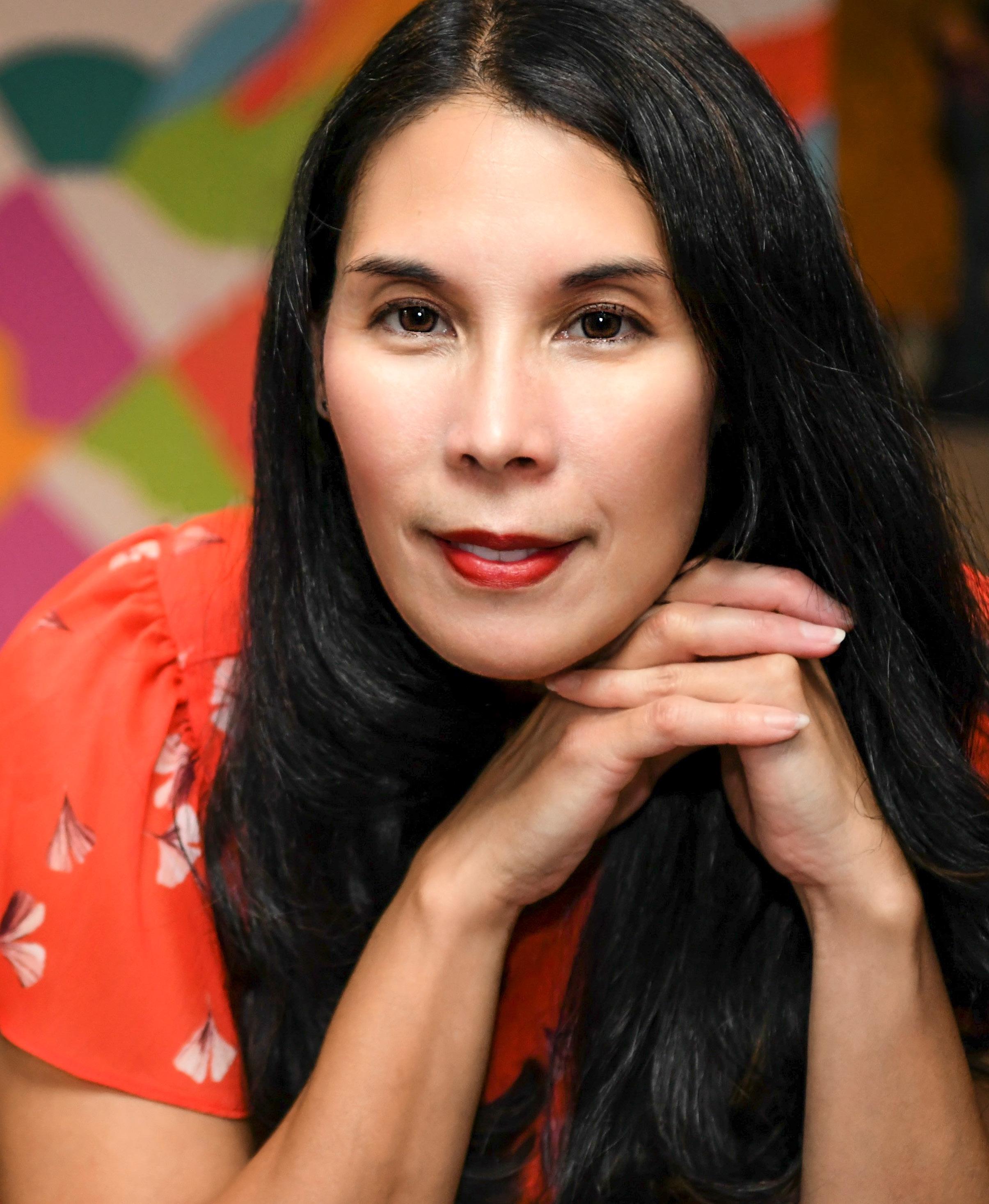
OSING A JOB YOU LOVE
Lcan be a spirit-breaking experience—but not for Compass Working Capital General Counsel Betty Francisco. Yes, she was sad when her past employer, Millennium Partners Sports Club Management, sold its health clubs to Equinox in 2015, but she saw that moment as a valuable opportunity to put her MBA to use. First, she launched Reimagine Play, an obstacle-based fitness program for children.
“It was a passion of mine at the time because I had young children, two girls, who could barely jump rope because they weren’t being taught good physical education in school,” Francisco says. “There’s such a need for more wellness activities for kids that ingrain the sense of healthy living from an early age.”
Francisco also took advantage of her free time to learn the ins and outs of angel investing. As a corporate lawyer at the Boston firm now known as Locke Lord, she had completed many deals related to angel and venture capital investments, as well as mergers and acquisitions. But she wanted to learn more about how venture capitalists and angel investors make the decision to invest. She joined Pipeline Angels, which she describes as a boot camp that teaches women how to become angel investors with the goal of creating “smart” capital for women and nonbinary femme social entrepreneurs.
“That was career-changing because it put me on the path towards something that I had always wanted to do and didn’t really know how to get into,” she says. “I didn’t know how to become an angel investor or even approach becoming a venture capitalist. This gave me the entry point and access to an entire investor community, where I have focused on investing in women and founders of color.”
Francisco found the opportunity to merge her various skill sets in 2017 when Latina Circle, a nonprofit she cofounded, hosted an event centered on a racial wealth gap report by the Federal Reserve Bank of Boston called “The Color of Wealth in Boston.” Published in 2015, the report examined wealth disparities among people of color in the greater Boston area. The event examined the report and brought to light available financial mobility programs that were making an impact. One featured speaker was Compass Founder and CEO Sherry Riva, whose passion and focus on closing the racial wealth gap motivated Francisco to join the nonprofit financial services organization as their general counsel.
“She spoke about Compass, and why she started the organization, and we had very similar interests around helping women of low income households get access to wealth-building opportunities,” Francisco remembers. “It’s high-quality, culturally competent financial coaching, financial education, and asset building. [At Compass,] we meet people

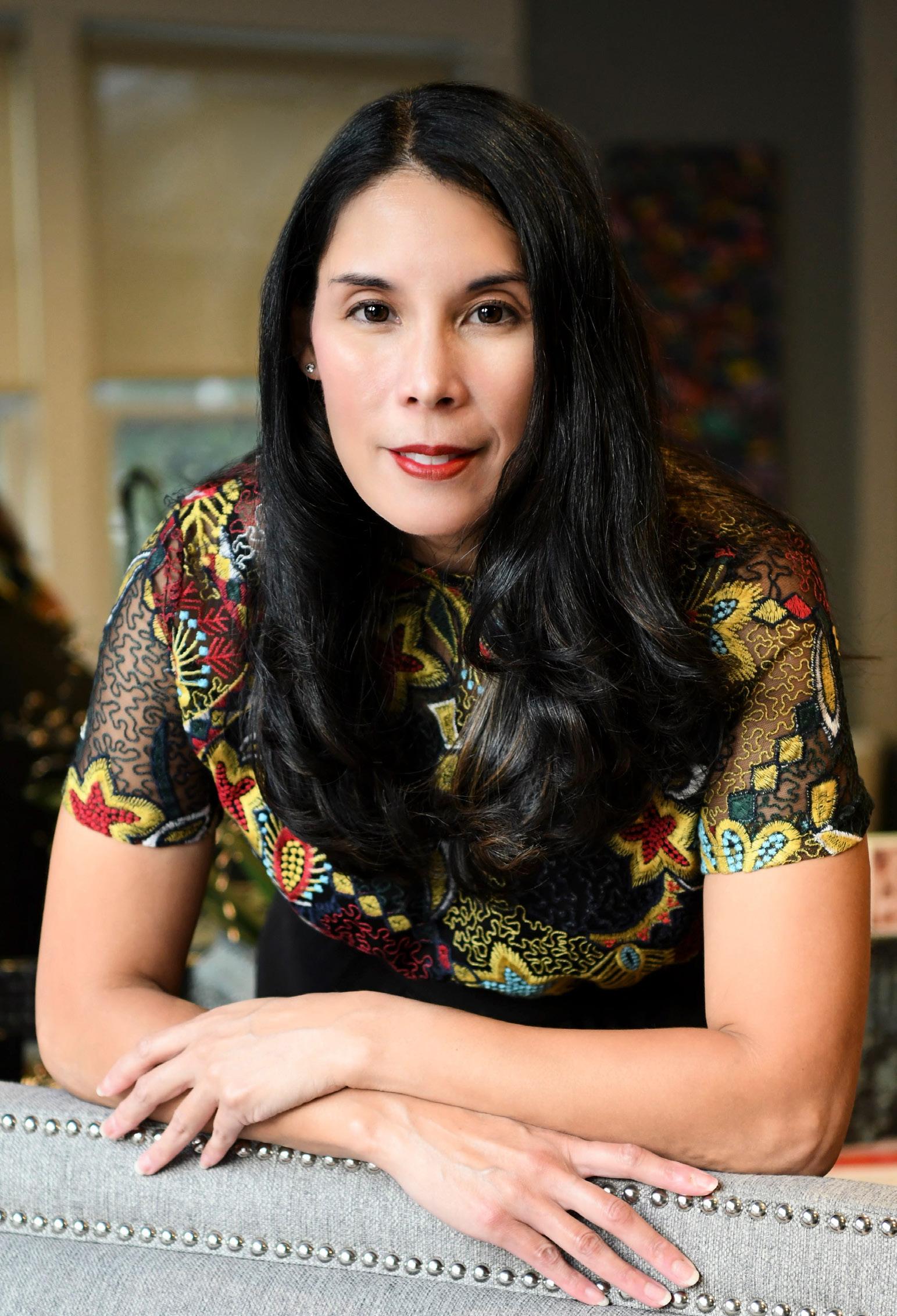
“I really enjoy and am inspired to be part of an organization where I can contribute to shaping the strategy and vision with a racial equity lens.”
where they are and allow them to define what they want to achieve in terms of their hopes, their dreams, and their goals, and we have coaches who support clients by providing them with the resources and confidence to achieve their aspirations.”
Since 2010, Compass has supported families to collectively build over $6 million in savings, and has grown to reach more than 1,800 families each year, primarily in Greater Boston and Philadelphia. Compass is poised to expand to reach 5,000 families each year over the next two years.
For Francisco, who grew up in public housing in New York City, Compass’ emphasis on financial education, coaching, and building assets resonates personally. She notes that life could have been very different for people such as her mother if there had been access to financial resources and savings tools. Indeed, she says, that “would have been transformative.”
Francisco is incredibly proud of the work being done at Compass, where she oversees legal, compliance, and risk management and also supports HR; diversity, equity, and inclusion; and policy strategies. She points to a recent partnership that provided cash assistance to help clients who were experiencing job loss and food insecurity as a result of the COVID19 pandemic. Compass sent out a survey to find out what those clients needed at that moment, and many indicated they needed help with money. To that end, Compass collaborated with the Family Independence Initiative to help 339 families get $500 in direct cash assistance—and collaborated with United Way to do the same for an additional 20 families. Francisco even supported some clients who are small business owners in accessing grants and federal Paycheck Protection Program loans.
Compass has also responded to the needs of its own team during the pandemic. The organization switched to working remotely and offered major perks such as reduced schedules and summer Fridays off, which benefitted working families. Additionally, the organization created a weekly town hall in order to encourage

open discussions surrounding current events driven by the tragic deaths of Breonna Taylor and George Floyd.
“It opened up a space where we can be very honest and transparent about how this is impacting us emotionally,” Francisco says. “Being able to do that in a workplace can be difficult, and we were able to do it because of the trust we built up during this time. I really enjoy and am inspired to be part of an organization where I can contribute to shaping the strategy and vision with a racial equity lens.”
Francisco is tremendously busy outside of the office. For one, she is a cofounder of the Investors of Color Network (ICN), which is building an ecosystem of Black and Latinx accredited investors to close the racial funding gap in start-up capital. One of ICN’s many goals is to activate and mobilize ten thousand investors of color to collectively create $100 million in new capital for Black and brown entrepreneurs over the next five years. Francisco also sits on several boards, including those of Amplify Latinx, Beth Israel Lahey Health, the Nellie Mae Education Foundation, the Boston Foundation, Roxbury Community College, and Eastern Bank’s Board of Ambassadors.
Increasing the representation of Black and Latinx leaders on corporate boards, government boards and commissions, and in elected positions has been and continues to be one of Betty’s top priorities. “One of the things I always take to heart when I serve on any of these boards is to leave a mark by ensuring that more of us have an opportunity to serve, [which I accomplish] by nominating Black and Latinx talent who bring their unique perspectives to these leadership roles,” Francisco says. “Once you get on a board, I feel you have an obligation to ensure that this diversity of views continues to be amplified and represented.”
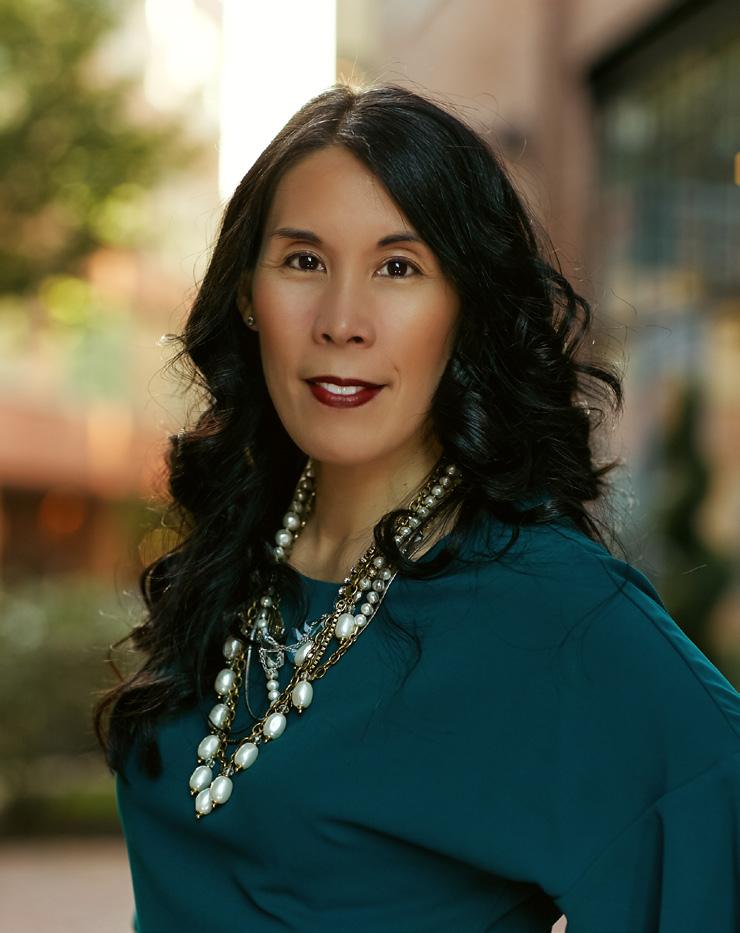
We are proud to honor for her outstanding accomplishments.
Betty Francisco
As an advocate for small businesses and communities of color, Betty is a trusted partner providing greater opportunity and stability in the community.
We recognize her and all of the Leading Latinas who inspire us with their work every day.Member FDIC

Mayoral Candidate for New York City
Office of the Mayor of New York City
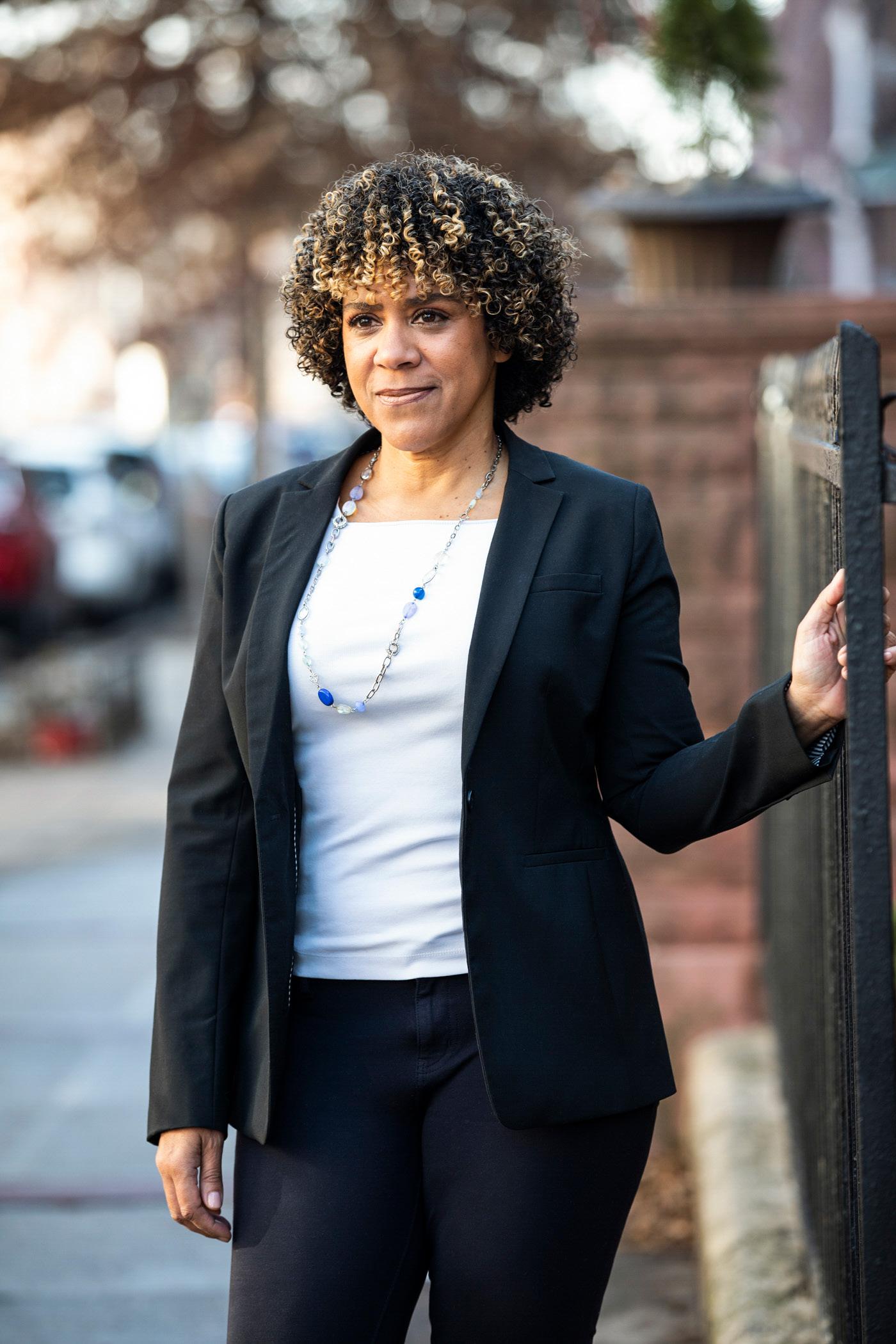
WHEN DIANNE MORALES announced her candidacy for the 2021 New York City mayoral race, the first-generation Afro-Latina was already in the history books as the first Latina to ever run for the city’s top job. It’d be easy to think the campaign was the fulfillment of Morales’s lifelong dream to one day lead the city. But the woman who has spent the better part of two decades fighting for the city’s public schools, at-risk children, underserved neighborhoods, and disenfranchised families couldn’t have been more surprised at her own decision to run.
“If you had asked me to run two years ago, I would have said, ‘Are you crazy? Have you met me?’” Morales says, laughing. “I’ve spent my entire career working in the community, mano-amano, elbow-to-elbow, because I believe that’s the only way to create real change. I’ve always been an
ardent believer in the idea that we have to create the community we want to see.”
Morales spent a decade as the CEO for Phipps Neighborhoods, an anti-poverty organization in the South Bronx that provides comprehensive education, career, and community resources to children, youth, and families.
The rest of her résumé is similar in theme: providing a leg up to those who need it most. Most importantly, Morales emphasizes, her efforts were working.
But following the election of another prominent New Yorker in the 2016 presidential election, and the rhetoric that accompanied it, Morales began to give credence to the steady stream of people in her life telling her she was destined to run for office. The game of politics had changed dramatically, and Morales was of the mind that perhaps she needed to change with it. “I’ve spent my life helping others
After decades of community building and serving the city’s most vulnerable, Dianne Morales is vying for the top job in the Big Apple

“I think my experiences as a single mom and as a first-generation Black Boricua have so much more in common with the average New Yorker than most professional politicians.”
overcome barriers and gain access to opportunities,” she says. “And I think my experiences as a single mom and as a first-generation Black Boricua have so much more in common with the average New Yorker than most professional politicians. That’s why I’m here.”
The mayoral candidate says the temerity with which she’s waged her campaign is (hopefully) a reflection of the woman that raised her. “Quite frankly, my mother was a badass,” Morales says with pride. “She and her mother used to take in other people’s laundry when they first came to NYC. They didn’t have two nickels to rub together, and this woman, who didn’t speak a word of English, had decided she was going to move to the US to pursue the American Dream. She spent her entire adult life defying stereotypes, and I remember being in awe of her because she was the office manager at a union office, and she never let anyone else define her or what she could or could not do.”
Morales’s campaign is a fitting tribute to her mother. It has been labeled as an outsider campaign precisely because Morales refuses to play by the traditional rules of the game. “I know this has been controversial, but I’m not willing to kiss the ring,” Morales says. “I’ve gotten messages from prominent Latinos telling me I haven’t asked the right people for permission. Let me be clear—that is intentional. This campaign is about people who have been left out of the process. It is for people who have gotten the message, both direct and indirectly, throughout their lives that this isn’t for them.”
The most salient issues included in Morales’s platforms are ones that most candidates in the New York City election would purposefully and adeptly steer clear of. “Divest from the police, invest in the people” is the first bar of policy on Morales’s campaign website. “When people live in ‘safe’ communities, and you look at those communities, they are not burdened with police presence. What they are rife with is resources and
opportunities.” Communities with less access to the tenets of the American Dream, Morales explains, are the ones that experience more crime and more conflicts with the police. “My first priority would be to look at how we move away from the current view of policing communities and reallocate resources to support things like housing, schools, and healthcare,” she says.
Morales says the majority of the city’s 911 calls don’t require an armed officer response. It’s why she’s proposed the creation of a Community First Responder Department comprising medics, counselors, and mental health professionals trained to address emergency calls. “I’ve learned that, as executives, where you put money reflects the things you think are most important,” Morales says. “The budget is a reflection of our values and our priorities.” The candidate believes the shift away from traditional city priorities of “more cops on the street” to an organized effort to help solve the issues that currently result in police being called in the first place is a policy move that New Yorkers are ready for.
Morales’s candidacy isn’t about being the first Latina to vie for the office, or the possibility of becoming the city’s first woman mayor. But those are real truths that still have impact. “I was at a conference in this massive line for food, and I noticed some young people behind me laughing and pointing,” Morales remembers. “One of the young women stepped up to me and asked if I was Dianne Morales, the woman running for mayor. I told them I was, and they were so excited.
“I was struck in the moment by the weight of the responsibility,” she continues. “When I hear a young Latina say that it’s amazing to see someone running for mayor who looks like her, it’s amazing. I think about my mother, and I’m honored and privileged and humbled to walk a path that people like her have cleared for me. This is exactly where I’m supposed to be.”


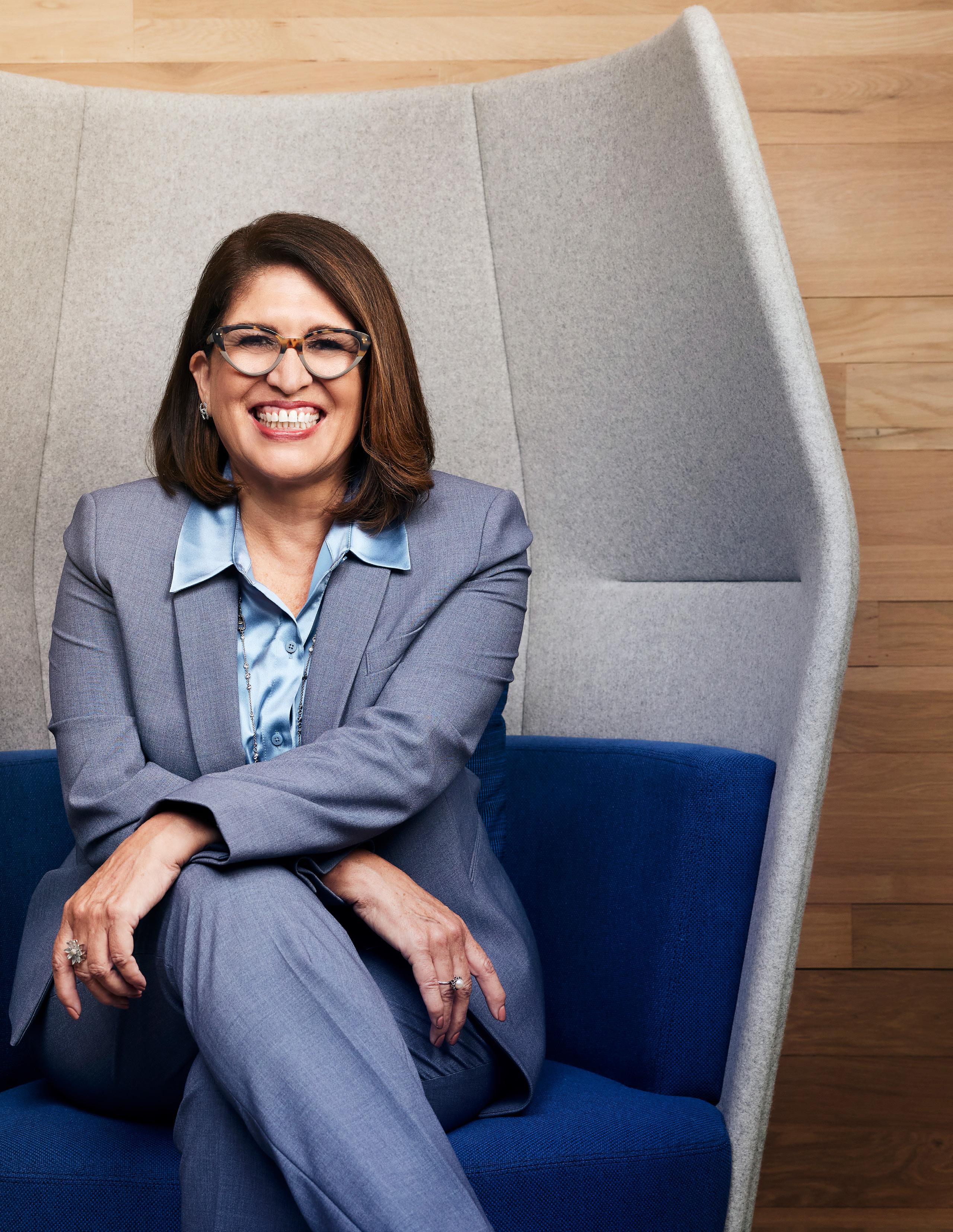
Wwelcomed Hortencia Banuelos in 2016, the company wasn’t just adding a future chief financial officer to one of its largest lines of business. Banuelos is, without pomp or exaggeration, one of the most motivated and empowering voices for Latinos in business. The senior vice president for line of business and chief financial officer of commercial finance has lived through enough worst-case scenarios of how monoculture in the corporate sector can impede the progress of minorities—or even inhibit it completely—to know the importance of diversity and inclusion.
Banuelos is used to being the only Hispanic woman in the boardroom, in the building, and in the company. It is an experience she has had several times over since moving from Juárez, Mexico, to the US in 1994. When she asked a local plant head if they employed any Hispanics, she was told there were a few on the work floor but that they were “not the kind of people” she would want to consort with.
She’s also well versed in the microaggressions that accompany a Latina assuming a leadership position in rural America. As a result, overdelivering became her default—not to prove her own worth but to try to open the eyes of her peers to the reality that Hispanics deserve the same shot at positions of leadership as anyone else.
After being hired by GE in Mexico in the ’80s, Banuelos was selected for a training program
almost exclusively reserved for Ivy League graduates. “I really didn’t fit the profile,” Banuelos says, laughing. “They wanted single Americans, just out of the Ivy League. I was married, had attended a local school, and was working remotely in Mexico.” Every six months for the two-year program, she traveled to Connecticut for a weeklong test and wound up receiving an award for her high marks.
GE would go on to provide Banuelos with countless additional opportunities. But after moving to Indiana, she realized the complexities of what her heritage meant for her employment. “It’s been tough since the beginning,” Banuelos admits. “You were someone who didn’t speak the language the same as everyone else, and you could really feel the resistance at times. But when you deliver, you’re able to build the trust of your team. There were always those looks and those comments, but you just have to push through it.”
Later, Banuelos spanned two worlds for GE, acting as a financial and cultural intermediary at the US–Mexico border while also earning her Six Sigma Black Belt. “It was an explosion of two cultures, which gives you a lot of value to companies,” Banuelos says of her work on the border. “You’re used to Spanish and English; you’re used to the currency exposure and the responsibilities of working on both sides of the border.”
Throughout her career, Banuelos has pushed for more inclusion in the workplace. Now, at Fifth Third Bank, the SVP is finally seeing results. She has helped the bank lean into its diversity council, has mentored (both formally and informally) the

sometimes dozens of diverse future leaders identified both within and beyond the company, and has regularly welcomed new voices, new perspectives, and new talent to the bank.
Someone to Lean On
No matter what has come her way, Banuelos has always placed a high premium on the value of mentorship. “It’s maybe my highest passion,” Banuelos says. “At one time, I was mentoring twenty-two
people at once.” Banuelos’s mentees span the globe, from Switzerland to Mexico to Chicago, and the CFO still receives calls from old mentees asking for career advice and job interview pointers.
Banuelos’s focus on mentoring is partly due to the lack of representation she has seen time and time again throughout her career. “Hispanics have the highest number of entrepreneurs and small businesses,” Banuelos explains. “How do we support Hispanic business? How do we bring
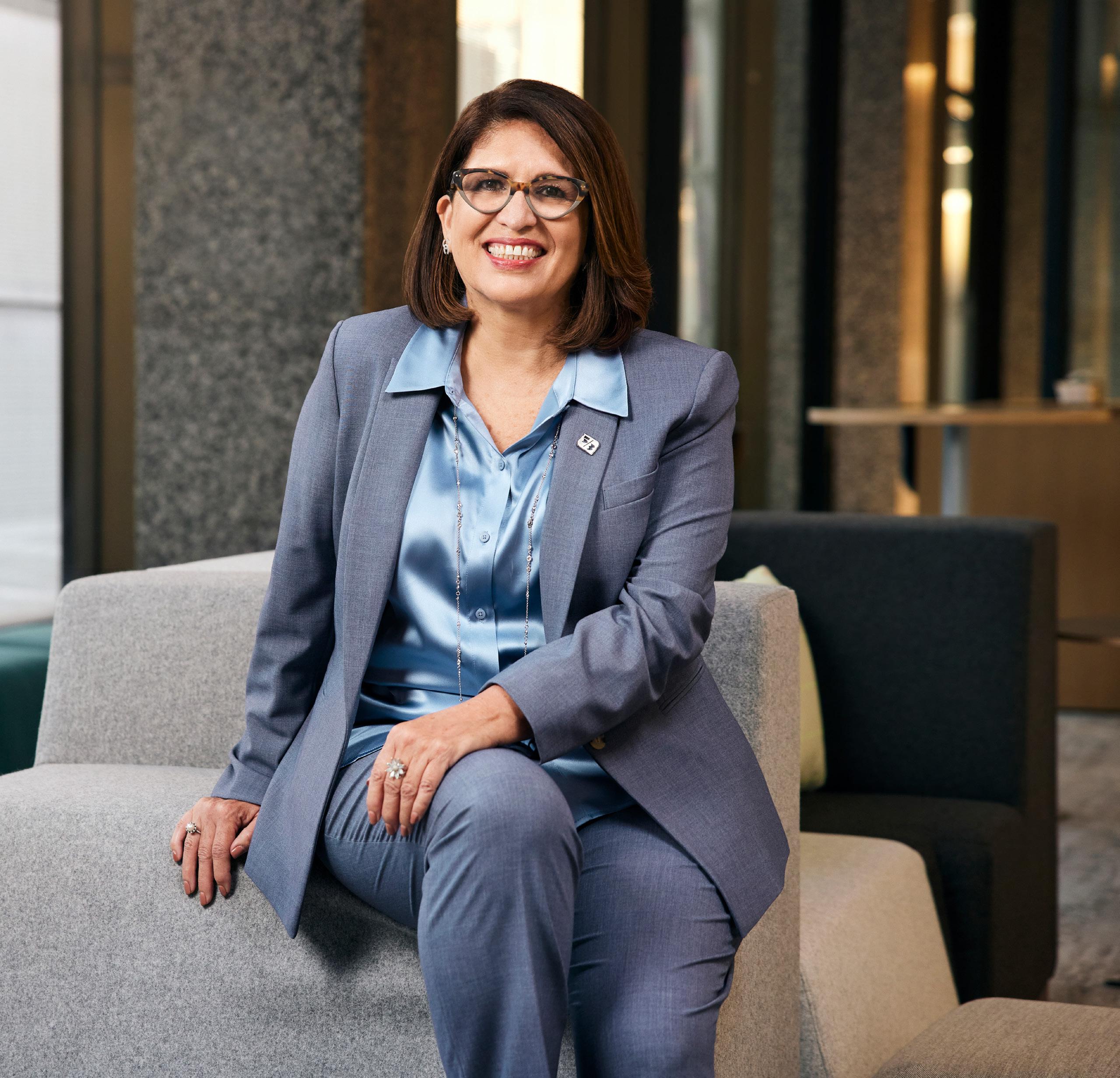
Between jobs for the first time in 2015, Hortencia Banuelos decided to make her dream of moving to France to learn French come true. Her friend resigned her HR job to join her. “We were students for two months in Paris, going to school from nine to one, then cooking, taking the metro, and living like locals the rest of the time,” Banuelos recalls. “It was the best time of my life because I made the time to do something I had always wanted to do.”
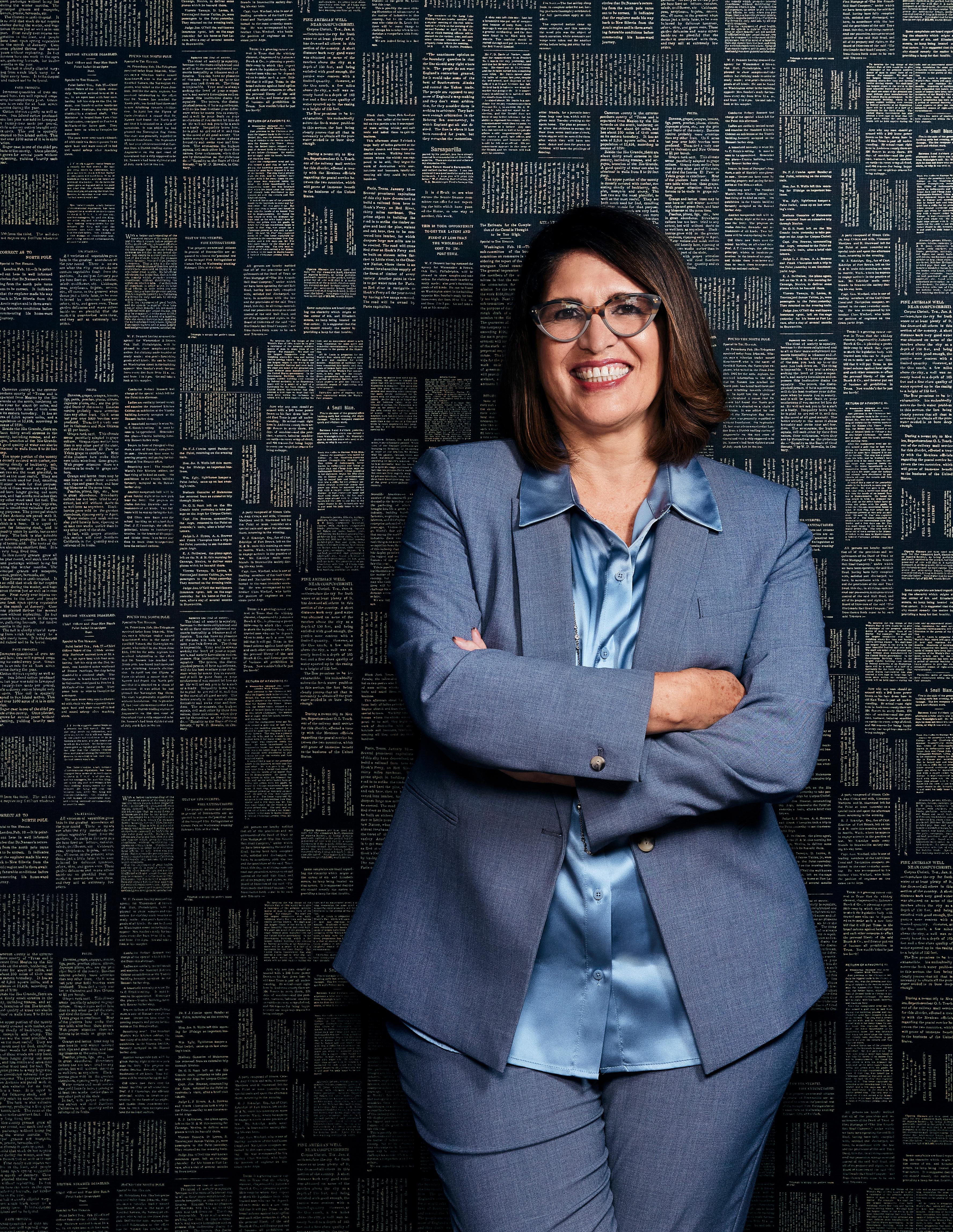
diversity to our business so that our people are more representative of what the actual community looks like?” The answer? Mentorship.
Banuelos says she’s extremely grateful for the opportunities she has been given at Fifth Third— not just to lead one of its largest business lines but to help the organization commit itself to diversifying its talent pipeline. “I’m so passionate about showing what Hispanics are capable of in this business,” Banuelos says. “It can be so tough initially because you feel like you have to overcome so much to earn the trust of your team, and I want to be here to give advice and help people move forward in their careers.”
Banuelos’s eight-person team, which has an equal proportion of men and women, is a reflection of that ideal. Moreover, in 2019, Banuelos was invited to be part of a panel at the Ohio Latino Summit. The panel aimed to encourage more diverse candidates in the Cincinnati area—sometimes a very challenging geographic proposition. Banuelos is also on the board for Every Child Succeeds, which sends home visitors to first-time parents for one thousand days prior to the child’s birth and through the child’s third birthday.

The CFO’s advice for future Hispanic leaders is clear and concise. “Be firm, overdeliver, and don’t take it personally.” This advice is forged in her struggle for recognition and respect, but Banuelos wants you to know she is here to help.
Editor’s Note: At the time of press, Hortencia Banuelos was no longer with Fifth Third Bank and was focusing on becoming a business professor and consulting leader.
“You were someone who didn’t speak the language the same as everyone else, and you could really feel the resistance at times . . . . There were always those looks and those comments, but you just have to push through it.”
SVP of US Card
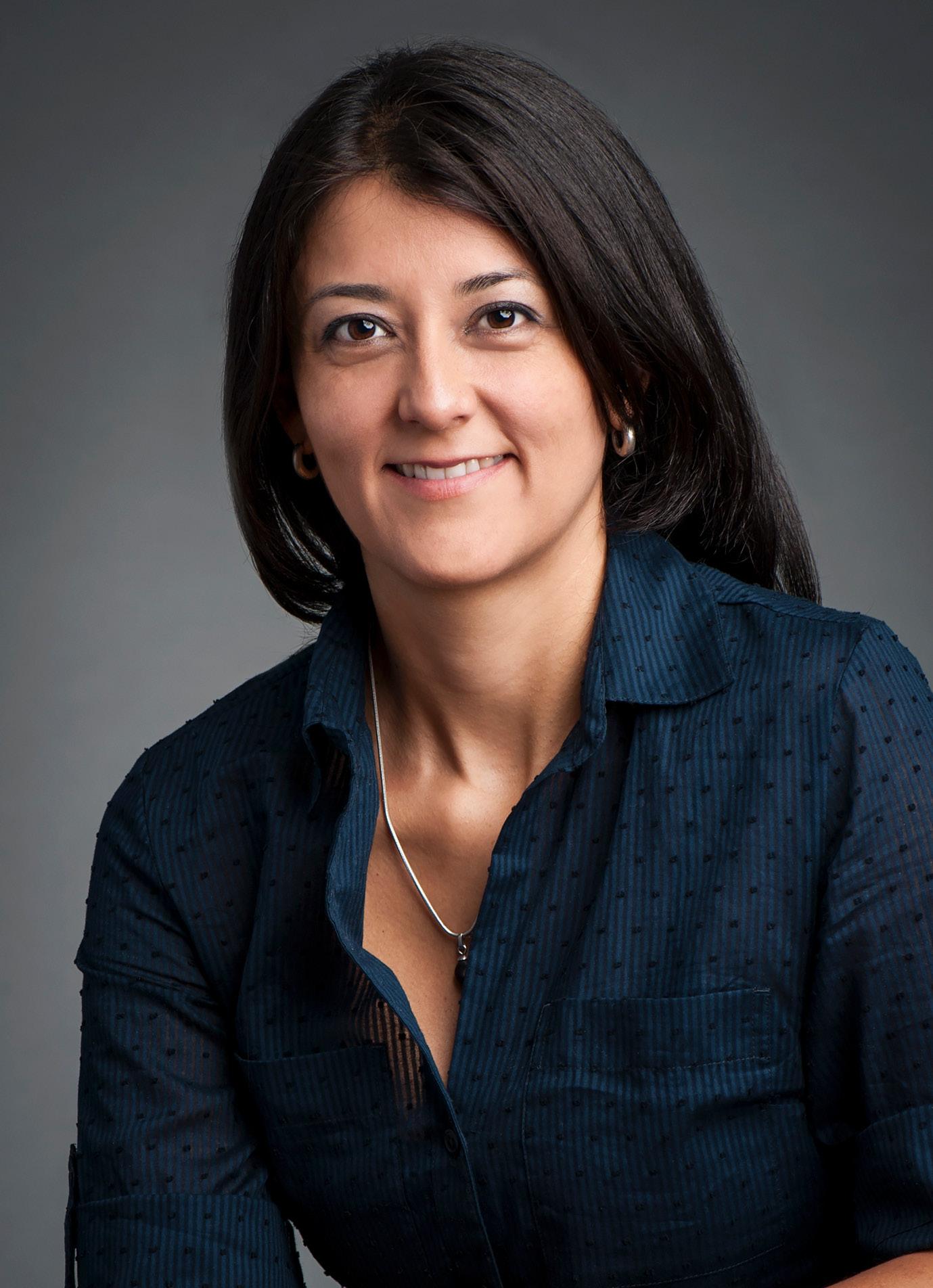
Customer Resiliency
Capital One

ASK EMILIA LOPEZ ABOUT HER leadership philosophy, and she’ll dive into the importance of authenticity. The Capital One executive believes that bringing your authentic self to work is one of the keys to personal and professional growth.
“Every ounce of brainpower and emotional power that you’re using to present yourself in a way that is not true to you is an ounce of energy that you are not using to do the work in the best way you can,” she says.
When the COVID-19 pandemic hit, leaders everywhere were put to the test. Many were dealing with new challenges on all fronts, and Lopez found herself struggling to find a healthy balance between work and life in a virtual environment. True to form, she decided to be authentic and open about these challenges and discovered that doing so helped her lead through a difficult time.
“I feel so fortunate for my health and to work for a company that prioritizes the well-being of its associates,” she says. “I believe that striking a healthy balance between work and life is critical, and it’s something that I want everyone on my team
to achieve. But I am someone who has difficulty setting boundaries with work, and working from home made that so much harder for me.
“I was open about this from the beginning,” Lopez continues, “because I wanted it to be clear that this was an area of opportunity for me, and I wanted others to feel comfortable sharing their own challenges. I found that sharing my struggles openly not only helped me connect with others on a deeper level but also helped me get better by creating a stronger sense of accountability and support from others.”
Lopez has long practiced this level of transparency around her “areas of opportunity.” She makes an effort to share them in the context of her belief that “while no one is perfect, everyone can be better.” In addition to leading with authenticity, she believes in the importance of self-improvement and a growth mindset—a combination that has served her well throughout her career.
Hispanic Executive first spoke to Lopez in 2017 about what drew her to Capital One, what she values about the company’s culture, and her areas of focus at the time. Since then, she has experienced significant professional growth, including a

“Every ounce of brainpower and emotional power that you’re using to present yourself in a way that is not true to you is an ounce of energy that you are not using to do the work in the best way you can.”
promotion to senior vice president, taking on leadership of a new team, and becoming an accredited senior credit officer—one of only twenty-three people in the entire company to hold that title at present.
In her current role as SVP of the US Card Customer Resiliency team at Capital One, Lopez leads a team that serves customers who are struggling to meet their financial obligations. Through a combination of advanced technology, analytics, and human-centric approaches, her team works to help customers resolve their debt. These are inherently critical and sensitive issues, which are further complicated by COVID-19, and Lopez applies her growth mindset to drive her team to innovate across three key areas: risk management, product, and well-managed processes.
This focus on innovation includes launching more digital options for customer communication. Digital channels are easier to scale and systematize, Lopez explains, which is important in a regulated environment. They also allow customers to discuss their financial situations on their own terms, without having to share a potentially distressing story multiple times.
“We’re always striving to find more ways to meet customers at the right time with solutions that align with their particular needs, while also being systematic and well managed so that we can help as many customers as possible,” she explains. “By leveraging data and technology, we’ve been able to better serve our customers when they need it the most, and that is very rewarding.”
Outside of work, Lopez also met a major personal milestone: in 2018, she became a mother for the first time. She says that becoming a parent underscored the power of authenticity, self-awareness, and setting a high bar for herself.
“Now, the example that I set carries much more weight and importance for me,” she says, “to be the best version of myself that I can be—for my son, my family, my colleagues, and our customers. It is equally important to me to invest in my own ongoing development as it is to be true to myself and what I stand for.”
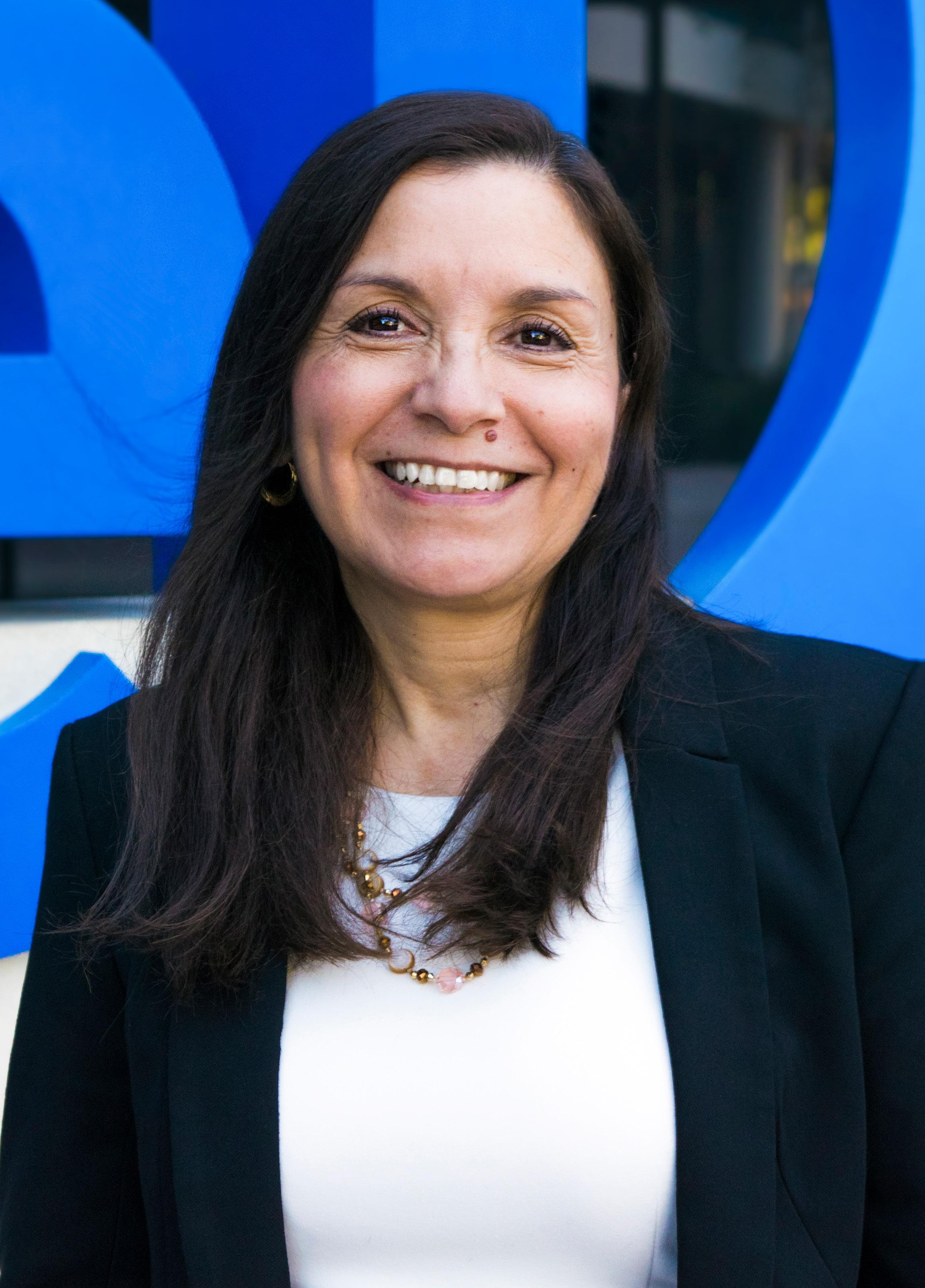

Award-winning Intel VP Isaura Gaeta has taken on challenge after challenge. Now, she’s out to open new doors for the company’s team of hackers.
BY BILLY YOSTTAward (IAA) is the highest honor an individual or small team can receive from the company. The award recognizes innovations and results that have had the greatest impact on the company’s top business priorities. It’s the top of the mountain, an award demarking what must be a career highlight for its winners, and a recognition from one of the best-known technology companies in the world that a small, select group of its employees has done work worthy of being singled out of a population of 110,000. Isaura Gaeta has won it five times.
The VP of security research in Intel’s product assurance and security group, Gaeta has been an Intel employee for the bulk of her career, dating back to the early days of the Pentium processor in 1990. Gaeta has led semiconductor labs and manufacturing facilities; she’s led systems and platform engineering teams; and, in June 2018, she was charged with her most novel position yet: overseeing a team of hackers whose job isn’t to create new products across Intel’s product lines but to figure out how to break or bypass them.
Admittedly, there’s something amusing about imagining Gaeta on the same playing field as Viola Davis in Suicide Squad or Lee Marvin in The Dirty
Dozen. The tough, no-nonsense leader of a ragtag group of misfits—that’s not Gaeta’s vibe in the least. And it’s not how she’s approached her new role. “I’m really enjoying this, and for so many different reasons,” the VP says. “This work is from a totally different perspective than I am used to, but this opportunity has taken me to the next level of how I approach talent development, diversity, and inclusion.”
This is why Gaeta has won the IAA so many times. She doesn’t just face down a new challenge; she goes looking for it.
Some of the earliest challenges Gaeta faced weren’t in her career at all. As a high school student, Gaeta received a memorable response from her guidance counselor when they learned she wanted to apply to Stanford. “My advisor basically told me that I would never get into Stanford,” the VP remembers. “They thought a ‘girl like me’ should take easier classes.”
Luckily, Gaeta didn’t listen. She was drawn to math and science classes from an early age, in part because she didn’t speak any English in her first five years. She applied to Stanford and was accepted, but she had no idea how she might apply her dual loves except as either a science teacher or medical professional.
“It wasn’t until I started university that I really learned about the field of engineering,” Gaeta says. “It just felt like an opportunity to solve some of the world’s toughest problems while applying math and science.” Gaeta specialized in semiconductor processing, combining chemistry, physics, material science, computer science, and computer simulation.
But another rude awakening was around the corner. “University was also where I realized that there really weren’t a lot of women, let alone Latina women, in this space,” Gaeta explains. “I’m just proud that despite the many times where it seemed daunting, I kept moving forward. I didn’t give up.”
The isolation of often being the only Latina in her orbit has led Gaeta to double down on diversity and inclusion efforts far before they became prominent in the corporate world. Gaeta served as an advisor for the Guiding Concilio at El Centro Chicano y Latino Cultural Center Stanford, her alma mater. She also served on the board of directors for both the Women in Engineering ProActive Network and the Hispanic Foundation of Silicon Valley.
“I’ve always had the feeling that many people opened doors for me,” Gaeta explains. “There’s
so much need in the Latino community to help students find out about engineering, to help them access scholarships, and to provide mentors who can show them that, yes, you can do this too.”
Gaeta’s appreciation for diversity and inclusion isn’t just confined to the Latino community. It’s also been incredibly important to her latest security research role. “My team approaches life in a very different way, with a sort of critical look at how systems work and where weaknesses lie,” Gaeta explains. “They can be very challenging at times when it comes to rules that we put in place.
“They will definitely poke at those rules,” she continues, laughing. “As a leader, using my inclusion skills to reach out to my hacker community and help them feel contributive in a way that fits within our industry has been both very challenging and very rewarding.”
The reward, Gaeta says, comes from helping relay great ideas and provide means for different personalities and learning styles to really shine. “That’s one of the things I most love about positions of leadership,” Gaeta reflects. “I have learned how to navigate the corporate world, and now I can open doors and provide opportunities for this upcoming talent. It’s so rewarding to see people flourish.”
According to Isaura Gaeta, great technology isn’t just about how small a phone can be or the next big app. There is a far bigger benefit when tech is done right. That’s why Intel’s purpose is to create technology that enriches the lives of every person on Earth.
“It’s so important to look at how technology can act as the great equalizer and how, with the right tech, opportunities can be provided that are absolute game changers for people,” the VP explains. “The pandemic has shown us that there are still people who don’t have internet, who don’t have the devices they need to do their schooling. That motivates me to work toward solutions and answer questions like, ‘How do we connect with these people? How do we get kids what they need?’
“There’s so much to do, and technology can improve access to quality education,” she adds. “I will be involved in the nonprofit space until I can no longer physically do it.”
“There’s so much need in the Latino community to help students find out about engineering, to help them access scholarships, and to provide mentors who can show them that, yes, you can do this too.”


THROUGHOUT HER ALMOST thirty-year career in quality assurance (QA), Enna Jimenez has asked herself the same question: “What does quality mean?” The answer to that question varies slightly depending on whether you’re talking about financial services, education, or another sector altogether. But no matter what industry she’s in, Jimenez’s mission remains the same—to ensure that each and every team she is a part of is performing at the highest level of efficiency.
Jimenez is now deploying her QA experience at IDEMIA, where she is head of quality assurance and senior director of the civil identity business unit and leads a thirty-person department. Jimenez landed at the organization after a former colleague of hers reached out about finding a head of QA for his department. “I’ve now been at IDEMIA for a year and half, and I am absolutely having a blast,” she enthuses. “I feel like everything that I have done in the past has prepared me for what I am doing here. I have a job building something that truly impacts every human being.”
IDEMIA’s work, according to Jimenez, centers on augmented identity. “We provide a trusted environment enabling citizens and consumers alike to perform daily critical activities,” she explains. Jimenez’s position focuses on identification in the form of driver’s licenses, both personal and
commercial. “For me, this role is so important because I know how the quality of our software impacts the experience of everyone that goes through the registry of motor vehicles. Everything that we are doing falls back on the quality of these products,” she says.
As with every role Jimenez has had, she embraced this one with enthusiasm, drive, and energy. Rather than feeling intimidated by the enormity of this work, Jimenez feels empowered and excited by it, motivated by each challenge that comes along. “I’m looking at it from the position of, ‘How can I strengthen the team, empower them to have a voice, and think about how can we do things better?’” she says. “Over the years, I have been able to learn what works and what doesn’t when testing different applications, and now it is time to apply all of that here.”
Jimenez has been able to apply her knowledge of “what works” since her first days with the company, when she was asked to help lead IDEMIA through an agile transformation. “We looked at the projects delivered, the level of effort, and the quality of released software. We partnered with Agile Sparks trainer Yuval Yeret and led over two hundred engineers through certification, planning, and implementation of a version of SAFe methodology,” Jimenez says of the transformation effort. “This was a division-wide transformation, where the throughput and quality of engineering efforts increased tremendously.
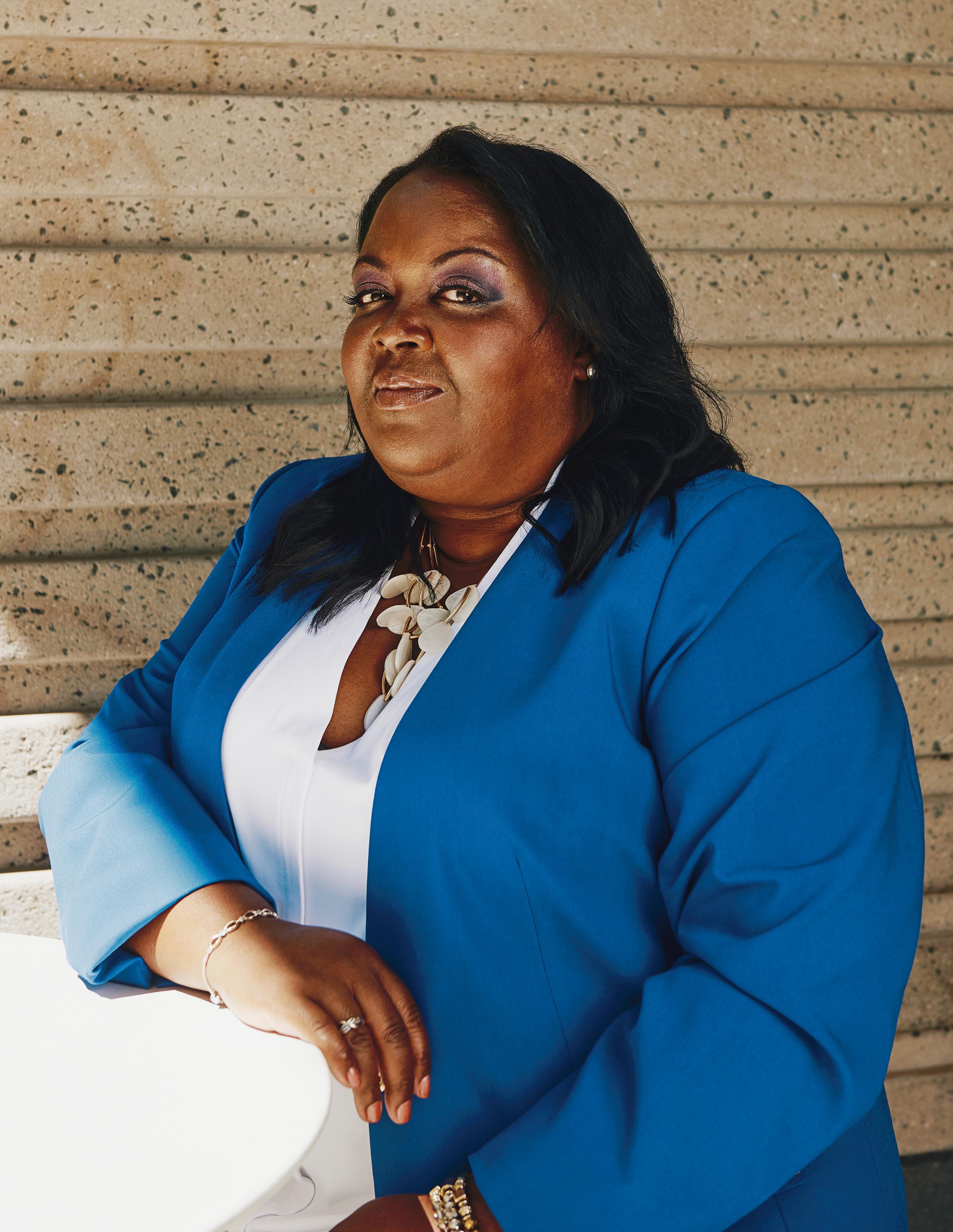
“I feel like everything that I have done in the past has prepared me for what I am doing here. I have a job building something that truly impacts every human being.”
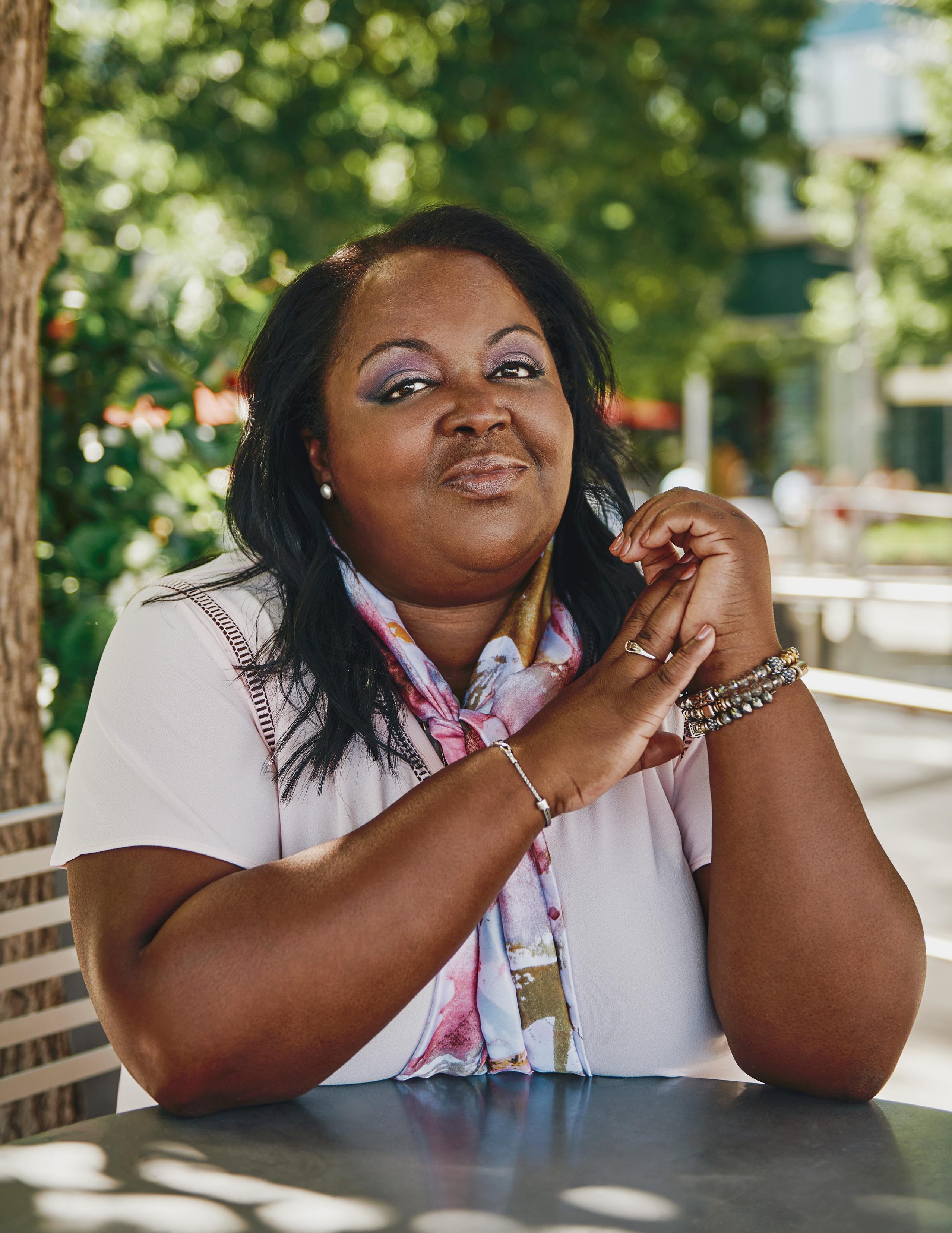
“One pilot project took about four to five months to complete where previously it would have taken over twelve months,” she continues. “It took three months of focused planning and implementation, and it was a huge win. We continue to see the improvements as we mature through this process and implement SAFe [Safe Agile Framework] methodology across the organization.”
According to Jimenez, company-wide improvements are only possible if quality is embedded into every part of the software development lifecycle, beyond just the quality testing department. “[The team is] reflective of the company and our customers, so we need to be responsible for every aspect of quality to best represent IDEMIA as a whole,” she says.
To advance this mentality, Jimenez acts as both an influencer and a mentor. “To achieve best results, it’s important for me to start dialogues and work closely with everyone across the organization,” Jimenez explains. But this part of the job hardly feels like work for the head of quality assurance, since it so closely aligns with some of her personal passions. Outside of her role at IDEMIA, Jimenez has served for years as a senior member of community organizations such as ALPFA (Association of Latino Professionals for America).
“As an Afro-Latina woman in the tech space, I am often the ‘only minority in the room,’” Jimenez reflects. “I want to be able to mentor others, or give back and provide opportunities for people with my similar background to get where they want to be in their careers.” ALPFA’s mission, to empower and develop Latinx men and women as leaders of character, resonates deeply with her. “This organization gave me the tools to develop and navigate through some of the challenges I was experiencing in terms of diversity at work. I drank the Kool-Aid,”
she says, laughing. “I became part of the ‘ALPFamilia,’ and it has been an amazing ride.”
Since joining ALPFA, Jimenez has had the opportunity to serve as president of the Boston chapter, which she led for three years. The second largest chapter in the country, the Boston ALPFA chapter comprises more than seven thousand members. As president, Jimenez fostered professional connections, enabled companies to recruit Latinx professionals, and helped organizations grow and develop their diversity and inclusion missions. More importantly, she has been able to serve as a leader, influencer, and strong voice for Latinx professionals and students both locally and nationally.
Jimenez’s efforts as the chapter president were recognized across the community: she was not only named as one of the top one hundred most influential Latino leaders in the state but was also appointed by Massachusetts Governor Charlie Baker to serve on both the Latino Advisory Commission and the Commonwealth Corporation Board of Directors. “It has been super exciting to be able to work with leaders across all of Massachusetts, to make an impact and influence decisions important for Latinos,” Jimenez says.
Though she has accomplished a wealth of things already, Jimenez is still chasing new goals and opportunities. “I am trying to figure out what the next chapter for Enna is,” she admits. “I have been able to master both the subject matter that I work in and my personal passions for the past twenty-nine years, and now I am looking forward to what the next ten to fifteen years hold for me. I want to have a seat at the table making life-changing decisions that impact women, Latinos, and our students.”
What does quality mean? In this industry, in this community, the answer is clear: Enna Jimenez.
University of Houston Clear Lake

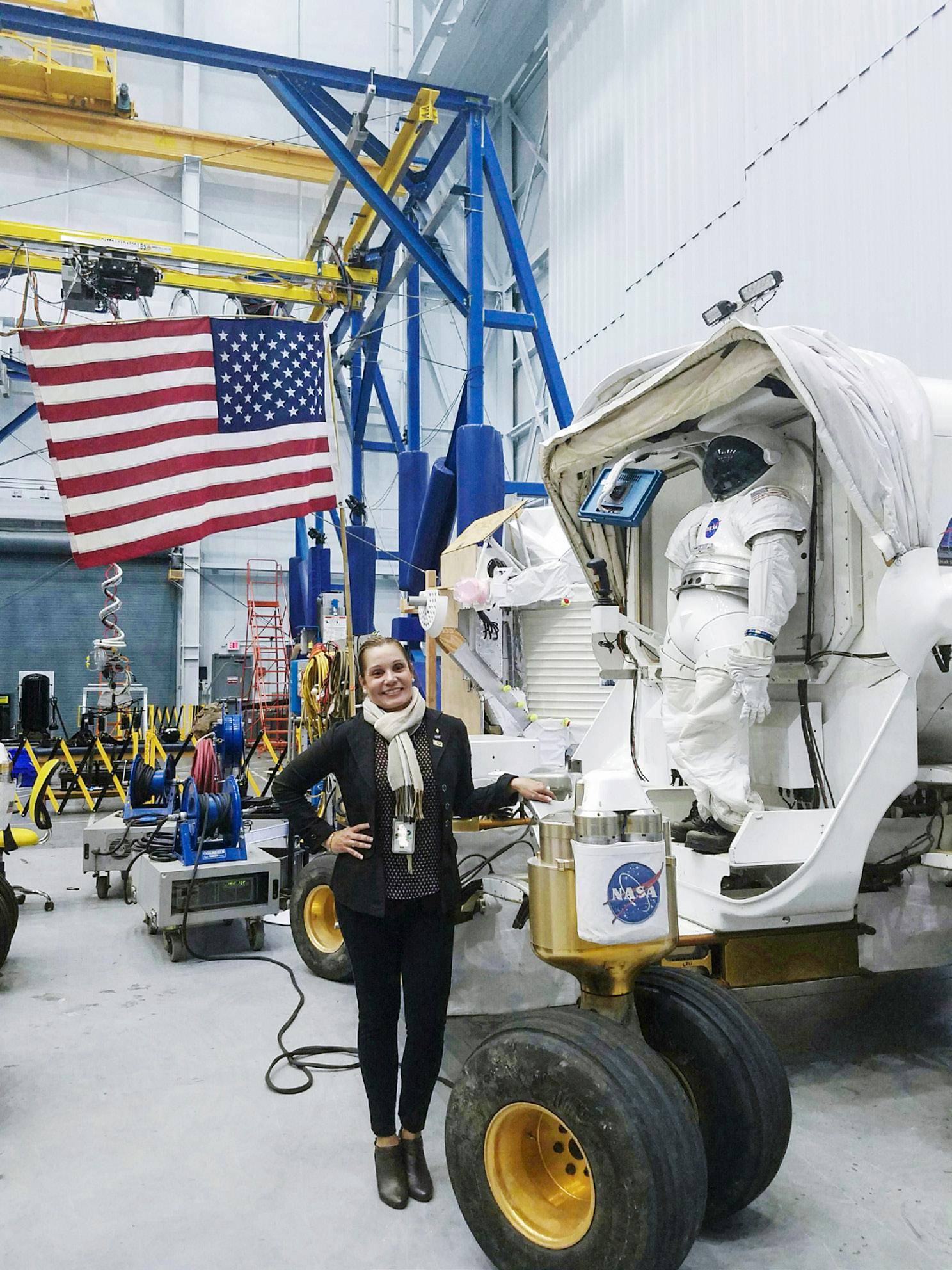
principal engineer for an innovative astronaut training facility as well as a visionary leader in the development of virtual reality (VR) technologies.
“As part of the graphics and simulation team, I cowrote a one-of-a-kind spaceflight ready software called Dynamic Onboard Ubiquitous Graphics (DOUG)” Miralles explains. “The software has been used to support operation and training activities for the Space Shuttle while building the International Space Station (ISS) programs, of which I helped construct a replica in 3-D computer graphics. In a way, I was actually working as an architect because the process entailed taking mechanical objects, assembling them together, and making sure that they all articulated appropriately.”
Miralles never pictured herself as a “space architect,” but her studies helped to that purpose. After enrolling in her first bachelor’s program, she switched her focus from art to computer studies.
“I realized then how advanced the computers were becoming, and I was very intrigued about what they could do,” she recalls of her time at Lamar.
GROWING UP IN CARACAS, Venezuela, Evelyn Miralles dreamed of becoming an architect. Her brother and sister worked in chemical and electrical engineering fields, respectively, and several members of her family were artists. Miralles herself could often be found painting and drawing, and her siblings’ passion for engineering helped her feel at home in the world of STEM. Architecture seemed the perfect blend of her creative ways and scientific talents.
Fast-forward to the 1980s: Miralles moved to the United States to pursue a bachelor’s degree at Lamar University in 1986 and another at the University of Houston Clear Lake (UHCL) in 1990, both public universities based in Texas. After graduation in 1992, she found a position at a government agency located right next door to her university, a position that would launch her career as an architect—of a sort.
From 1992 to 2019, Miralles served in progressive engineering and leadership roles at NASA’s Johnson Space Center, eventually becoming chief
“We were doing at the time, in the late 1980s, basic graphic programming because the computer’s speed was slow. Nevertheless, we could still replicate a sizable number of geometrically sophisticated 3-D graphic objects, which was fascinating for me.
“The computer’s CPU and rendering capabilities were visibly lagging [at NASA], but it was an engaging and very creative time to work on tasks, knowing that I was directly supporting astronauts for human space travel,” Miralles adds with a laugh. “I just really gravitated to that abstract thinking from art and merged it with my computer programming and math skills to accomplish the missions.”
Miralles furthered her knowledge of computer hardware, software, and system design at the University of Houston Clear Lake. But, at the time, not many others had seen the inherent potential in computer science or computer graphics. In 1992, when she applied for a position at the NASA Johnson Space Center, only a handful of individuals had completed actual degrees in the subject, “and very few were women, if any.”
“I was probably the only candidate that had a background in both computer programming and
graphics,” Miralles reflects. “They were looking for that combination of skills because they needed people who could work in the beginning stages of development for a new graphical system that would support the Space Shuttle and the International Space Station (ISS) training and what spaceflight was going to look like in the future. It was truly an innovative time!”
One of just a few women working on the engineering teams at NASA, Miralles would go on to specialize in the technology, becoming the only one to work on NASA’s first VR-ready flight software for human spaceflight training. But her gender wasn’t the only thing setting her apart: Miralles was also the only person in the VR group with an artistic background.
“Art was part of who I was growing up—I naturally visualized things in 3-D,” Miralles says. “Art has also been an influential part of my professional life. It has a tremendous impact on the ability to see challenges in less complicated ways. And, when talking about engineering and programming projects and those types of endeavors, having that perspective in the arts allows you to ask questions differently, and to bring other dimensions to whatever problems you are facing.
“What we brought to the astronauts with our VR training was the immersion of the human being in a synthetic world that doesn’t exist, a world that can only be replicated graphically,” she continues. “Art was part of my process of creation, because I
could see things, have a vision, and then formulate and add the pieces needed to then assemble them onto the real world.”
In essence, Miralles muses, “viewing something through an artistic lens” is like viewing whatever you’re looking at “from a god’s eye view.” And many of the astronauts Miralles worked with—who were lucky enough to see the world from a decidedly heavenly point of view—shared her passion.
“I would say that many of the astronauts had a component in their lives that was artistic, whether that was music or quilting or painting,” Miralles says. “The work entailed such high-level thinking at all times: experience with art can put us back into contact with one’s creativity and with how we connect to the world and others as individuals.
“That is why I support schools that integrate art into their STEM programs through multidisciplinary approaches,” explains Miralles, who returned to her alma mater in 2019 to serve as UHCL’s associate vice president for strategic information initiatives and technology and as a lecturer. Art sustains, inspires, and enables great leaps in thinking—which is exactly what Miralles is looking forward to seeing in the future.
“I would love to see a time when everyone around the world is able to follow an astronaut in real time,” she says, “a time when everyone can immerse themselves through VR as an astronaut steps and maneuvers on the moon’s surface. That would be the pinnacle of my career, a dream finally becoming a reality.”
To Evelyn Miralles, her years at NASA do not mean nearly as much if she hasn’t been able to inspire the next generation in the pursuit of their dreams in STEM fields. She advises all students and young professionals to educate themselves in the area(s) they are passionate about, work consistently at becoming the best they can be, communicate openly and often, and—above all— be resilient in the face of challenges.
“I have never let a computer win over,” Miralles says, laughing. “When facing a problem, I would sometimes go to bed thinking about it and take a break away from the issue for a couple days. But I wouldn’t give up. I would always go back to the problem, ask somebody for inputs, and work out another avenue or approach.”
“I would love to see a time when everyone around the world is able to follow an astronaut in real-time . . . as the astronaut steps and maneuvers on the moon’s surface.”


by her mother,
BY ROMAN NAVARRETTEI’VE ALWAYS HAD THE DESIRE to tell stories, and Telemundo allows me to revisit that, which I love,” says Mónica Gil, an executive vice president and the chief administrative and marketing officer at NBCUniversal Telemundo Enterprises.
When looking at Gil’s journey, one sees a career trajectory marked by excellence and determination. The youngest of twelve children, Gil always wanted to make her parents—a gardener and homemaker from Zacatecas, Mexico—proud. She credits her success to her relationship with them.
Growing up in an affluent neighborhood in Santa Barbara, California, Gil was always cognizant of a sense of “otherness.” “I was aware of both what I had and what I didn’t have,” she explains.
Perhaps inspired by that awareness, Gil’s ambition took shape very early on in life. She embraces the idea of being a leader in her community. “You have to be fierce and confident and not be afraid,” she says.
“Fierce” and “confident” are definitely characteristics that have come in handy for Gil over the years. As a senior vice president at Nielsen, she was
responsible for advancing growth opportunities for major corporations and helping them find what she refers to as their “aha moments” in terms of their outreach to the Latino community. “It was important for me to take out the hassle factor and make the data easy to digest for everyone, no matter who they were,” Gil says.
In 2017, when Spanish-language television network Telemundo began wooing the Nielsen vet away from her job in Los Angeles to a position on their team in Miami, Gil relied on her instincts and made the move in order to continue challenging herself. To her mind, it was one of the best decisions she has made. “It’s in our culture to want to stay close to home, and I had to tell myself I would be OK and to be mobile,” she says.
Today, as a senior leader at NBCUniversal Telemundo, Gil is responsible for overseeing operations, growth marketing, strategy, and insights for the company. She also oversees corporate communications, corporate affairs, government affairs, and corporate social responsibility, as well as diversity, equity, and inclusion efforts.
“I’m still learning every day, and I am very fortunate that I came to Telemundo when they were
Inspired
Telemundo powerhouse Mónica Gil has become one of the most prominent leaders in television


“You have to be fierce and confident and not be afraid of [ambition].”
looking for new content,” says the EVP. “We are redefining Spanish media and bringing in stories that are appealing to all kinds of audiences.”
Anyone who’s ever met Gil knows that besides being resilient, elegant, and strong, she is also very charming. Ironically, or perhaps not, these are the exact words she uses to describe her role model— her mother. Gil, who lost her mother in 2019, takes great pride in the attributes her mom possessed.
“I realized early on that my mom was humble but also very resilient and extremely observant. I was taught to be the same way,” she reflects. “When you don’t have a degree or speak English, you become resilient. You learn how to do things yourself and manage to take great care of each of your children.
“My mom knew exactly what to give each one of her twelve kids at each point of their lives in which they needed it,” she adds.
One important lesson passed on to Gil from her mother was the value of relationships. Gil’s mother instilled in her children the importance of “not getting mad at your neighbor—you never know when you might need them,” recalls the EVP. This insight has stayed with Gil throughout her career. “My mom was humble, but she was never meek,” she stresses.
In fact, looking back on her career, it’s easy for Gil to identify the myriad ways in which her mom’s lessons have helped her thrive. As an undergraduate at the University of California, Berkeley in the ’90s, Gil experienced great camaraderie with other Latinas on campus. Up to that point, she had primar-
ily interacted with Latinas from Mexico, and she relished the opportunity to meet Latinas from other areas of the world.
“I remember walking through campus and passing other Latinas, and there was an instant connection we shared, just because we looked the same,” Gil says. She enjoyed the fact that there was never a competitive atmosphere among her Latina peers, that her undergraduate years were a time of vulnerability that enabled her to develop the kind of “circle of trust” that she utilizes to this day.
Those insights, coupled with her determination to be “adamantly authentic and audaciously assured,” helped Gil find success when she moved to Los Angeles after graduation. After earning a master’s from the University of Southern California, she joined Antonio Villaraigosa’s campaign for mayor—a campaign he went on to win.
“Antonio gave me access to campaigns and causes, and I will forever grateful to him for giving me a shot to begin and build my career in a such a big way,” Gil remarks.
From her early career in politics to her success at Nielsen and her current role at NBCUniversal Telemundo, Gil has proven her value in some of the most competitive industries in the world. She propelled Telemundo’s dramatic transformation from a niche broadcaster to the premier content and cultural hub for Hispanic audiences. And under her leadership, Telemundo has remained the number one Spanish-language network in weekday prime time television for three consecutive years.
Looks like mom’s lessons are still paying off.
“I realized early on that my mom was humble but also very resilient and extremely observant. I was taught to be the same way.”
Living up to Las Vegas standards can be daunting. But MGM National Harbor’s Alex Alvarado knows the secret to success: an unbeatable team.
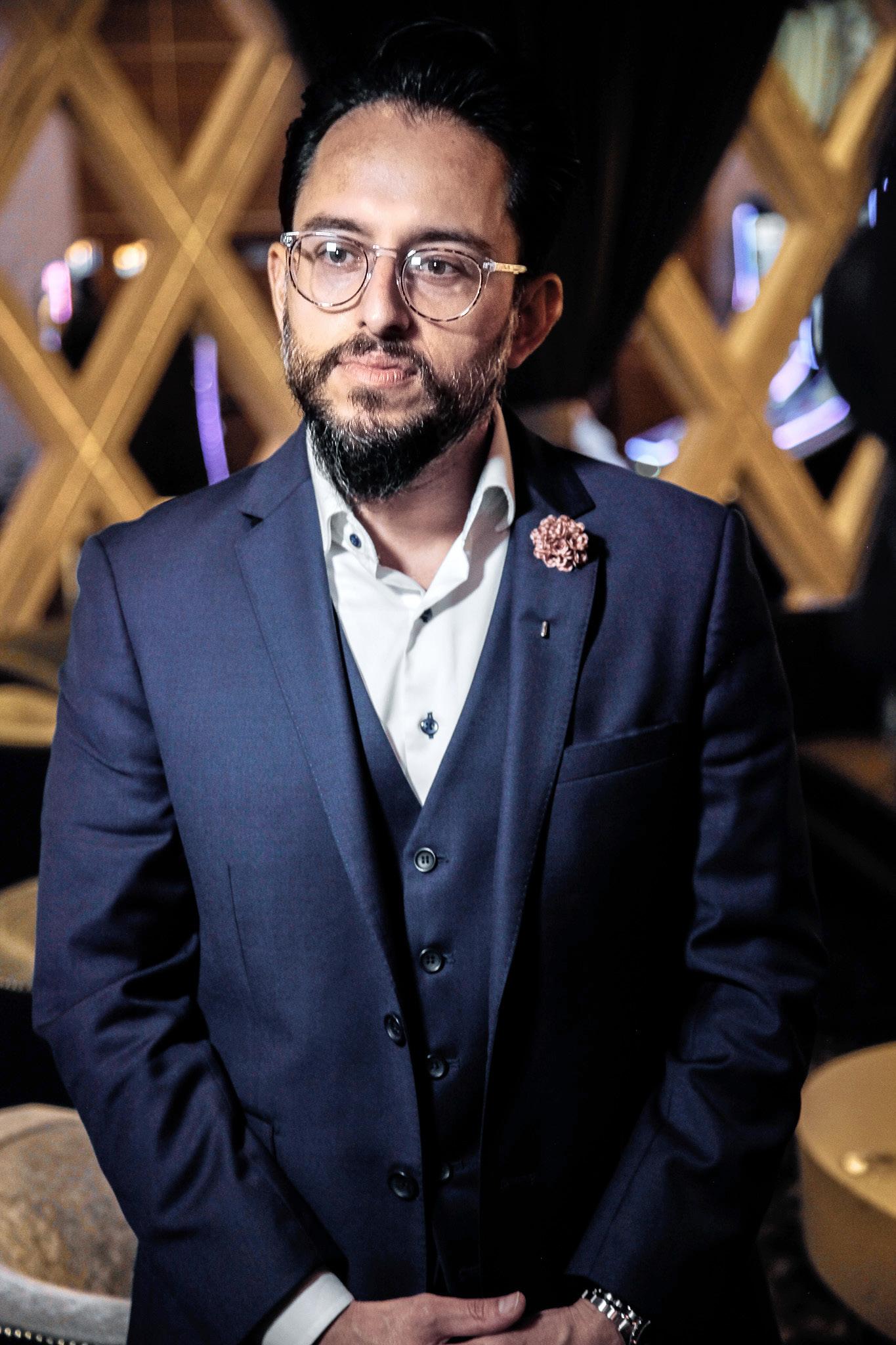 Alex Alvarado
VP of Casino Operations
Alex Alvarado
VP of Casino Operations
Alvarado, a self-proclaimed “casino aficionado,” did not always envision himself working in hospitality or gaming. After graduating from college, Alvarado began working in the IT space—a career move that eventually granted him a very special opportunity. “I joined a project that required the installation of Wi-Fi in just about half the hotel rooms on the Las Vegas Strip,” Alvarado explains. This project opened doors for Alvarado and ultimately led him to receive an offer to join international hospitality and entertainment giant MGM.
For Alvarado, making the choice to join MGM wasn’t a difficult one. In his past interactions with MGM, he had always had remarkably positive experiences with each and every staff member he encountered. “Whether these folks were front of the house, back of the house, or admin, I enjoyed every interaction I had,” he affirms.
When Alvarado joined the team at MGM, he pivoted from a history of more behind-the-scenes roles to a front-of-house position. “I was paying jackpots,” he says, laughing. “I never imagined that I would be a slot manager, but over time, this position afforded me greater opportunities. I went on to performing more administrative tasks, to then sitting in more analytical roles, then ultimately working in strategic roles—which have taken me to where I am today.”
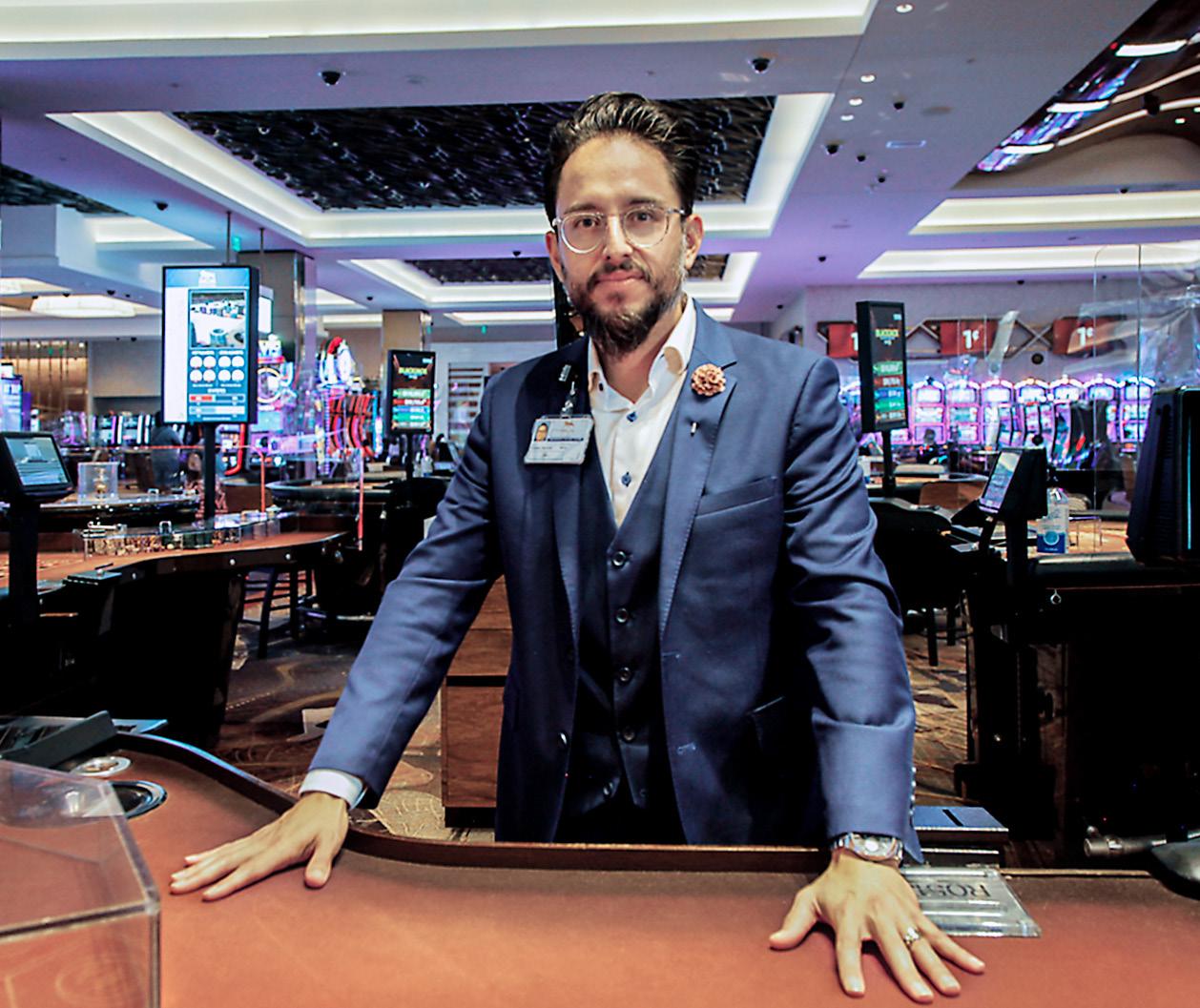
In the fifteen years since Alvarado first started at MGM, he has changed employers and relocated to other countries—and other continents—to further develop his career. Now, Alvarado finds himself back at MGM. He currently serves as vice president of casino operations at MGM National Harbor, a luxury resort and casino based in Washington, DC. Alvarado oversees all
gaming operations that take place at the resort: paying out jackpots and slot machines, climbing the slot operations ladder, and driving an innovative gaming experience through the large-scale deployment of electronic table game terminals and contactless payment solutions.
“My role is focused on the strategic development of the business,” says Alvarado, who sees unlimited potential in mobile engagement and the introduction of virtual reality and augmented reality technologies into the casino. He likens his strategy to an etch and sketch. “I’m always asking myself, Are we getting the most we can get out of this set of resources? How can we continuously optimize or re-sketch out the plans for those resources?”
For Alex Alvarado, growing up in Las Vegas not only provided him with one of the world’s most exciting cities as a backyard but also offered him a front-row seat to the premier experience in the hospitality world.


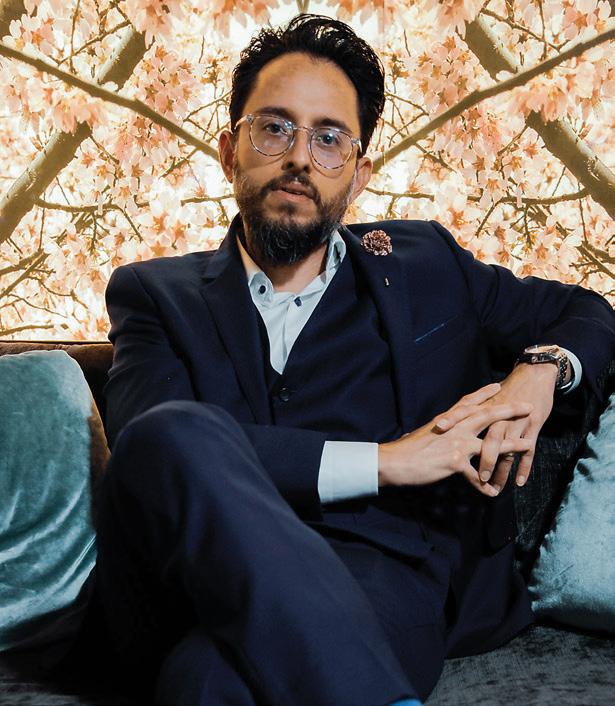
IGT would like to congratulate Alex Alvarado on this well-deserved recognition in Hispanic Executive magazine.
We are proud to call Alex a partner and pleased to see the leadership and talent he brings to the gaming industry acknowledged.
Alvarado attributes the successes he has found in his current role to his early experience in Vegas. “I am so incredibly grateful that I started my career in Las Vegas. On so many different levels, Vegas is the pinnacle,” he says. “The work ethic and the culture that has been established there over decades can be chalked up to the genuine pride that people take in their work.
“It isn’t service,” he adds. “It’s hospitality at a degree that I have personally never seen achieved in another market.”
While living up to Las Vegas standards might seem intimidating and difficult to achieve, Alvarado uses his experience in Vegas as a benchmark for his own goals and expectations for his team. “I know that we are not performing at the level we can be when I find myself pointing back to that experience. I’m always pushing and challenging my team, saying, ‘This is the level that we can achieve.’ And the best team members will react to that in a positive way,” he says.
Alvarado takes great pride in the team that he has built at MGM National Harbor, not only because they are hardworking, versatile team-players but also because they make his job “incredibly fun.”
“I learn a phenomenal amount from my team on a regular basis,” Alvarado enthuses. Some members of his team have been in the business longer than he has, and others are brand-new to the business. But each employee, the VP emphasizes, brings a critically important perspective.
“My team members know that I am always looking for a better way to solve problems or drive results, and we truly share this vision. Everyone is a part of the continuous improvement process,” he explains. According to Alvarado, this team alignment and collaboration help drive the business forward and also promote the professional development of his team members. “I want my team members to be strong assets in their roles here but also to be prepared for their next roles, wherever that may be—with us or somewhere else,” he says.
Alvarado also places great value on creating an intentional work/life balance, though he acknowledges that at times in one’s career journey, one has to be willing to make sacrifices. “You always have to be honest with yourself about what you want from your career and from your life,” he asserts. “If you suffer in one area, you’ll suffer in the other. Luckily for me, I have a career that makes this balance incredibly natural.”
“Vegas is the pinnacle. The work ethic and the culture that has been established there over decades can be chalked up to the genuine pride that people take in their work.”
Chief Legal Officer Juan Pablo Rosas helps Rassini expand on its successes, both within the company and throughout local communities, by keeping one eye trained on the road ahead
IF YOU HAVE EVER BOUNCED ALONG IN A TRUCK made in North America, chances are you rode on a Rassini suspension system. The majority of North American light vehicles use the company’s suspension products, and one-third rely on Rassini disc brakes. But with an engineering team of dozens and dozens, a supply of approximately one hundred robots, and an array of innovative new tools on hand—including the largest 3D printer in Latin America—Rassini is looking to the horizon and finding new ways to improve on its own impressive past.
Rassini’s chief legal officer, Juan Pablo Rosas, is himself always peering through the windshield to understand what is coming. As the go-to leader for all legal matters, a member of the board of management, and secretary of the board of directors, the attorney leads a robust legal team through a constant process of planning and coordination. The in-house work includes negotiations with clients, financing, and corporate matters. “My main duty is to understand the management’s vision and its strategy in order to anticipate the best legal route,” Rosas explains.
But Rosas does more than help safeguard drivers by forwarding the Rassini corporate vision. The company is deeply committed to promoting community wellbeing, he explains, and places a prime focus on environmental and social governance. This includes issues related to sustainability—the company is always taking issues like water and energy consumption into consideration in its manufacturing processes.
But to Rosas and everyone else at Rassini, creating a positive impact is about more than adopting ecofriendly production measures. “Working with the community is in our DNA,” Rosas emphasizes, describing company events such as annual facility family days where employees are able to show off their workplace to their partners and children. But Rassini, as Rosas notes, is not content to contain community involvement inside facility walls.
The CLO supports the company’s efforts to navigate and support the larger communities surrounding Rassini sites—which, in recent years, have included company-wide responses to natural disasters like Hurricane Harvey and the recent earthquake in Mexico as well as the construction of various housing facilities, public parks, and community centers.
On top of this, the company has dedicated itself to helping address the opioid crisis currently devastating the area near Rassini’s Ohio facility. In partnership with Harvard University Medical School, the Northwest Community College, and local hospitals and wellness centers, Rassini created an education, prevention, treatment, and recovery program called Responding to the Opioid Crisis in Northwest Ohio. The program is now being replicated in other areas.
These types of transformational efforts, Rosas knows, are critical to both Rassini and the communities it engages with. He takes pride in building these relationships, certain that, as a result of these efforts, “the community will look to the company differently, as a part of their community.”
In addition to driving advancements in local communities, Rassini continually looks inward to find areas of improvement. Indeed, as a member of the company’s ethics committee, Rosas has helped oversee the evaluation of a global system that Rassini uses to facilitate the filing of integrity claims. Rassini deems it essential,
Juan Pablo Rosas Chief Legal Officer Rassini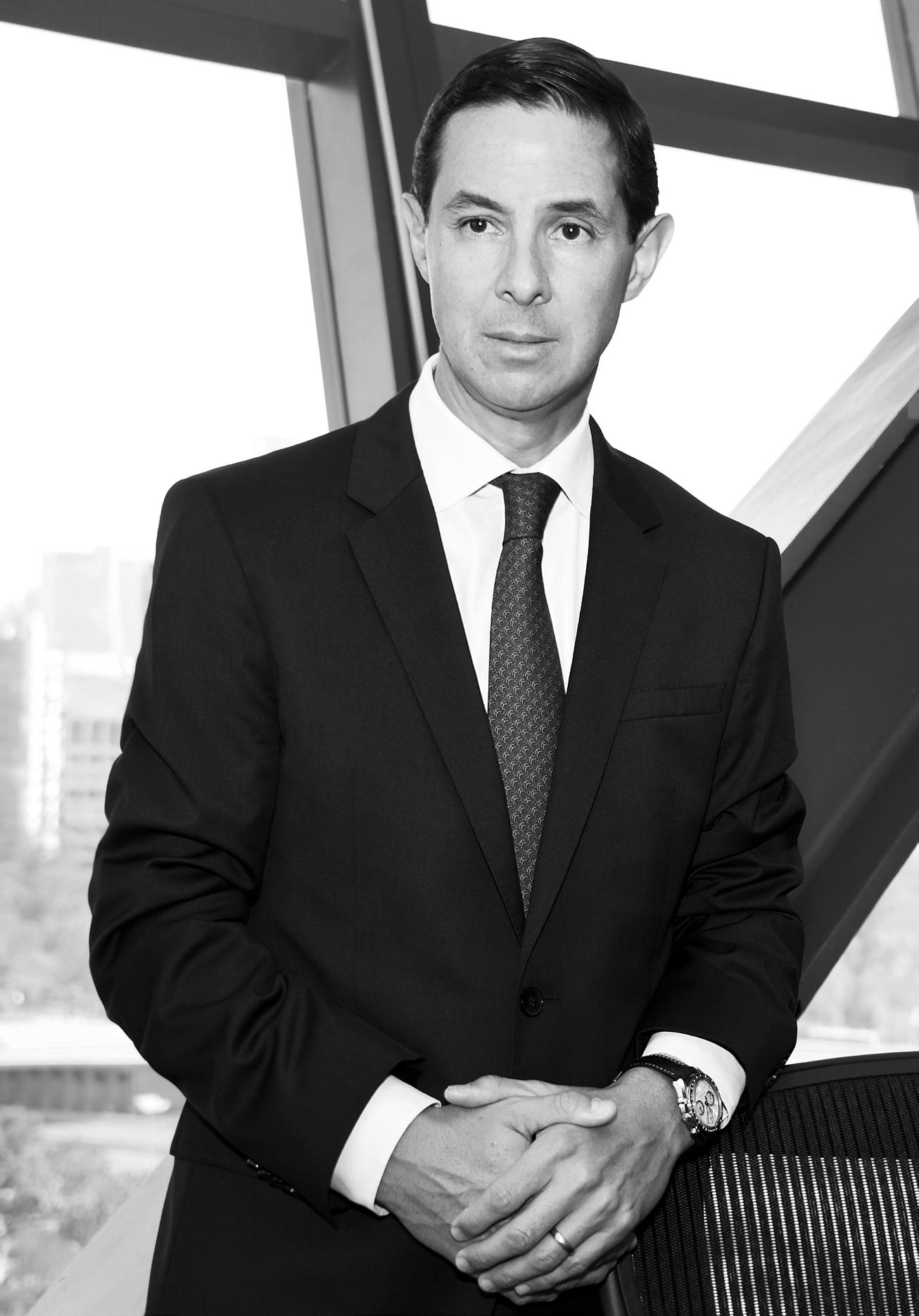
the CLO emphasizes, to find ways to drive the business forward while following the moral imperative.
“The company is continuously looking for ways to improve, no matter the previous success,” he says. “The culture of our company is what makes us able to face the future, overcome any challenge, and achieve goals.”
In fact, it is the Rassini culture that prompted Rosas to accept the CLO position seven years ago. By leaving a successful partnership in private practice, Rosas says, he gained “the opportunity to be more proactive, more dynamic, and to be a part of management decisions.” He enjoys fully conceptualizing the company’s aims, an integration between the business and legal side not usually afforded to private practice attorneys.
As Rosas has learned, being enmeshed in the company’s operations includes the nitty-gritty of manufacturing. He laughingly says that he likes cars “just fine,” but admits that touring the factories to understand how to achieve best productivity and value is most satisfying for him. “Sometimes I think I should have been an engineer,” he says, chuckling.
Rosas’s deep knowledge of Rassini’s production practices has been critical to the company’s ability to respond to the safety and economic challenges wrought by COVID-19. He has been involved in the evaluation of various protocols for facilities, testing, and employee education, and Rassini has administered at least three thousand COVID-19 tests to employees working in its Mexico City facilities. “We must make people safe,” the CLO stresses, but paired with that urgent need for immediate physical safety is “a priority to safeguard every job.”
Fortunately, Rosas has navigated several unexpected situations in the past and has a general road map for these types of situations. “You build a task force and do the work, adjusting skills and experience for the situation,” he says. “If you are not an active player, someone else will make decisions on your behalf.”
Rosas continues to look down the road at what is to come. No matter the future brings, the chief legal officer remains ever ready to help guide Rassini in the right direction.
As the leading Mexico-focused full-service law firm, Santamarina + Steta aids national and international clients in paving their way inside the country. We represent clients in all kinds of transactions, identifying diverse work styles and philosophies to shape comprehensive optics into customized solutions with successful results.“The company is continuously looking for ways to improve, no matter the previous success.”
We are a full service Mexican law firm, developing strategic solutions that produce successful results for our clients, ensuring reliable, multidisciplinary, integrated and comprehensive approaches. We make our clients’ challenges our own-this is our seal of quality and excellence.
Juan Pablo Rosas General Counsel
Research chemist turned lawyer Christina Diaz has helped streamline processes and enhance the D&I focus in GlaxoSmithKline’s external law firm engagements
Christina “Tina” Diaz sought refuge in the hard sciences. She majored in biochemistry at Columbia and quickly wound up working in the pharmaceutical industry. “I really loved the sciences and the certainty that there’s always an answer somewhere,” Diaz says. “It’s not wishy-washy: the answer has to be in there somewhere That always appealed to me.”
The bench chemist went on to spend three years working on new medicines designed to combat atherosclerosis and heart disease by reducing cholesterol levels.
“This was years before the medicines common today were developed and became the standard of care,” Diaz explains. “We had a whole team of scientists working to synthesize and test potential medicines. As a research chemist, I loved the pursuit of scientific goals that were important for people and could change lives.”
But the lab bench, it turned out, wasn’t where Diaz believed she could be the most impactful. After assisting on a number of patent applications, she elected to attend law school, jumping headfirst into a field almost entirely predicated on arguing in the gray of unknowns. Nevertheless, she felt compelled to return to the pharmaceutical industry, where she could continue working to support the front lines of research and development for critical treatments and cures.
Now a vice president and associate general counsel at GlaxoSmithKline (GSK), a global pharmaceutical company headquartered in the UK, Diaz has found a way to combine her love of science and the law.
Diaz’s previous career is a firm foundation for her present role. “It helps to not be afraid of the science in this job,” Diaz says. “More holistically, I have a deeper understanding of what scientists are going through in their minds. I understand that these are people who are clearly devoted to and believe in their mission. That desire to achieve is what drives any scientist, so I look at it as my job to help answer whatever questions or issues might arise in the pursuit of that mission.”

The old lab bench tendency to go looking for the perfect answer can sometimes set the GSK counsel back, but that’s where the lawyer’s legal training and experience takes over. “There are often many issues to consider,” Diaz says. “When providing legal advice, there may not be a single answer. There will always be a number of uncertainties, and getting to the right decision will require living with those uncertainties, understanding the business priorities, and ultimately applying our values to reach the right decision. It is this paradox between the law and science that can be most challenging but also the most interesting to me, and I do my best to provide the best counsel I can.”
According to Diaz, GSK’s commitment to diversity and inclusion issues is a cut above its competition. The company has earned several awards for its D&I efforts, and Diaz says that the COVID-19 pandemic, in a strange twist, has provided a unique opportunity to see some of those efforts grow more quickly than they might have organically.
“As difficult and tragic as the pandemic has been on many levels, the silver lining is that it has allowed our people to be their ‘authentic selves’ more readily,” Diaz posits. “You’re on Zoom calls with people all day. You’re seeing who people are in their homes, what distractions they may have, and—in a way—you are better able to see and understand what your colleagues are juggling on a daily basis. What has emerged is the recognition that despite the varied circumstances
Christina Diaz has implemented a system to create better and more transparent relationships with GlaxoSmithKline’s (GSK) outside counsel. Through the Premier Legal Partner (PLP) program:
• GSK has developed a panel of law firms in its most active practice areas to deepen its partnerships with external legal providers and drive efficiency for the in-house legal team.
• For the majority of matters, GSK is committed to engaging the firms identified as PLPs in those designated areas.
• GSK evaluates proposals from law firms based on five areas, including the proposed strategy, diversity of the firm, and specific subject matter expertise.
• A key component of the process is a “reverse e-auction,” during which firms bid on work, are able to see the lowest competitve bids by phase, and then determine whether to adjust their own bids.
facing each individual during the pandemic, our team is able to do their jobs—and, in many cases, do them even better.”
Diaz says that while she’s ready to get back into the office, she’s convinced people will eventually return to work more comfortable in their own skin, with more empathy for each other and their complex daily lives.
More strategically, Diaz has supported the legal department and its D&I initiatives in her role as head of GSK’s Global External Legal Relations Team. GSK has developed its own Outside Counsel Selection Initiative (OCSI), which helps the company select the right counsel at the right price—with an important emphasis on diversity. “Using formal scorecards, we look at everything from the fees to the diversity to the expertise of the firm,” Diaz explains. “As diversity is one of five criteria that we evaluate, the law firms know that it is front and center for the company.”
Since implementing the scorecards, GSK has seen a significant improvement in the diversity of teams proposed by law firms to handle a particular matter. Indeed, GSK received Buying Legal Council’s Diversity and Inclusion Award in 2019. In addition, and with increased focus in light of recent events in the US and globally, Diaz has worked with the diversity leads within GSK to engage the key PLP firms on D&I. Together, they have explored new and better ways to partner on these issues. “I think it’s been working,” Diaz says. “But we’re always looking to improve and collaborate with and encourage the firms to think that they can do better.”
“What has emerged is the recognition that despite the varied circumstances facing each individual during the pandemic, our team is able to do their jobs—and, in many cases, do them even better.”

The firms themselves concur with Diaz’s assessment. “Tina’s dedication to inclusion is mission critical and an inspiration to law firms like Kirkland. We are proud to call GlaxoSmithKline a client and Tina a friend,” says Jay Lefkowitz, a partner at Kirkland & Ellis LLP. “The diverse set of voices Tina regularly assembles for all her cases makes GlaxoSmithKline’s legal team one of the strongest in the industry.”
Sean Fahey, a partner and chair of the Health Sciences Litigation Practice Group at Troutman Pepper, agrees. “Tina is a remarkable leader, and we appreciate how she has advanced D&I at GSK,” he says. “D&I are core values of our firm, and Tina inspires us to do even more.”
But the PLP program has done more than just help GSK identify its most effective legal partners. “We were hearing from our firms that they didn’t always know where they stood with GSK,” Diaz explains. “It became clear to me that the best way to approach this was to work on developing deeper relationships with the law firms built on mutual trust, so that they knew we valued them for more than just the current transaction in front of us.”

Along with its focus on diversity, the PLP program’s emphasis on transparency and partnership is a win-win, Diaz says. While controlling legal fees are a priority for her team, there is more to the PLP program than that: “I always tell my team that we don’t want a law firm that’s working for free,” she says. “That’s not fair for anybody. We want to work with firms with whom we’ve developed a good relationship, on terms that are fair to both of us.”
A streamlined process to help address a litany of potential unknowns and solve a number of concurrent problems? It’s a legal solution that almost seems scientific.
doeLEGAL congratulates Christina Diaz on receiving this prestigious honor. We proudly support her leadership in advancing GlaxoSmithKline’s legal operations. doeLEGAL values its longstanding relationship with GSK’s legal team, as their trusted partner for enterprise legal management solutions. We look forward to providing legal technology solutions that optimize their efforts.
“I always tell my team that we don’t want a law firm that’s working for free . . . . We want to work with firms with whom we’ve developed a good relationship, on terms that are fair to both of us.”
At Troutman Pepper, diversity and inclusion in law are core values. By creating a diverse, inclusive and welcoming environment, we achieve better results for the clients we serve.
Troutman Pepper Hamilton Sanders LLP

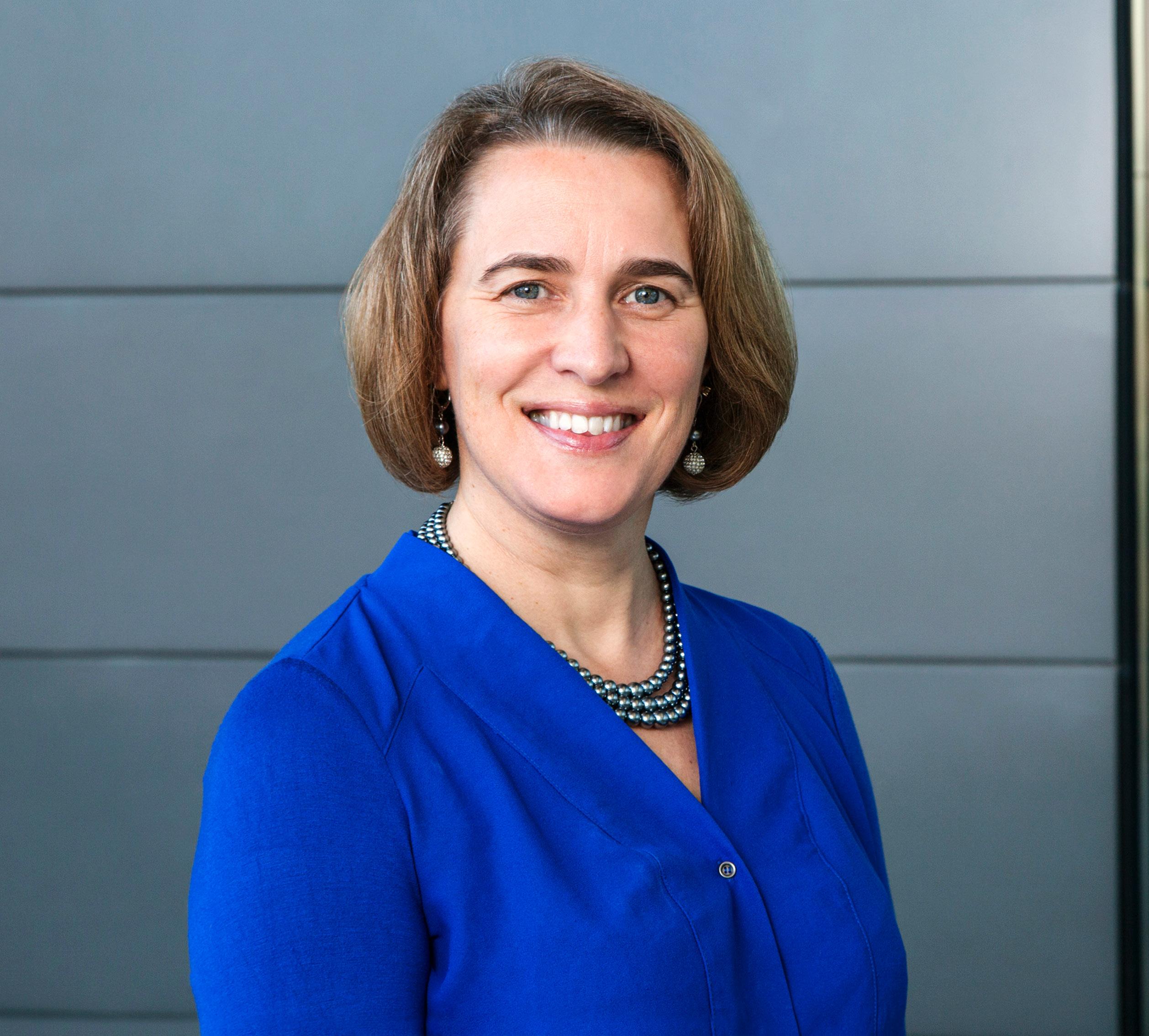
Michelle DeBella may have already crafted her own role and built a team from scratch at Lyft, but that won’t stop her from pursuing the next challenge that comes her way

But for DeBella, solving puzzles is more than a hobby: she puts that intellectual curiosity to work every day as VP of finance strategy at transportation network company Lyft, and she has relied on it throughout her career as motivation to continue seeking out new roles and new challenges.
However, years before she created her current role with the encouragement of Lyft CFO Brian Roberts, DeBella was approaching her career choices from an entirely different perspective. “I grew up very poor, so the big thing was I just never wanted to be in my parents’ position,” she explains.
Her quest for economic security led DeBella to become an accountant. But by the time she left her in-house position at Coram Healthcare to return to a role at leading accounting firm Ernst & Young, DeBella had come to a realization: she drew professional satisfaction from learning, growing, and overcoming challenges. This understanding pushed her away from the routine nature of work in industry accounting and motivated her to begin factoring what she enjoyed doing into her career decisions, rather than basing them on necessity alone.
In 2009, DeBella left Ernst & Young and accepted an opportunity to oversee internal and external consolidated financial reporting at Hewlett-Packard, the information tech-
nology titan. At HP, she discovered that her leadership skills were as much of an asset, if not more so, than her technical expertise. Her 2011 promotion to vice president of internal audit only confirmed this.
“It was actually kind of a daunting role,” she admits. “But the good news is, there’s a little angel that sits on your shoulder and whispers in your ear, ‘Hey, if the CFO is asking you to take this job, you should probably just say yes.’”
Over the next six-plus years, DeBella implemented a global location strategy and supervised elements of HP’s 2015 split into HP Inc. and Hewlett-Packard Enterprise. She also launched the company’s first internal initiative to support and unite women in finance. Eventually, though, DeBella knew she was ready for more. As she puts it, “I was itching to do something else. Good leaders take on lots of different roles and take on lots of different challenges.”
That urge to seek out a new and challenging position led DeBella to Uber, Lyft’s main competitor in the ride-share space. She hoped that Uber, a known disruptor that was undergoing a cultural overhaul at the time, could present her with the challenges she was craving.
Her hopes proved true. At Uber, DeBella found new puzzles to solve, including the
“There’s an odd energy I get from them,” she says of her fondness for brainteasers and jigsaws.
financial transition the company was undergoing as a result of its 2019 IPO. Still, DeBella knew that she could do more: contribute to a company’s success beyond the responsibilities associated with a traditional internal audit function.









Soon, an offer from Lyft caught her eye— one that made it clear that Lyft was open to a more expansive interpretation of a leadership position in finance. For the first time, DeBella was able to write the rules for her own role and develop her position in a way that ensured she would continually test her abilities.

Next came the hard part: delivering on her potential. As she had promised, DeBella built Lyft’s internal audit team and enterprise risk management program from scratch. She then broadened the scope of her work, leading transformation and governance efforts and shaping forward-looking finance organizational design and strategy. All the while, she has continued to demonstrate her commitment to increasing workplace inclusivity by redefining best practices for hiring and retaining a diverse team.
More recently, DeBella has been adapting her plans for Lyft in response to the COVID19 pandemic, which has strengthened her resolve to operate with intention and to lead with empathy.



Pandemic or not, DeBella calls herself an optimist. “Even as I think about the challenges we have in working or leading during these times, I remember that my best career breakthroughs have been when I hit walls,” she says. “I find that the best things tend to happen when somebody has a high degree of passion and emotional investment in what they’re doing.”
Fortunately, the walls, the challenges, the puzzles––those are what generate DeBella’s passion. Her “best thing” will always be that next hurdle.

“Even as I think about the challenges we have in working or leading during these times, I remember that my best career breakthroughs have been when I hit walls.”
Allied Orion Group (AOG) in 2001 as an acquisition analyst, he was a fresh-faced college graduate from the University of North Alabama. Nearly twenty years later, he’s CEO of the company.
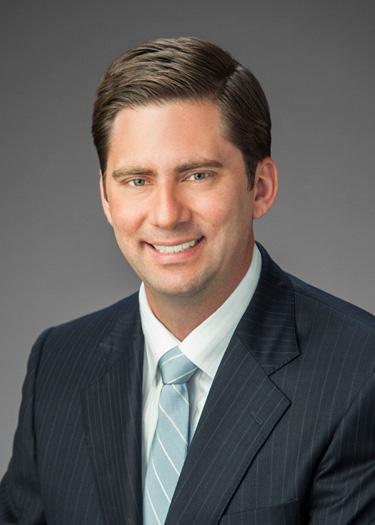
One of the largest fully integrated property management, investment (development and acquisitions), and construction firms in Texas, AOG’s growing owned portfolio spans approximately two thousand units. The company manages nearly $3.5 billion in properties for third-party clients and has a proven track record of maximizing risk-adjusted returns by adhering to rigorous underwriting and proactive asset management. Since 1985, AOG has developed or acquired approximately $1.6 billion in apartments, using funds it raises as the primary vehicle to deploy capital in multifamily properties.
As CEO, Rivas must draw on his experience to lead the company through both fair weather and storms.
Of course, working in residential real estate wasn’t Rivas’s first career plan. Growing up in Venezuela, he had dreams of being
a world-class professional tennis player. “But to do that, you need a lot of resources,” he acknowledges. While that realization inspired him to seek out a business career, Rivas did not entirely give up his passion for sports. He earned an athletic scholarship to the University of North Alabama and played tennis for the school before graduating with a bachelor’s and later an MBA.
It wasn’t long after his graduation that AOG knocked at Rivas’s door, looking for someone with his career profile. The company sponsored him to work in the United States, and the rest is history.
Over the past two decades, Rivas has moved through the ranks at AOG, learning everything there is to know about roles in construction, leasing, apartment management, development, and more. In 2018, he was promoted from chief investment officer to CEO and principal—a move that, if anything, merely formalized many of the responsibilities and tasks he had already taken on.
Rivas’s leadership abilities are apparent even to AOG’s outside partners. As Jeff
Whetzel, SVP of the commercial division at Stewart Title notes, “Stewart Title is honored to provide title and escrow services for Ricardo Rivas. His leadership, knowledge, and proven track record in the property management industry are second to none. Congratulations, Ricardo!”
Moving up the ladder of responsibility at AOG taught Rivas more than a deep understanding of his company; it also illustrated the crucial skills he would need as a leader. “It’s one thing when you’re not leading the group and you can’t see the overall direction,” he explains. “Leading the entire company is a whole different story. It makes you look at things in a different way, having to take into consideration all aspects of the business when making decisions.”
As a leader, Rivas focuses on empowering his team and giving them the guidelines to do what they need to do. “It’s like soccer: the whole team isn’t running toward the ball and kicking at the same time, forming a dust cloud,” he says. “You pass the ball to each other, embracing teamwork and leading to brilliance and innovation.”
Due to his long tenure at AOG, Rivas has a keen grasp of the scope of the company’s business and knows what to aim at in order to achieve AOG’s goals. “It’s a big responsibility, for sure,” he says. “But the division heads we have are great at what they do, and I can rely on them.” The CEO fosters a collaborative dynamic with AOG division heads and encourages them to come to the table with problem-solving measures and innovative ideas.
Finding the right people to populate that leadership team, however, takes careful consideration. “Our culture, if I had to describe it, is autonomous,” Rivas explains. He puts his associates first, giving them latitude to make decisions within the framework of the company’s goals. According to the CEO, this culture of autonomy is balanced by a supportive, family-oriented atmosphere
and the genuine positivity and enthusiasm of AOG’s diverse associates.
In 2020, as the nation started seeing the economic impact of the COVID-19 pandemic, both AOG and its associates were put to the test. “The key for us has been to stay flexible and not plan ahead more than a week at a time,” Rivas says. In addition to an uncertain environment, the company has had to navigate federal eviction moratoriums, internal staffing measures related to work-from-home orders, and other challenges.
But the pandemic has also pushed some exciting new initiatives to the forefront, including virtual property tours, self-guided tours, and flexible work spaces where workers come in and share office space as needed. “All


those [initiatives] are not going to go away,” Rivas predicts, even after the crisis is over.
No matter what challenges the industry is seeing, Rivas urges young professionals interested in the apartment business to remember one piece of advice: exercise patience. “It took twenty years for me [to reach this position],” he points out. “Any position I had at the company, I did the best I could. Not because I wanted to be where I’m at today, but because I wanted to learn and step out of my comfort zone.”
Rivas receives invaluable support at home from his wife, Valarie, which has helped him dedicate the time needed to continually self-improve and lead a company like AOG into the future.
Eighteen25, an eight-story mid-rise located in downtown Houston (top).Janet Castellano has cultivated a reputation as a dedicated servant leader, fierce advocate, and staunch supporter of Bristol Myers Squibb employees

The world may not know much about Castellano, who works primarily behind the scenes as senior corporate counsel of HR law. But people working in all functions at BMS— research and development (R&D), commercial manufacturing, finance, IT—not only know who Castellano is but are keenly aware of the value she brings to the organization.
Castellano attended Seton Hall University as both an undergraduate and a law student. Located just a few miles from Manhattan, Seton Hall focuses on prepar-
ing students to become servant leaders in a complex, global society.
Castellano certainly seems to have taken that philosophy to heart: since graduating from the Seton Hall University School of Law in 1999, she has dedicated herself to serving both causes and people in need. In 2018, she was named to the volunteer honor roll for the Pro Bono Partnership, an organization dedicated to providing free legal services to nonprofits around the country. And since 2015, Castellano has overseen
Janet Castellano works at one of the most well-known companies in the world. Headquartered in New York City, Bristol Myers Squibb (BMS) is one of the leading manufacturers of desperately needed pharmaceuticals and biologics for cancer, diabetes, cardiovascular disease, and other serious conditions.
While Bristol Myers Squibb (BMS) has a long history of addressing health disparities in the US and abroad, the COVID-19 pandemic and racial unrest in the United States have motivated the pharmaceutical giant to find more and better ways to support the diverse populations it serves. In 2020, BMS committed to the following goals:
$300 million invested over the next five years to expand and accelerate D&I and health equity efforts
250 racially and ethnically diverse clinical investigators trained to enroll underserved patients in clinical trials
$1 billion spent globally by 2025, in partnership with Black- and diverse-owned businesses, to create jobs and generate positive economic impact in underserved communities
affirmative action and equal employment opportunity (EEO) efforts at BMS.
Lowenstein Sandler, a national law firm known for approaching each client and each case with integrity and respect as well as for a commitment to pro bono work on behalf of both individuals and communities, is pleased to have helped Castellano develop this kind of leadership style during her six years at the firm.
“Lowenstein Sandler is proud to call Janet Castellano of Bristol Myers Squibb a firm alumna, client, and friend; we congratulate her on her many accomplishments— especially in D&I—and look forward to our continuing collaboration,” says David M. Wissert, a partner as well as the general counsel and chair of employment practice at Lowenstein Sandler.
To this day, Castellano remains heavily involved in BMS’ D&I programs. But of course, as an experienced employment law attorney, she also supports the BMS workforce in a number of other ways.
When Castellano joined the pharmaceutical giant in 2006, she began working to support the company’s manufacturing and R&D departments. Since then, her responsibilities have expanded, and she is now tasked with providing legal support to the company’s “legal think tank” as well as to finance, IT, and other business-enabling functions. These functions are the backbone of the
organization, Castellano explains, and she is excited to help them thrive.
In the past two years, however, Castellano and her colleagues on the BMS team have faced bigger challenges than ever before. In 2019, the company completed the acquisition of Celgene, a major pharmaceutical company focused on the development of immunology and cancer therapies. As Castellano points out, this was the company’s largest acquisition since BMS acquired Squibb in 1989. Then, in October 2020, BMS announced that it would acquire MyoKardia, a pioneering organization exclusively focused on cardiovascular conditions, for $13 billion.
Castellano and her team have been hard at work integrating those two companies into BMS’ systems. Never, she emphasizes, has she had to help merge such massive workforces and find ways to help them truly come together. But as Castellano’s partners at Morgan, Lewis & Bockius know, she is more than up to the task.
“Janet is practical and partners with the business to help it achieve its goals. This year has presented a series of unprecedented challenges,” remarks Thomas Linthorst, a partner at the firm, “and Janet’s talents have been critical to helping BMS navigate these waters.”
No matter what happens, Castellano delivers—for her colleagues, for the business, and, ultimately, for the innumerable BMS patients around the world.
We salute this well-deserved recognition of Janet’s leadership, knowledge, and integrity.
Our firm is honored to represent Bristol-Myers Squibb as one of its trusted counsel.

DANIEL DIAZ HAS BEEN INVITED to a lot of weddings. It is a by-product of his “family-oriented and collaborative” tendencies—tendencies that have defined his approach to leadership at major organizations across the country and now as vice president of total rewards at Signature Bank.
When Diaz first became acquainted with the world of HR during a high school internship, it was love at first sight. “What drew me,” he reminisces, “is that HR is critical to an organization. You are developing the embodiment of an institution, the culture, the perception.”
Following his high school epiphany, Diaz worked in the HR departments of several finance institutions, his love of numbers leading him to focus on compensation. He then branched out to a position at Continuum Health Services, where he learned about labor relations and the art of job descriptions. Soon, however, Diaz’s affinity for numbers drew him back to the financial aspects of HR: the ensuing years saw him complete compensation- and benefits-related stints at TIAA CREF, Arrow Electronics, and Madison Square Garden.
But as Diaz has learned in his thirty-plus years in the industry, finding success in HR is about more than cultivating a specialized
knowledge of a certain area. As he worked his way up to leadership roles at prominent organizations such as the Federal Reserve Bank of New York, the Environmental Defense Fund, and the Salvation Army, Diaz both honed his management philosophy and gained a critical understanding of how HR departments can—and should—collaborate with their parent companies.
“Not every organization sees HR as a partner,” the VP acknowledges. But Diaz has set out to change that mindset, helping leaders in both the private and public sectors understand that HR’s potential extends beyond mere administrative duties. “We are perceived as an expense environment, but our potential lays with how we sell the company brand to potential human capital, who in turn bring in the revenue,” he argues. In fact, by highlighting the benefits of strengthening the collaboration between HR and other internal teams, Diaz has helped several organizations successfully weather pivotal financial moments.
All these ideas, and more, found their way into Diaz’s syllabus in his days as an adjunct professor for Baruch College. For more than two years, most evenings found Diaz sharing his wisdom on compensation and HR management with aspiring HR
After pivoting from HR management to teaching and back again, Daniel Diaz has found fulfillment in helping employees thrive at Signature Bank
professionals—and he wasn’t afraid to bring in real-world experiences as examples. “Textbooks are antiseptic; they will turn you off,” he says, explaining that he often supplemented assigned readings with discussions of how that information could be practically applied. His classes met this approach met with great eagerness. Diaz still cherishes a thank-you gift he received from one of his students: a small rock with an impression that reads, “To teach is to touch a life forever.”
In 2017, Diaz left the classroom. “People are true characters,” he says, laughing—but Diaz could not deny his true passions. And
in August 2018, the HR expert and finance aficionado found his ideal job: a position at Signature Bank as a compensation manager. Today, as VP of total rewards, Diaz leverages all that he has learned and his natural talent for collaboration on behalf of the employees he serves.
Responsible for overseeing all compensation and benefits at Signature Bank, a full-service commercial bank based in New York, Diaz navigates a dual set of priorities: as VP, he must advocate for employees while maintaining responsibility for company assets, people, and products. To achieve this

“HR is critical to an organization. You are developing the embodiment of an institution, the culture, the perception.”
Daniel Diaz VP of Total Rewards Signature Bank

balance, Diaz says, collaboration is key. He stays in constant communication with Signature employees as well as the company’s management team to remain up-to-date about what employees need and what the company can offer. “My job is to keep employees engaged and motivated by implementing programs that are both competitive and rewarding and to ensure that their experience is enriching,” he says.
Signature Bank has thirty-two private client offices in the New York metropolitan area, including in Greenwich, Connecticut, as well as in San Francisco, California, and Charlotte, North Carolina. As an HR leader, Diaz makes time to connect with his fellow Signature employees, no matter where in the country they’re located. As he points out, “To be a true leader, you must understand what motivates your employees.”
Of course, making himself constantly available does come with a certain set of challenges. “I’m always putting out fires,” Diaz says with a chuckle. Since COVID-19 hit the nation, the majority of the issues he has dealt with have— unsurprisingly—centered on employee exposure, travel, childcare, and other related concerns. However, to Diaz’s mind, such challenges are really an opportunity—in this case, an opportunity to further explore and coordinate with his team on the rollout of enhanced virtual health and wellness programs. As he puts it, “I am reshaping HR to act as a true advocate for employees and, at the same time, keeping the best interest of the organization at hand.”
This is the moment, Diaz emphasizes, that he and other HR leaders have been training for. This is the time for those leaders to really utilize their understanding of human behavior, and their knowledge of organizational operations, to help businesses everywhere rise to the occasion.
“I’ve worked in many organizations that say, ‘Employees are part of our family,’” Diaz notes. “We are really putting that to the test now.”
“To be a true leader, you must understand what motivates your employees.”
JOSE GUEREQUE COMES FROM A SMALL family in Chihuahua, Mexico. As a young boy, he learned the importance of hard work by watching both his parents give their all in their jobs. “I developed a mindset for very hard work,” he says. “Since then, I’ve had a clear goal to become an executive in a technology company.”
And Guereque has fulfilled that goal. Today, he serves as chief information officer for Mexico, Central America, and the Caribbean at Teleperformance, a worldwide leader in outsourced, omnichannel customer experience management.
In his role, Guereque has designed and developed the organization’s IT architecture. On top of this, he is charged with leading a team that provides data security and privacy for clients and developed processes as well as practices and tools that enable the organization to operate more efficiently.
BY KEITH LORIA“I help secure operations 24/7 for more than thirty thousand employees, across five countries, for a mix of international and domestic companies that belong to the Fortune 500 list,” he explains. “Data security and privacy are essential parts of our culture. To protect the security of our clients, we constantly adapt to technology and monitor risks and threats.”
Technology’s constant evolution is not new to Guereque, who began programming while he was in junior high. “My first computer was a Texas Sinclair ZX81 with 1 KB of memory,” he recalls. “It didn’t have a way to save data, so every day that I turned off the computer, I needed to start over again the next day typing everything, which helped me build resilience.”
Inspired by his parents’ examples, Jose Guereque has leveraged his passion for programming and IT—and his years of experience in driving growth for global businesses—to fulfill his dream of becoming an IT executive
An avid outdoorsman, Jose Guereque regularly hikes and bikes in the mountains near his home and goes wakeboarding and wakesurfing with his family every week in the summer.
“There are some days that I have the opportunity of being on the boat with my wife and/or my sons at sunrise, seeing spectacular views, and then I come back and get ready to work,” he says. “It’s a great way to start the day.”
After two years, Guereque upgraded to a Commodore 64, finally allowing him to save his work. He continued building out his knowledge of computers and programming in the ensuing years, attending an evening technical program while still in high school and ultimately earning a scholarship to the best private university in Mexico. Upon graduation, Guereque quickly found an opportunity to work in IT consulting.
“Then I was invited to start a new telco [telephone company], where I had lots of challenges and learnings, from building data centers and contact centers up to telecom and IT architecture and operations,” he says. After some time, Guereque had the opportunity to join the consumer goods world for one of the world’s best-known brands—Coca-Cola— through Arca Continental, the second-largest Coca-Cola bottler in Latin America and one of the largest in the world.
At that time, Arca Continental was a regional Mexican company with an aggressive international expansion plan. He was soon leading CRM (customer relationship management) and ERP (enterprise resource planning) projects and, by the time he left the company, he had executed sixteen mergers and acquisitions in different food and beverage lines of business, helping to grow the business eightfold to $8 billion.
It was that impressive experience that intrigued the leadership at Teleperformance, who invited Guereque to join as the company’s CIO in 2019.
“My boss—Juan Ignacio Sada, CEO for the Nearshore region—was looking for someone to walk by his side to really transform the business from a traditional contact center to a digital integrated business services company, and also become a one-office provider, offering not only customer experience services but back office and knowledge services as well,” Guereque recalls. “I saw this as an opportunity to challenge myself and demonstrate that I’m able to reorganize and transform an organization that was by design a ‘backstage’ area. [It was an] opportunity to make the organization more customer facing, which opens a whole umbrella of new projects.”
Of course, Guereque hasn’t been executing on this transformation by himself. As CIO, he leads a multinational team of more than three hundred individuals—people whom he credits with being strong business enablers as well as client-centric experts.
“Teleperformance has the most tenured leadership team in the industry, and IT is no exception. Most of the members of my team have been working for years in the company, and they are very skilled in the tools and knowledge of the business,” he enthuses. “We are truly committed to transforming passion into excellence, which for our IT team means making a reality of transforming the satisfaction of our users and employees into extraordinary interactions for our clients.”
Since the onset of COVID-19, Guereque has helped transition clients to a remote model, part of Teleperformance’s broader push
“I saw this as an opportunity to challenge myself and demonstrate that I’m able to reorganize and transform an organization that was by design a ‘backstage’ area.”
to transition the organization to a work-athome (WAH) setup. Already, 85 percent of the company’s workforce in Mexico has transitioned to WAH, and more than 1,500 new positions have been created.
Guereque is thrilled to be working at such an adaptable company, surrounded by so many other skilled IT professionals who help him create solutions in a global framework.
“Being able to celebrate with our sales team for a new account where we demonstrate the IT value makes me proud. Enabling new clients and campaigns in less than two weeks has made both me and our team feel great— and continued to motivate us for more. Alone, this is impossible to achieve,” he emphasizes. “I believe in teamwork, and I will continue to inspire and lead a team to search for excellence and give 100 percent every day.”
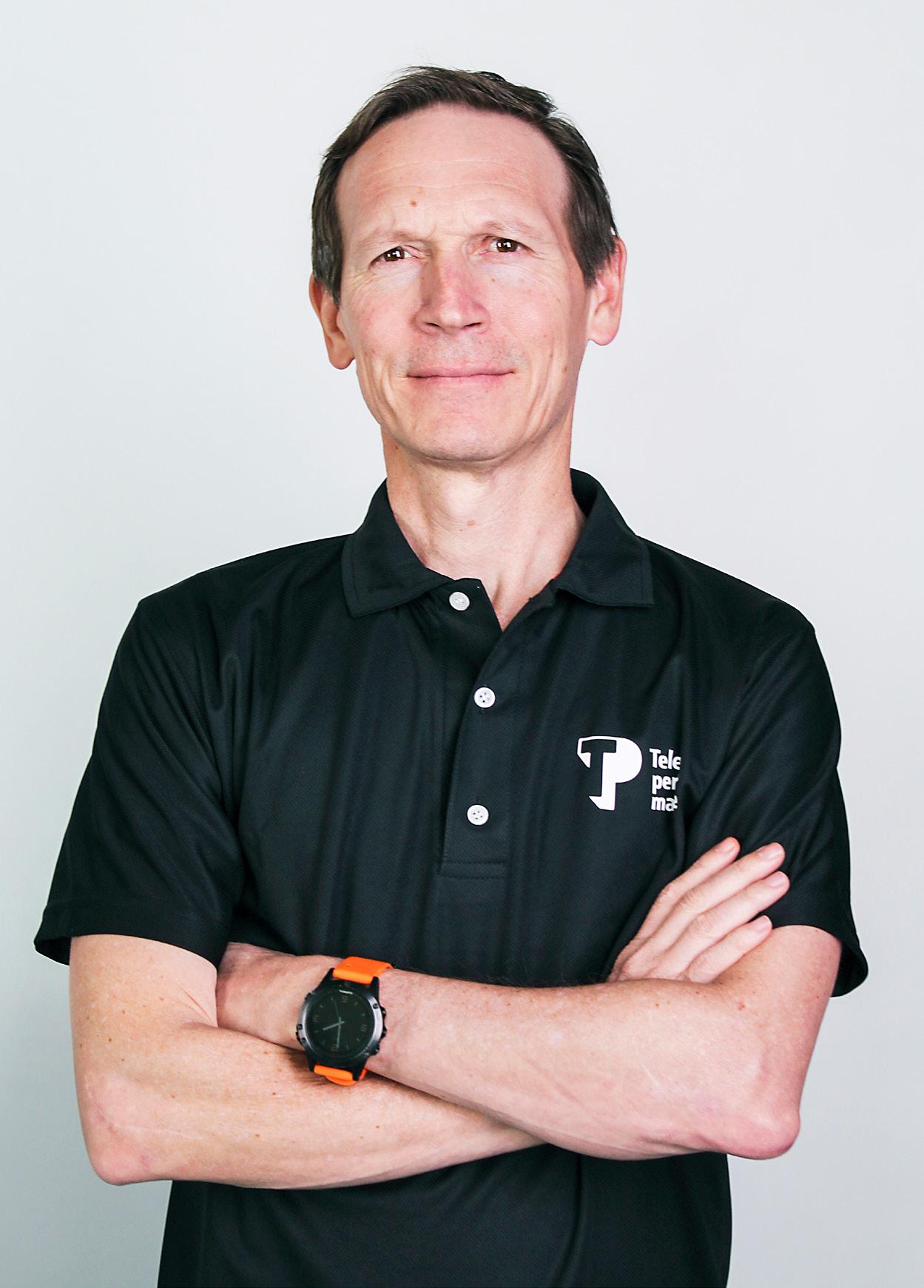
IT’S 2 A.M. ON A SUNDAY, AND THERE’S CHAOS brewing in the company. A few executives pound out emails as others shout into their phones. Leaders with competing plans raise their voices against each other. An argument erupts. This is what happens during a data breach. When user accounts are compromised and hackers have obtained email addresses, telephone numbers, birth dates, passwords, and other sensitive information, Paul Guerra is there to help bring order to the chaos. In fact, he’s one of the few people who knows how to respond to a massive cybersecurity attack. That’s because he helped write the playbook—by taking on problems that nobody else would and applying the best of what he learned through his experience.
To understand the playbook, you must know its author. Guerra didn’t set out to become one of the world’s leading cybersecurity experts. He received his formal education in mechanical engineering and mathematics from Texas Tech University. At his core, Guerra
is a problem-solver with a passion for lifelong learning. He’s also participated in executive education programs at Harvard Business School and Stanford University, is a certified Six Sigma Master Black Belt, and was recently noted as a 40 under 40 honoree.
Guerra started his career as a production manager for Hewlett Packard, where at age twenty-three he was responsible for running a multimillion-dollar production line. That wasn’t easy. But Guerra implemented tools and techniques to refine business process capabilities and drive efficiencies that drove millions of dollars to the bottom line.
Two years later, Guerra accepted a role operating a top manufacturing plant for an automotive supplier to Toyota. There was just one problem—the plant didn’t exist yet. Soon, the young project manager found himself learning basic Japanese and German so he could travel to foreign countries and blend the right people, parts, equipment, and relationships to complete his
task. Guerra organized hundreds of employees and got the $50 million site up and running without missing a single deadline.
Along the way, he discovered two guides that helped influence his thinking. The first was The Goal, Eliyahu Goldratt’s business management novel, which shows readers how to identify and remove bottlenecks and other operational constraints. The second was The Toyota Way, a respected tome that explains which factors contribute to Toyota’s culture and reputation for quality, detail, and reliability.
Guerra spent the next several years solving complex business problems for leading companies and organizations. At USAA, he was tasked with improving the cost-effectiveness of the company’s efforts in regard to quality and customer satisfaction. Guerra optimized costs and increased the ROI, accomplishments that caught the eye of IT recruiters. Guerra also noticed that the industry was placing greater value on streamlined processes, and he developed a solution that worked inside three different industry verticals.
In 2011, Guerra had a chance to apply his playbook in a new space. He joined cloud solutions provider Rackspace, where he was initially asked to uncover and implement process improvements. He was excited to face the task head-on but was quickly exposed to a new set of problems as well as cybersecurity threats. Guerra explains, “All companies are vulnerable and need a good plan to protect against bad actors.”
Guerra was able to add a new chapter to his playbook. When he started, cybersecurity was one of the top risks at Rackspace. After three years, and with assistance, funding, support from leadership, and an amazing team of cyber rock stars, he implemented the plan and helped mature the resiliency and efficacy of the cybersecurity program. Guerra had made himself into an expert by researching the problem, cultivating partners, finding solutions, and refining his playbook to address security challenges.
That’s when Guerra was called to assist with an incident that required remediation at leading web services provider Yahoo. The company had suffered a massive attack that saw three billion user accounts compromised. Guerra partnered with the senior leadership team to implement his playbook, “remediate the gaps,” and help prevent future attacks.
Paul Guerra Chief Security Officer Argo GroupGuerra says he finds success by applying his engineering background to the issue at hand. “The secret to attacking any large problem lies in perseverance,” he says. “Gather information from various sources, lay out a methodical plan, get the right tools in place, execute your plan, and identify and remove mistakes as you go forward.”
In 2019, Guerra returned to his hometown of San Antonio and joined Argo Group, a global specialty insurance company. As chief security officer, he’s running the playbook to lead another security transformation. He’s also helping the company implement a Data Protection and Physical Security program. Guerra says, “To build a robust and resilient program is a team effort. It definitely takes a village.”
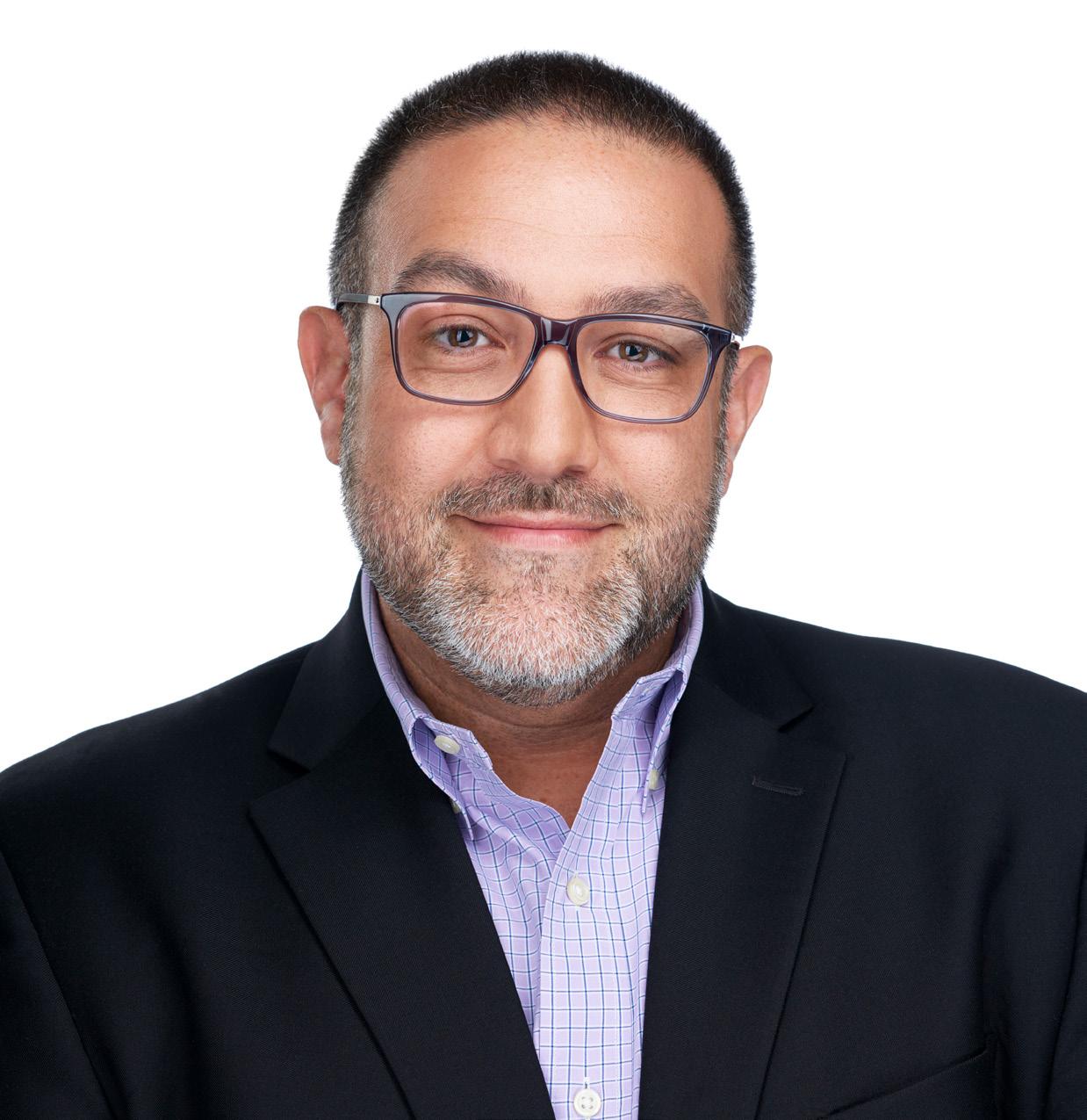
Anyone who is a lifelong learner and loves solving complex problems will always have work in cybersecurity. With more people working from home, security breaches are up 600 percent in some sectors. Industry experts say bad actors will syphon $6 trillion from companies in 2021. “Hackers are poised to do more damage than ever before, and some companies aren’t doing the basic things they need to do to protect themselves,” Guerra says.

That reality motivates him to recruit young talent. Guerra often speaks at local schools and community events, where he shares that there are 3.5 million unfilled cybersecurity jobs. As he talks about cloud computing, data privacy, machine learning, AI, and the future of STEM, Guerra also talks raises another important issue: diversity and inclusion.
“Women and minorities are underrepresented in tech, but we have a diverse team, and we are showing young people that anyone can have a bright future in this field,” he says. Guerra is working to help others embrace a passion for lifelong learning and find new solutions to evolving challenges in the complicated world of information technology and cybersecurity.
Guerra is also an angel investor focused on local-, minority-, and women-owned businesses. Women entrepreneurs only receive 2.6 percent of all investment dollars, and minorities are disproportionately underinvested in. Guerra states, “My partnerships are more about providing advice, support, and sharing some of the knowledge I have gained along the way while giving back to my community.”

















 Patrick Harr, CEO of SlashNext, frequently collaborates with Argo Group’s security leader. “Paul is a phenomenal cybersecurity leader, always proactively thinking about how to prevent attacks before they happen,” Harr says. “Paul is invaluable to our AI phishing defense innovation and the cyber community at large.”
Patrick Harr, CEO of SlashNext, frequently collaborates with Argo Group’s security leader. “Paul is a phenomenal cybersecurity leader, always proactively thinking about how to prevent attacks before they happen,” Harr says. “Paul is invaluable to our AI phishing defense innovation and the cyber community at large.”
“Hackers are poised to do more damage than ever before, and some companies aren’t doing the basic things they need to do to protect themselves.”
174 Laerte Moraes, Cargill
178 George Moreira, AT&T
180 Marina Bellini, BAT
Laerte Moraes pushes young leaders to believe in themselves, to take risks and open themselves up to new challenges—even and especially if they think they’re unprepared
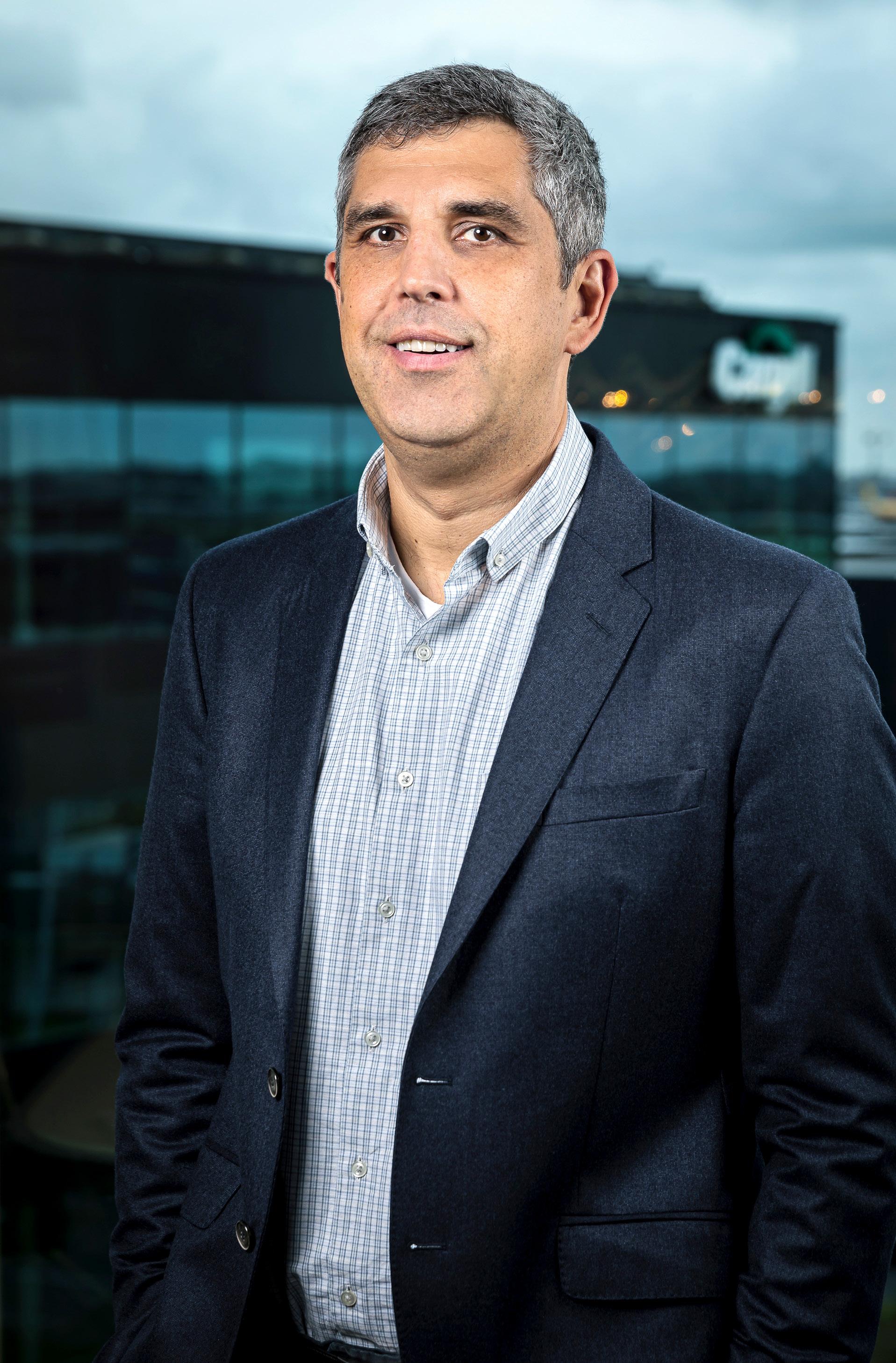
“You need to take risks because you’re never going to feel fully prepared for a new opportunity,” asserts the managing director of Cargill’s starches, sweeteners, cocoa, and chocolate businesses in South America and Brazil. “You need to be prepared to make moves that will help you develop.” Nowhere has that mentality paid off better for Moraes than at Cargill.
The managing director’s passion for empowering developing leaders at Cargill is, at least partially, founded on his own journey. The Brazil native graduated from the Universidade de São Paulo with a veterinary degree, convinced it would set him on an animal-centric path for the rest of his life. “But I just never adapted to the work,” Moraes says.
It was in people management that the young professional eventually found his passion. Moraes had the opportunity to take a production manager role for a poultry and dairy farm owned by Octávio Frias, owner of one of Brazil’s most influential newspapers and a part-time farmer. Frias was willing to lend his expertise and experience to a growing leader. “I had the opportunity to do a turnaround for a business that was not doing well,” Moraes recalls. “It gave me access to very senior people at a very young age. That’s not something that’s easy to do at a larger company, and it’s amazing how much you can learn from the experiences of people at the top of a company.”
Moraes first joined Cargill, a privately held food corporation based in Minnesota, as an animal nutritionist. Soon, however, he assumed new and expanded responsibilities. In the course of overseeing seven different production plants, with around 1,500 workers each, the managing director has interacted with countless cultures, creeds, and personalities. “It’s always interesting how different the Spanish and Portuguese heritages are reflected in people,” Moraes says of his work in South America. “It was so helpful for me to learn about the similarities, the differences, and what drives people in different regions.”
Laerte Moraes wants you to believe that you are ready for your next role. As a leader at Cargill, Moraes has too often seen people who should be enjoying a succession of new roles and responsibilities stuck in a job simply because of imposter syndrome.
According to Moraes, coming to Cargill was one of the wisest moves of his career—and now he’s working to ensure that that opportunity is extended to anyone who wants a chance to grow and evolve in their career. “We are so diverse in terms of businesses and opportunities. It’s important for me to promote young talent for positions they are sometimes not prepared for,” he says. “Part of that is learning to incentivize people, letting people do what they do best, but also provoking them to take a risk. I try to promote an environment where people feel safe to develop themselves.”
Cultivating that kind of environment relies on transparency, first and foremost. “I hate an environment where people play games and you’re always expected to read between the lines,” Moraes says. “You should be clear on the situation and the potential solutions.”
Transparency is also key to ensuring that Cargill is seeking the best and brightest from everywhere that it can, Moraes says, which means acknowledging the role of internal bias in most hiring processes. “We obviously encourage our HR teams to bring a diverse panel of candidates, no matter what,” Moraes says. “But there is a lot more to it. We push for a diverse team of interviewers to try and reduce bias.”
Bias reduction is a particular passion point for Moraes, and one that has the potential to make real and lasting change at Cargill. The company has already implemented a blind CV evaluation process, and Moraes has pushed for blind video interviews where interviewers are less prone to be gamed by unknown biases. “The world is changing so fast,” he says. “We shouldn’t be selecting people based on the skills for one job or one educational experience. These are professionals who are going to change their skills two to five times in their careers. We should be hiring agile and motivated applicants, wherever they might come from.”
Moraes places such high value on adaptability based on his personal experiences at Cargill. “My best general
manager came from operations; he was a plant engineer,” he says. “I moved him all over the place.”
Of course, prioritizing adaptability does means taking some risks when it comes to hiring, the managing director admits—but is worth it in the end. “In our society, we do not all have access to the same education or experiences,” Moraes says. “Sometimes, you have to help people navigate environments that are new for them because you believe in them.
“People come from different backgrounds where there are different ideas of professional behavior,” he continues, “and I look at it as my job to help them adapt to an environment where they can be successful while also helping them stay true to themselves.”
Cargill has committed to these principles by introducing a program called Future Generation in its Paraná plant. The program is dedicated to teaching disadvantaged youth the value of citizenship and providing on-site job skill training. “It’s important to know what your values are and how you fit into society,” Moraes says. “And it’s important for Cargill to invest in our future and make sure the next generation can be successful.”
But Moraes says that development truly starts with the individual. And that’s why he wants you—yes, you— to believe that you’re ready for your next new role.
“I look at it as my job to help [people] adapt to an environment where they can be successful while also helping them stay true to themselves.”
“GROWING UP, I ALWAYS WANTED TO BE a lawyer,” says AT&T’s George Moreira. The child of a first-generation, hard-working Portuguese immigrant family, Moreira spent his childhood surrounded by his family in a working-class town. The desire to do better for his family drove him to succeed. Now, as chief counsel for the Caribbean and Latin American region at AT&T, Moreira has seen his two wishes—to become a lawyer and succeed for the sake of his family—come true. What is more, his multicultural background gives him a unique insight into the delicate dance that international work requires.
Although neither Hispanic nor Anglo-American, his Portuguese ancestry makes Moreira fully Latin. A self-described “Portuguese gringo,” Moreira is comfortable in the dual worlds he occupies as the Caribbean and Latin American representative for a North American company. As a child, Moreira learned both English and Portuguese (the latter at home, the former at school), and his family frequently traveled to Portugal throughout his childhood.
“You’re fully American, you’re fully Portuguese, and yet you’re kind of on the outside looking in at both,” he reflects. “Being on the outside is always humbling, but it allows one to develop amazing insights and an appreciation of both worlds.”
This upbringing, along with his legal acumen, played a significant part in Moreira’s ability to secure his current role at telecommunications giant AT&T. Before he joined the company in 2007, Moreira worked as a trial lawyer at Carmody & Torrance, a large Connecticut legal firm. He handled many jury and court side trials there, and developed significant litigation experience. He then moved to the Southern New England Telephone Company, an affiliate of SBC Communications (which subsequently purchased AT&T), in New Haven, Connecticut, to bolster the company’s regulatory litigation unit, supporting carrier arbitrations as well as ongoing Telecom Act litigation.
Seven years later, AT&T had an opening in its international group for a multilingual head of counsel for Latin America. “I
fit the profile and filled a need,” Moreira says. “I had fairly unique language skills, which was particularly important to the company. There are many lawyers that are bilingual, but there are few that are trilingual in this region.”
He’s been with the company for thirteen years, providing legal support to the regulatory, HR, compliance, tax, procurement, sales, and external affairs functions throughout the Latin American region. It’s a region with complex problems, Moreira says, particularly for a North American company—chief
that’s
“You’re fully American, you’re fully Portuguese, and yet you’re kind of on the outside looking in at both.”George Moreira Chief Counsel, Caribbean & Latin American Region AT&T
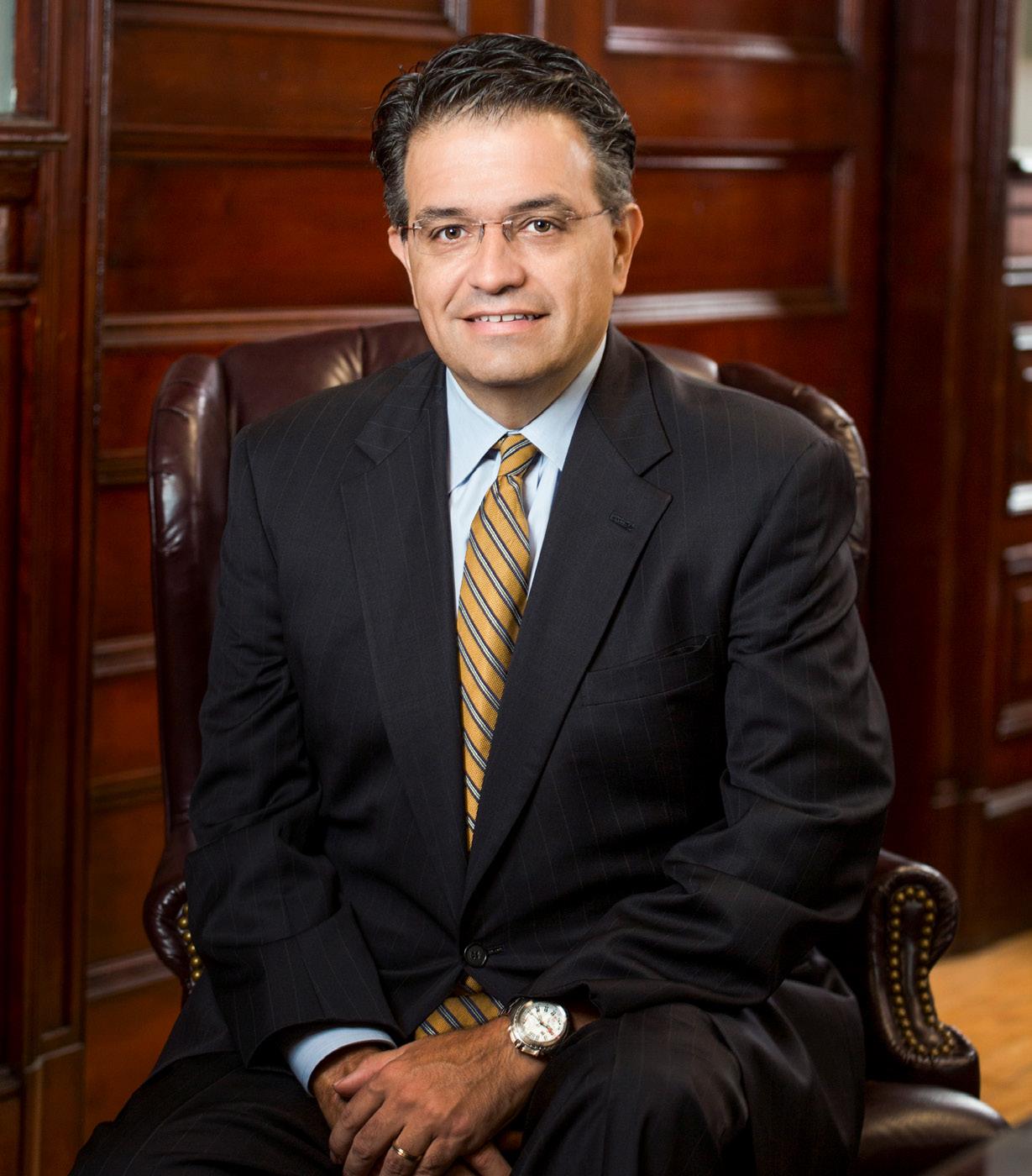
among them, interfacing with American decision-makers and local teams while reconciling the nuances and work environments between the different cultures.
“The biggest challenge is understanding the local dynamics, how things work there, and what is important to that region,” Moreira notes. In Latin America, there’s a more personal element to business work that prioritizes mutual respect and relationships, he explains, which contrasts with the more transactional nature of US corporate culture. If you do not develop relationships based on mutual respect, he says, you will accomplish little.
As someone who works and lives in both, Moreira stresses the importance of flexibility and open-mindedness when communicating the needs of two different markets. “If you don’t grasp that challenge, you will drop the ball,” he stresses.
That particular skill set comes easily to Moreira given his own easygoing nature; a natural facilitator, he often defaults to the local language of whatever group he’s speaking
with to make them feel more comfortable. “But at the same time, I like to let them know I’m of immigrant stock,” he says with a chuckle, that self-deprecating humor allowing him to stand out in the room and lighten the mood. “It opens doors, and that’s what I do.”
Moreira considers this translation work central to his role. But for him, it’s about more than simply translating the language itself— after all, anyone can Google translate. Rather, it’s about “translating the culture, the environment, and the regulatory understanding to an American corporate sensibility.”
Moreira often has to convey the specific cultural nuances of AT&T to his Latin American partners and vice versa. “There’s a whole translation process, because [local counsel] isn’t fully versed in what you do in a given country,” he explains. “You, in certain circumstances, may know the law better than they do, but they have a unique understanding regarding the field of play.”
This skill set came in handy most recently when AT&T had to work to implement data privacy measures in Brazil. The country had
just passed the Lei Geral de Proteção de Dados Pessoais, a privacy law similar to Europe’s General Data Protection Regulation, and Moreira had to bring in experts from US teams to implement automated changes to ensure that all Brazilian services complied with the new law.
This required a great deal of communication from Moreira, demanding that he translate the different policies and cultural nuances coming into play. But he relished the task: “There’s real satisfaction when you can bring specific information to a team and collaborate with them to get to a finished product.”
Moreira’s partners in the region, including Jorge D. Ortiz, a partner at Argentinian law firm Estudio Ortiz y Asociados, have great respect for Moreira’s approach to these kinds of situations. “Decisive. This is the word that best defines George when working,” Ortiz says. “He listens to all members of the team but never hesitates to make a decision without the need for unnecessary meetings and calls. And he is even able to make it look a part of a general consensus.”
Given the vital role that Moreira plays in translating AT&T’s US corporate decisions for the company’s Latin American and Caribbean partners, virtually every decision requires his input or insight. The work is occasionally invisible—Moreira likens it to being the holding midlfielder on a soccer team, who gets the work done without necessarily getting the focus—but it’s immensely rewarding nonetheless. “I’m the CEO of small decisions,” he jokes. “The decisions, may not be headline-making, but they help AT&T move the ball down the field.”
But in corporate America, even those small decisions are important for the survival and growth of the company. According to Moreira, “Some of the biggest things you can do are to bring analytical skills to the table, make decisions, and leave guideposts that allow the company to move forward.”
BAT’S DIRECTOR OF DIGITAL AND INFORMATION and Chief Information and Digital Officer Marina Bellini knew very quickly when she met with company executives that she wanted to work for the multinational organization. “It was clear this was a company undergoing huge change and had a clear and ambitious mission,” she says. “That challenge appealed to me.”
Bellini joined BAT in early 2018, during the most dynamic period of change in the company’s 118-year history. For over a century, BAT’s business focused solely on tobacco cigarettes. Today, as the company makes strides in its mission to reduce the health impact of its business, BAT’s portfolio has grown to include ecigarettes, tobacco heating products, and modern oral nicotine pouches. BAT has also set an ambitious goal to have fifty million consumers using its noncombustible products by 2030.
“We are here to build a better tomorrow,” Bellini says. “Today, we offer consumers the widest range of enjoyable and lower-risk alternative nicotine products, underpinned by world-class innovation and science.”
A seasoned technology leader, Bellini is responsible for driving BAT’s digital agenda, which plays a key role in accelerating the company’s transformational growth.
Bellini says, “My focus is applying technology and new ways of working to unlock commercial value across the entire organization and to help the business deliver results at a faster pace.”
This work has seen BAT developing a more data-centric focus and automating processes around the organization. This automation helps BAT operate faster and smarter, Bellini explains, freeing up resources and time across the organization and driving energy behind value-creation initiatives.
“Usually, companies transform slower than they want, not because they don’t believe in their transformation plans or because they are not executing them but
because you cannot free up resources,” she says. “Technology needs to be there to free up time and provide differentiated insights. Developing new product categories is a huge undertaking. We need to be really sharp with every step we take and learn quickly what is working and what isn’t to adapt at pace.”
Another reason Bellini decided to join the organization is the diverse culture found at BAT.
“At BAT, people really can be themselves and bring their best selves to work,” she says. “We are one of the most international companies in the world, operating in 180 countries and with more than 53,000 people. In our headquarters alone, we have 87 different nationalities.”
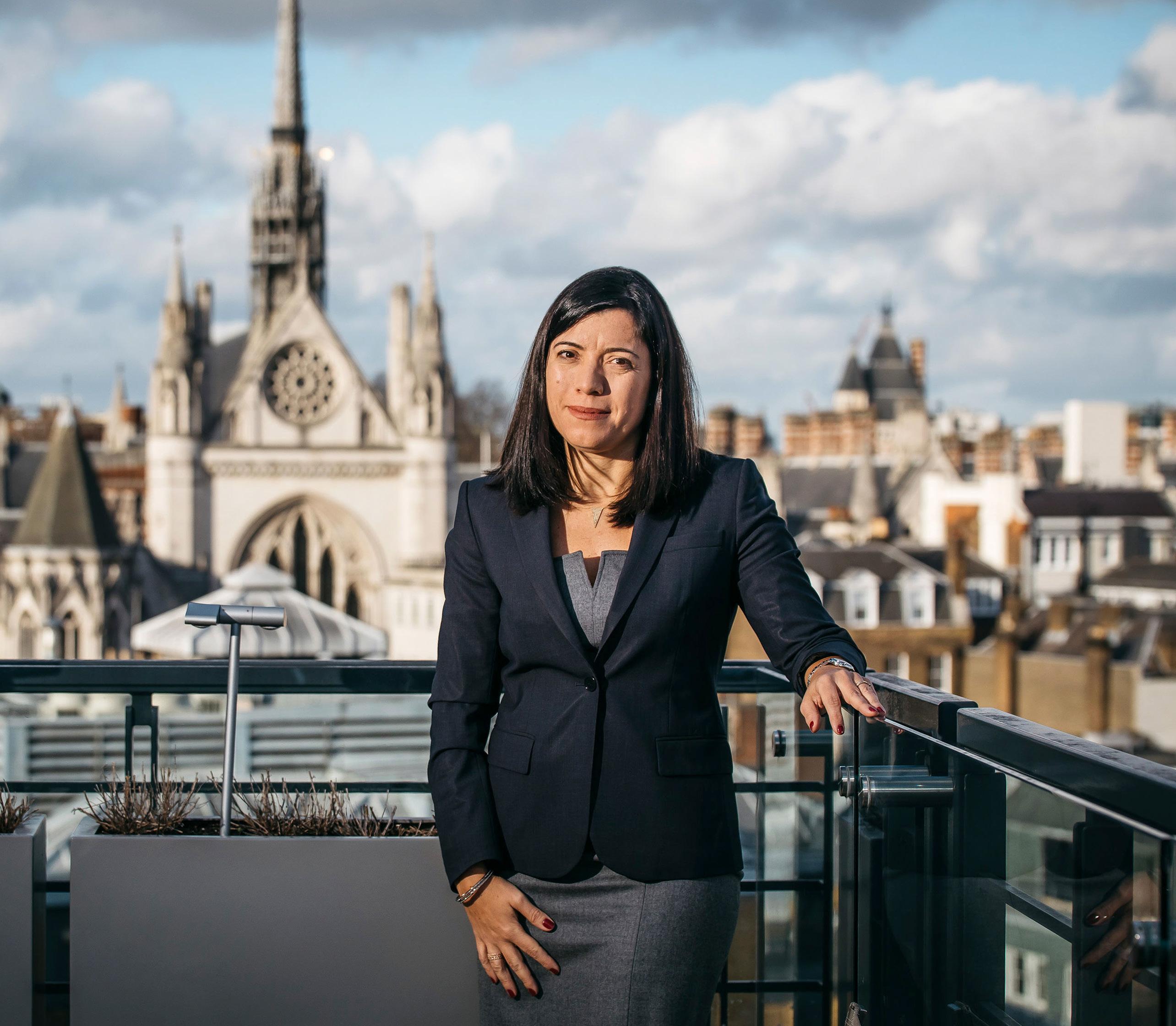 Marina Bellini Director of Digital & Information, Chief Information & Digital Officer BAT
Marina Bellini Director of Digital & Information, Chief Information & Digital Officer BAT
BAT is a leading, multi-category consumer goods business, established in 1902.






















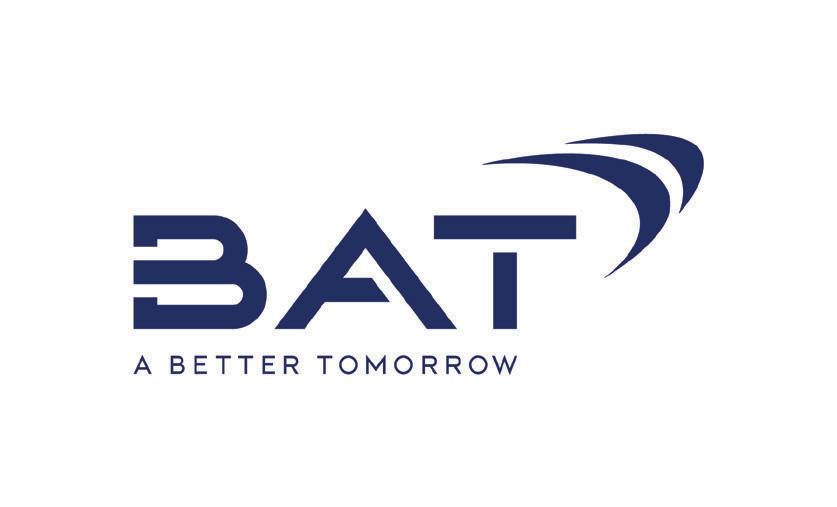
Our purpose is to build A Better Tomorrow by reducing the health impact of our business through enjoyable and less risky products for our consumers.
The company has announced a target of increasing the number of its non-combustible product consumers from 11 million to 50 million by 2030; and to achieve at least £5 billion in New Categories revenues in by 2025. To find out more, visit bat.com/purpose
www.bat.com


“Having a diverse and inclusive workforce—which is reflective of society and our consumer base—is important, as it enables us to better understand our consumers,” Bellini adds. “The diversity of our skills, cultures, thinking, and experiences is also a driving force for our innovation and how we ultimately create inspiring products that suit our consumers’ evolving needs and preferences.”
Bellini’s deep insights into what consumers want have been informed by a long career in the consumer packaged goods industry, a career that has included chief information and digital officer roles for giants such as Anheuser-Busch InBev and PepsiCo.






“My experiences in previous roles have taught me that you have to listen to the organization and to consumers in order to understand them,” Bellini explains. “As consumers, we all have our own unique preferences, attitudes, and desires. You have to connect with the things that are different, not just the commonalities.”
In her role, Bellini is also focused on driving employees’ digital literacy, which plays a crucial part in ensuring that the technology implemented at BAT is being used to it fullest.
She says, “I see my role as a technology and a cultural role. The potential of technology in a workplace is only fully realized when you have the culture and ways of working that enable it. We are investing in a digitally enabled, empowered, and connected organization, allowing us to be simpler, stronger, and faster. Driving our people’s connectivity and digital capabilities plays a crucial part in how efficient, strong, and fast we can be in our learning.
“If there’s one word that defines my role at BAT, it is ‘connectivity,’” Bellini continues. “It’s leveraging the power of technology to enhance and accelerate our connectivity with our employees, our consumers, our external partners, and all our stakeholders.”
“If there’s one word that defines my role at BAT, it is ‘connectivity.’”
There is always something new to learn about a group as diverse and complex as the Latino community. We recommend starting with these resources.

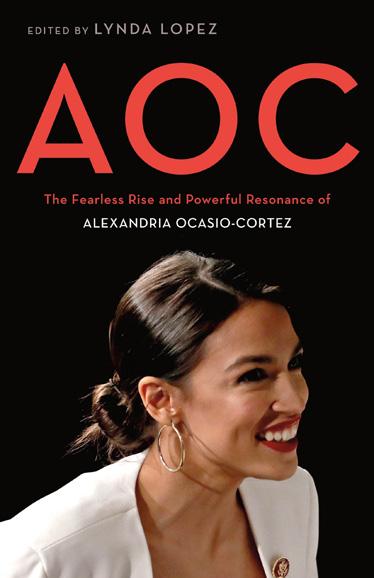
Ocasio-Cortez
Edited by Lynda LopezCurated and edited by Lynda Lopez (p.96),
AOC: The Fearless Rise and Powerful Resonance of Alexandria Ocasio-Cortez explores the personal, symbolic, and cultural importance that the groundbreaking congresswoman holds for both the nation and the world. From the tradition of Puerto Rican activism that AOC has joined to her social media savvy and Democratic Socialist ideals, this anthology of essays investigates the various meanings of a young Latina politician who has come to represent a generation.
This excerpt defines ‘Afro-Latin@’ as a term of resistance, anti-racism, and self-affirmation, tracing the historical roots of the term throughout Africa and Latin America as well as the United States.
Pew Research Center’s
This report by Gustavo López and Ana GonzalezBarrera dives into the complexities of identity that are sometimes obscured by the use of umbrella terms such as ‘Afro-Latino.’ How an individual identifies, these researchers reported, is informed not only by the multiplicity of their personal background but also by the colonial history of Latin American countries such as Mexico and Brazil.
